




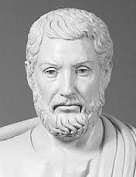








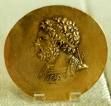
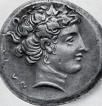




















TLW's Ancient Greecescope™ (Ancient Greece Historyscope) |
By T.L. Winslow (TLW), the Historyscoper™ |
© Copyright by T.L. Winslow. All Rights Reserved. |
Original Pub. Date: May 3, 2016. Last Update: Jan. 5, 2026. |









Westerners are not only known as history ignoramuses, but double dumbass history ignoramuses when it comes to the history of ancient Greece. Since I'm the one-and-only Historyscoper (tm), let me quickly bring you up to speed before you dive into my Master Historyscope.
About 10,000 B.C.E. the Neolithic Rev. (Transition), a transition from hunting-gathering to agriculture, incl. the cultivation of wheat begins in Mesopotamia (Fertile Crescent), diffusing N through Europe.
About 7000 B.C.E. the first modern Euros arrive in Crete from Asia Minor, bringing farming, and spreading through the Aegean islands to mainland Greece.
About 6000 B.C.E. the first European farmers are invaders from the Near East (Turkey, Iraq et al.), according to genetic studies.
About 4000 B.C.E. to 3000 B.C.E. if the Bible's Adam and Eve story is true, giant Nephilim (Heb. "those causing others to fall or fail") inhabit the Earth until Noah's Flood (Gen. Ch. 6); "Now it came about, when men began to multiply on the face of the land, and daughters were born to them, that the sons of God saw that the daughters of men were beautiful; and they took wives for themselves, whomever they chose. Then the LORD said, 'My Spirit shall not strive with man forever, for he is indeed flesh; nevertheless his days shall be one hundred and twenty years.' The Nephilim were on the Earth in those days, and also afterward, when the sons of God came in to the daughters of men, and they bore children to them. Those were the mighty men who were of old, men of renown" - the origin of the Greek gods?
About 2900 B.C.E. the Early Helladic Period of Greece begins (ends 2000 B.C.E.), with prosperity caused by the use of metals along with growth in technology, economy, and social org.
About 2000 B.C.E. the Early Helladic Period of Greece ends, and the Middle Helladic Period of Greece begins (ends -1650), characterized by a slower pace of development along with the evolution of megaron-type cist graves.

About 1900 B.C.E. the first Palace of Knossos (Cnossus) is built by the Minoans in Crete, becoming the oldest city in Europe, beginning the First Palace Period (ends -1700), which also produces the palaces of Malia (on the N coast) and Phaistos (Phaestus) in SC Crete; discovered in 1878 by Minos Kalokairinos, and excavated in 1900-35 by Sir Arthur John Evans (1851-1941).

The wild blonde dangly Greeks set up shop in the Me-Scene? About 1900 B.C.E. the city of Mycenae on the plain of Argolis in Greece (in NE Peloponnesus S of the Isthmus of Corinth, 55 mi. SW of Athens) is founded, going on to develop the Mycenaean Civlization (ends -1125), which strongly borrows from the Minoan civilization of nearby Crete by -1600, and by -1400 becomes supreme in the Aegean area, incl. the cities of Tiryns near Mycenae, Orchomenos, and Thebes in Boeotia (birthplace of Hercules), Athens in Attica, home of the Acropolis (Gr. "top of the city"), and Pylos in Messenia in SW Greece; the king is called the wanax, and the army cmdr. is called the lawagetas; the basileus and a priest class bring up the rear; Mycenaean supremacy continues until the fall of Troy (-1200), after which the Dorians (Gr. "conquerors") from the N destroy it and the survivors flee; the Gla Fortress protects the region; the architecture is based on huge rough-hewn "Cyclopean" stones, thought to be made by the Cyclops; the strongly-fortified palaces contain megara (large rectangular halls), and the warlike Mycenaeans are the first to use the safety pin; Homer later preserves the age in his "Iliad" and "Odyssey", and claims that Mycenae is the home of King Agamemnon; Heinrich Schliemann (1822-90) excavates Mycenae in 1868 C.E.
About 1800 C.E. the Minoans of Crete invent Linear A Script.
About 1700 B.C.E. a civil war begins in Crete, ending the First Palace Period, and beginning the Second Palace Period (ends -1420), featuring palaces with the earliest known controlled water pressure.
About 1650 B.C.E. the Middle Helladic Period of Greece ends, and the Late Helladic Period of Greece begins (ends -1150), characterized by the rise of Mycenaean Greece.
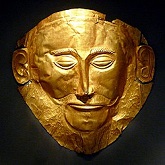
About 1600 B.C.E. the heretofore-poor pop. of mainland Greece (Mycenae), known for small villages of mud-brick houses begin building opulent tombbs in Grave Circle A filled with weapons, jewelry, golden death masks, incl. the golden Mask of Agamemnon (1500 B.C.E.), discovered by Heinrich Schliemann in 1876; not the real Agamemnon.
About 1600 B.C.E. the Minoans of Crete develop the chariot army.
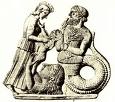
In 1555 B.C.E. the Aegeides Dynasty in Athens is founded by half-man half-fish Cecrops I (d. -1506) (Gr. "face with a tail"), who becomes king #1 of Athens, replacing elections for hereditary succession (until -1068) - who wouldn't want it that way?
In 1506 B.C.E. Cecrops I dies, and autochthonous (born from the Earth) Cranaus (d. -1497) (born from the Earth) becomes king #2 of Athens.
About 1500 B.C.E. the Achaeans begin to invade Greece in two waves, settling in the N Peloponnese; the Thracians later claim their original home in thickly-forested Pieria near Mt. Olympus, home of the cult of the Muses, which spreads S to Mt. Helicon in Boeotia, where they grow from three to nine in number, and are considered daughters of Zeus and Mnemosyne, goddess of memory.
About 1500 B.C.E. Miletus is founded by Mycenaeans from Crete as a stronghold on the W coast of Asia Minor near the mouth of the Maeander River (until -1100), becoming the first of 10 Greek colonies on the Sea of Marmara or Black Sea, and the first city with a modern grid plan (by Hippodmos), which is copied by the Romans; the Temple of Didyma, devoted to Apollo the Didymaion (twin) is built, becoming the 2nd most famous oracle in the Hellenistic world after Delphi.
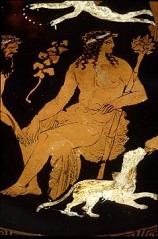
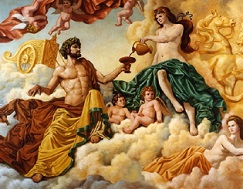
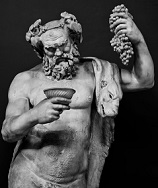
About 1500 B.C.E. the Greek wine god Dionysus begins to be worshiped by the Mycenean Greeks, later adopted by the Romans as Bacchus.
In 1497 B.C.E. Cranaus dies after fleeing to Lamptrae, and his son-in-law Amphictyon (d. -1487) becomes king #3 of Athens.
In 1487 B.C.E. Amphictyon dies, and Erichthonius (Erichtonios) (d. -1437) (Gr. "Earth-born") (don't ask how he was born?) becomes king #4 of Athens.
About 1450 B.C.E. the Mycenaeans develop Linear B writing, an early form of Greek writing. About 1420 B.C.E. the up-and-coming Iron Age Mycenaeans conquer the Bronze Age Minoans in Crete, ending the Second Palace Period (begun -1700), and taking over the Minoan trade routes, expanding by sea to the Cyclades, Rhodes, Sicily, and Italy, establishing trade with Egypt, Assyria, Babylonia, and the Hittites; they like to live in small city-kingdoms.
In 1437 B.C.E. Erichtonius dies, and his son Pandion I (d. -1397) becomes king of Athens.
About 1400 B.C.E. King Nestor of Pylos conquers Iklaina in SW Greece, eventually bringing 16 states under his rule, incl. Nichoria.
About 1400 B.C.E. the Oracle of Delphi, dedicated to Apollo is founded on the S slope of Mt. Parnassus in the Phocis district of Greece at the alleged navel of the Earth, becoming their oldest and most influential religious sanctuary; the chief priestess is called Pythia, priestess of the serpent (draco) Python, who was slain by the god Apollo.
In 1397 B.C.E. Pandion I dies, and his son Erechtheus (d. -1347) becomes king #6 of Athens.
In 1347 B.C.E. Erechtheus dies, and his son Cecrops II (d. -1307) becomes king #7 of Athens.
In 1320 B.C.E. Miletus in W Asia Minor supports an anti-Hittite rebellion of King Uhha-Ziti of nearby Arzawa, with Mursili ordering his gens. Mala-Ziti and Gulla to raid Millawanda, burning parts of it.
In 1307 B.C.E. Cecrops II dies, and his nephew (son of Erechtheus) Pandion II (d. -1282) becomes king #7 of Athens.
About 1200 B.C.E. (same time as Homer's "Iliad") the Pelasgians ("sea men"?) live in Greece, Asia Minor, and the Aegean Islands, with their name getting used by some ancient writers to refer to people that were either the ancestors of the Greeks or preceded them in Greece, "a hold-all term for any ancient, primitive and presumably indigenous people in the Greek world" (Apolloios Rhodios and Peter Green).
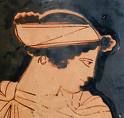

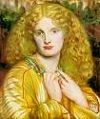



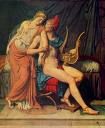
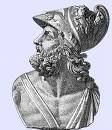

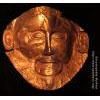
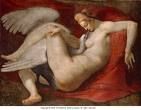




The original Hatfield-McCoy Feud? In 1194 B.C.E. the Trojan War (ends -1184) begins when Prince Paris (Alexander), son of King Priam and Queen Hecuba of Troy (Ilium) on the Hellespont (known for his prowess with a bow) goes on a diplomatic mission to Spartan king Menelaus, and falls in love with his beautiful wife Helen, then abducts her and takes her with him back to Troy (founded by Dardanus, son of the god Saturn), pissing-off Menelaus, who gets his brother King Agamemnon of Mycenae (in the NE Peloponnesus 55 mi. SW of Athens) to join him, along with loose cannon Achilles of Thessaly, son of King Peleus of the Myrmidons and the Nereid Thetis; the whole thing started when Eris, goddess of discord, pissed-off at being excluded from a marriage throws a golden apple inscribed "To the Most Beautiful" into the gathering, and Paris awards it to Aphrodite, causing her to promise Helen to him?; according to Herodotus (Bk. 1), it all started when the Phoenicians first arrived from the Red Sea (Indian Ocean), and kidnapped Io and other maidens from the top Greek island of Argos and took them to Egypt, after which more Greeks kidnapped Europa, daughter of the king of Tyre, then Greek Jason and the Argonauts got the same idea and did ditto to Medea, daughter of the king of Colchis, causing Priam to think that he had a right to get a wife by kidnap, and when the Greeks actually made him pay for it for once, it pissed off the Persians, who claimed to own all peoples in Asia Minor, causing them to become the enemies of the Greeks; actually a ton of Greek bucks had courted Helen before her marriage, and all had been made to promise Menelaus to defend her in advance?; the Greeks then launch a fleet of 1K ships and 50K men at Troy, which itself has no navy but has an impregnable fortress city, and the classic confrontation of irresistible force and immovable object is on; no ordinary Bronze Age Greek supermodel, Helen (Gr. "torch", or "selene" = Moon?) of Troy, "the face that launched a thousand ships" is the daughter of Zeus (in the form of a swan) and Spartan queen Leda (daughter of King Thestius of Aetolia), who on the same night was also impregnated by Spartan king Tyndareus (two fertilized eggs at the same time), producing her twin siblings Castor and Pollux (Kastor and Polydeuces) (mortals) and (from her first egg) Helen and Clytemnestra, whom Agamemnon married after killing her first hubby Tantalus in order to become king of Mycenae, after Clytemnestra bears him Orestes (Gr. "mountaineer"), Iphigenia (Iphigeneia) (Gr. "strong-born"), Electra, and Chrysothemis, then after he sacrifices Iphigenia to make the winds return so his fleet can sail to Troy, she waits till he gets back from Troy with Trojan princess Cassandra, pissing her off more, and murders them both so that her new beau Aegisthus (Gr. "goat strength") can become king, after which Orestes and Electra of the now doomed House of Atreus murder them both
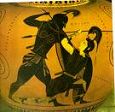


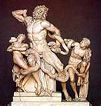

On June 11, 1184 B.C.E. the impregnable walled city of Troy (Ilium) in Asia Minor near the Hellespont (Dardanelles) is destroyed by fire in the last year of the 10-year Trojan War after the first special ops commando raid in history, made possible by the original 1-trick pony Trojan Horse (the original Kobayashi Maru Maneuver?), which Trojan priest Laocoon (Laocoön) tries in vain to expose by tapping with a spear, causing the goddess Athena to send sea serpents to strangle him and his sons Agesander, Athenodoros, and Polyclitus, which the Trojans interpret as proof that the horse is sacred; the doings in the 10th year are later celebrated by Homer's Iliad; the U.S. 10th Special Forces Group (Green Berets) later features a silver Trojan Horse on their badge; a band of survivors led by Aeneas (son of Aphrodite or Venus and Anchises, a cousin of King Priam) escape and search for a new home, ending up in Rome (Latium), where King Latinus (son of Inachus, son of Dardanus, son of Saturn) allows them to stay, and reneges on a promise to King Turnus of the Rutuli, marrying his daughter Lavinia to Aeneas instead, causing Turnus to turn-turn-turn declare war on Aeneas, which he loses, getting killed, after which Aeneas' Troy-born son (via 1st wife Creusa, who dies before reaching Latium) Ascanius founds Alba Longa SE of Rome on Lake Albanus in the Alban Hills (ends 7th cent. B.C.E.), and becomes its first king, establishing the line that leads to Romulus and Remus; Homer's Odyssey contains one of the earliest historical references to Crete, claiming that it's populated by Achaeans, Cydonians, Pelasgians, Dorians, and Eteocretans (pre-Hellenic natives), and has 90 independent cities, with #1 being Cnossos; shortly after the Trojan War ends, the city of Tenea is founded 15 km SE of Corinth and 20 km NE of Mycenae by Trojan POWs with the permission of Agamemnon.
On Apr. 16, 1178 B.C.E. Odysseus returns to Ithaca at noon and wins an archery contest?

About 1150 B.C.E. the Greek Dark Ages (Geometric or Homeric Age) begin (end -800 to -750) as the Hellenic Dorians invade and settle mainland Greece and Sparta, and begin calling it Hellas (Gr. "Land of the Hellenes"); Sparta is later populated by Byzantine-era Romans, who interbreed and become the Deep Maniots. the Aeolians (originally from Thessaly, one of the four major Greek Tribes along with the Dorians, Ionians, and Achaeans, claiming descent from King Aeolus of Thessaly, son of Helen, ancestor of the Hellenes, and father of Sisyphus) settle on the W coast of Asia Minor between the Dardanelles and the Hermus River, and on the island of Lesbos; by modern times the Aeolian dialect is considered the oldest form of Hellenic speech; the Thessalians (first and best Greek horsemen) claim that Poseidon made their fertile plain habitable by creating an outlet for the Peneius River for the first monarchs Deucalion (Deukalion) and his wife Pyrrha (daughter of Epimetheus and Pandora); Greek historian Diodorus of Sicily (Diodorus Siculus) (-90 to -21), later claims that the first Thessalian colonists came from Egypt, which connects with their myth that Poseidon created the horse; about this time Mycenaean civilization ends, and Greek history grows dark until the first Olympics in -776, causing David Michael Rohl (1950-) et al. to propose shifting all dates forward by 200-350 years - meet the new stars of High School Musical III?
About 1100 B.C.E. the Doric (Dorian) Hexapolis, a federation of six Doric cities in SW Asia Minor on adjacent islands is founded (until -560), incl. Cos on the island of Cos, Cnidus (Knidos) in Caria, Halicarnassus in Caria (modern-day Bodrum, Turkey) on the Ceramic Gulf, Lindus on the E coast of the island of Rhodes (known for wine and figs), Ialysus (Ialysos) on the island of Rhodes 6 stadia SW of the city of Rhodes, and Camirus (Kamiros) (Cameirus) (Kameiros) on the NW coast of the island of Rhodes; they all celebrate a festival and games on the Triopian Promontory near Cnidus in honor of Apollo, with winners awarded brazen tripods that they have to dedicate to Apollo's temple; too bad, a winner from Halicarnuss takes the tripod to his own house first, causing Halicarnassus to be kicked out of the Doric Hexapolis, reducing it to the Doric Pentapolis.
About 1000 B.C.E. the Ionians under Neileus capture Miletus on the W coast of Asia Minor, then kill the men and marry their wives, who get pissed-off and refuse to sit at table with them?
About 1000 B.C.E. the Celts in France and Germany enjoy a dark, cloudy, tasty fermented beer made with dark toasted malt; the Romans consider them barbarians and look down on them for not drinking wine, claiming that they use their big beards to strain their beer; meanwhile the Greeks learn beermaking from the Egyptians, teaching it to the Romans, who call beer cerevisia, from Ceres (goddess of agriculture) and vis (stength).
About 1000 B.C.E. the city of Pavlopetri (Gr. "Paul's Stone", "Paul's and Peter's") S of the Peloponnese, first inhabited about 2,800 B.C.E. is consumed by the sea after the first of three earthquakes.
About 1000 B.C.E. the Semitic seafaring Phoenicians invent the Phoenician (Proto-Canaanite) Alphabet, attributing it to the legendary figure Cadmus (Kadmos) ("from the east") from Tyre, who founds the acropolis-citadel of Cadmea AKA Thebes (modern-day pop. 22K), known for the story of the Spartoi ("sown men"), and the Seven-Gated Wall built by Amphion, along with the story of Laius, who butt-fucks Chrysippus, making Thebes famous for pederasty, and the story of Oedipus and the Seven Against Thebes, along with the exploits of Heracles (Hercules) (son of Zeus and Alcmene), the immolation of Semele, and the advent of Dionysus.
In the 10th cent. B.C.E. the Greek colony at Smyrna (modern-day Izmir) in SW Asia Minor is founded, later claiming to be the birthplace of Homer; it is located at the terminus of the inland trade routes from the Hermus (Gediz) and Meander valleys from the east.
In 952 B.C.E. Thersippos dies, and Phorbas (d. -921) becomes king of Athens.
In 930 B.C.E. Eurysthenes dies, and his son Agis I (d. -900) becomes Agiad king #2 Sparta.
About 900 B.C.E. the Iron Age Cold Epoch (Neoglaciation) (Climate Pessimum) begins, unusually cold climate in the North Atlantic, peaking during the expansion of Greece era about 450 B.C.E.
In 900 B.C.E. Agis I dies, and Echestratus (d. -870) becomes Agiad king #3 of Sparta.
About 900 B.C.E. Ancient Greek Architecture begins (ends 100 C.E.), becoming known for its temples, open-air theaters (starting -525), public squares (agoras), storied colonnades (stoas), processional gateways (propylons), town council bldgs. (buleuterions), public monuments, monumental tombs (mausoleums), and stadiums; architectural styles are divided into the Doric Order, the Ionic Order, and the Corinthian Order; ancient Rome later shamelessly steals from them.
In 895 B.C.E. Spartan king Soos dies, and Eurypon (Eurytion) (d. -865) becomes king #3 of Sparta, founding the Eurypontid Dynasty.
In 870 B.C.E. Echestratus dies, and his son Labotas (Leobotes) (d. -840) becomes Agiad king #4 of Sparta, launching a war against the Argives.
In 865 B.C.E. Eurypon dies, and Prytanis (d. -835) becomes Eurypontid king #2 of Sparta.
In 840 B.C.E. Labotas dies, and his son Doryssus (Dorissus) (Doriagus) (d. -815) becomes Agiad king #5 of Sparta.
In 835 B.C.E. Prytanis dies, and Polydectes (d. -805) becomes Europontid king #3 of Sparta.
In 820 B.C.E. Doryssus is KIA in a battle with the Argives, and his son Agesilaus I (d. -785) becomes Agiad king #6 of Sparta.
In 805 B.C.E. Polydectes dies, and Eunomus (d. -775) becomes Eurypontid king #4 of Sparta.
In the late 9th cent. B.C.E. the Greeks adopt the Phoenician alphabet after it is brought by Phoenician traders, and the Classical Period of the Greek Language begins, bringing the Attic dialect to the fore (ends -330) - At-ti-ca, At-ti-ca, At-ti-ca?

In 800 B.C.E. the Axial (Axis) Age of Karl Jaspers (1883-1969) begins (ends -200), when "the great world traditions that have continued to nourish humanity came into being: Confucianism and Daoism in China; Hinduism and Buddhism in India; monotheism in Israel; and philosophical rationalism in Greece", and where "What mattered was not what you believed but how you behaved", and the concept of kenosis (Greek for emptying), "spirituality of self-surrender" is the goal.
About 800 B.C.E. Karanos (Caranus), brother of King Pheidon of Argos becomes king #1 of Macedon (Macedonia), home of 9,570 ft. Mt. Olympus on the S border just N of Thessaly (which the Titans piled Mt. Pelion and Mt. Ossa on in a futile attempt to reach heaven).
By the 8th cent. B.C.E. the Greek city-state (polis) system emerges, with the main cities being Athens (in Attica) (which imports grain from the Black Sea region), Chalcis (Chalkis) (in Euboea) (known for its metalwork), Eretria (in Euboea) (known for its coinage), Miletus (on the W coast of Asia Minor) and Samos (an island in the E Aegean Sea) (both known for furniture and textiles), Corinth (in Corinthus 48 mi. W of Athens), and landlocked Sicyon (Sikyon) (Sekyon) in Argolis W of the city of Corinth, between the Nemean and Sythas Rivers, and home of Lake Lerna and the multi-headed hydra?); commerce is mainly by sea; the Delphic Oracle is rededicated, becoming the #1 site for the worship of Apollo; the Greek Archaic Period in Art begins (ends -510) (-750 to -480?), switching from abstract geometric patterns to a more naturalistic style; the men marry at age 30 and women at 15-16, becoming breed mares and slaves, living in seclusion, except for Spartan women, who receive physical training with men (you can have it if you kick my ass first?); Mt. Pentelicus and Mt. Paros produce marble, Mt. Laurium and Mt. Pangaeus produce silver, Mt. Pangaeus and Thasos produce gold; Laconia produces iron, and Cyprus produces copper, causing the Romans to name copper after it (cyprium) - you own it, we tote it? By this time Soccaly, er, Sicily (shaped like a deflated soccer ball and placed at the toe of the boot of Italy for easy kicking?) is inhabited by Sicans, Sicels (Sikels), Elymi (Elymians), as well as Phoenician colonists; S Italy is inhabited by Sicels, Messapii (SE heel) and the Dacian Apuli (Salentini) (Sallentini) (Calabri), who found the fortress city of Apulon (Apulum) near modern-day Alba Iulia, Romania - it's theirs to lose?
By the 8th cent. B.C.E. Soccaly, er, Sicily (shaped like a deflated soccer ball and placed at the toe of the boot of Italy for easy kicking?) is inhabited by Sicans, Sicels (Sikels), Elymi (Elymians), as well as Phoenician colonists; S Italy is inhabited by Sicels, Messapii (SE heel) and the Dacian Apuli (Salentini) (Sallentini) (Calabri), who found the fortress city of Apulon (Apulum) near modern-day Alba Iulia, Romania - it's theirs to lose?
In the 8th cent. B.C.E. the city of Sparta (originally Lacedaemon, after King Lacedamon of Laconia, son of Zeus and nymph Taygete, husband of Sparta, daughter of Eurotas, and father of Amyclas, Eurydice, and Asine), capital city of Laconia in the SE Peloponnesus (Land of Pelops) (Gr. "dark face") (Morea) ("mulberry") in the Eurotas River Valley is founded by Dorians via the merger of 4-5 Laconian villages; the Spartan Dyarchy allegedly begins when King Aristodemus dies, leaving twin sons Eurysthenes and Procles, who found the two jointly-reigning royal dynasties of the Agiads (ends -215) and the Eurypontids (ends -192?); the original inhabitants are enslaved, becoming the Helots.
In the 8th cent. B.C.E. the Greek kingdom of Lydia (ends -547) in W Asia Minor between the Ionian cities of the W coast and Phrygia, with capital at Sardis (Sardes) on the N base of Mt. Timolus on the gold-bearing Pactolus River 2.5 mi. S of the Hermus River (5 mi. NE of Smyrna) is founded by Lydus (son of Atys), worshiping the gods Santas, Baki (Bacchus) et al.
In 785 B.C.E. Agesilaus I dies, and his son Archelaus (d. -760) becomes Agiad king #7 of Sparta, hooking up with Charilaus to conquer Elis, as well as the city of Aegys, selling the pop. into slavery.

In 776 B.C.E. after Roman god Heracles (Hercules) allegedly founds them way back when, the first known dangly (nude) Olympic Games (Olympiad) are held in the sacred precinct of Altis (sacred grove of Zeus) in Olympia, Greece in the Olympia Valley in the W Peloponnesus in Greece at the confluence of the Alpheios and Kladios Rivers, according to the calculations of Hippias of Elis (-460 to -399); the only competition is a 200-yard dangly foot race called the Stadion (Stade), which is won by cook Koroibos (Coroebus) of Elis, who receives an olive branch; the Stadion is the only event in -776 to -724; the Greeks begin counting time from this year, starting on the first new moon following the summer solstice; the games are held every 4 years for 1,200 years (until 394 C.E.), for which the warring city-states call a 1-mo. truce, and safe passage is guaranteed for competitors and spectators; eventually four sites are used in a 4-year cycle, with year one being the Olympian Games, year two the Isthmian Games (Isthmia) on the Isthmus of Corinth (in honor of Poseidon) (founded -581), and the Nemean Games in Nemea 100 mi. W of Athens (in honor of Zeus) (founded in the 6th cent. B.C.E.), and year three the Nemean Games and the Pythian (Delphic) Games in Delphi (in honor of Apollo) (founded in the 6th cent. B.C.E.).
In 775 B.C.E. Eunomus dies, and Charillus (Charilaus) (Harilaos) (d. -750), ward, nephew, and student of reformer Lycurgus becomes Eurypontid king #5 of Sparta, invading Argolis and stirring up animosity against Tegea.
In 760 B.C.E. Archelaus dies, and his son Teleclus (Teleklos) (d. -740) becomes Agiad king #8 of Sparta, going on to subdue the towns of Amyclae, Pharis, and Geranthrae.
In 757 B.C.E. the coastal town of Cumae in Campagnia in S Italy (NW of Neapolis or Naples) is founded in Oscan territory by Greek colonists from Pithecusae, Chalcis and Eretria, and Cyme, becoming the first colony in Magna Graecia (Greater Greece); Lake Avernus nearby is the fabled entrance to the underworld, and near the shore are caves which become the seat of an acropolis which is the seat of the ageless Cumaean Sibyl (Gr. "prophetess"), who gives out golden boughs to those wishing to go to the underworld; "The Sibyl, with frenzied mouth uttering things not to be laughed at, unadorned and unperfumed, yet reaches to a thousand years with her voice by aid of the god" (Heraclitus).
-756 The Sixth Olympiad; the Delphic Oracle is consulted as to how to crown the victors, and their reply is "Do not make the fruit of the apple tree the prize of victory, but take the wild olive", causing the winner of the foot race to be crowned with an olive branch. The city of Trabezon (originally Trapezous) (Gr. "trapeza" = table") (modern-day Trabzon, pop. 768K) on the SE shore of the Black Sea is founded by Milesian traders as a trading colony along with Sinope (modern-day Sinop, pop. 36K) on the C shore, Cyzicus on the SW shore, and Abydos in the Hellespont, trading with the Greek Mossynoeci (Gr. "Mossynoikoi" = dwellers in wooden towers); in 258 C.E. the Goths sack and rebuild Trabezon.

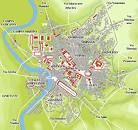
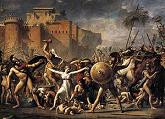
Every people has a founding myth, a frame for their identity, which lets them restart the calendar with year one, and contains within itself the seeds of their ultimate destruction? The Romans claim to come from Long and White, and must be bragging? On Apr. 21, 753 B.C.E. the city of Rome (Roma) is traditionally founded by twins (fraternal or identical?) Romulus (-771 to -717) and Remus (-771 to -753), born in nearby Alba Longa (on the W crater rim of Lake Albano) of the god Mars and mother Rhea (Rea) Silvia, a vestal virgin who is the daughter of King Numitor of Alba Longa, and a descendant of Aeneas (Gr. "he who is praised") (the very title later adopted by Muhammad?), leader of the Trojans and son of Anchises and Venus, who escapes from Troy and wanders for years before coming to Latium, and whose son Ascanius or Iulus is the founder and 1st king of Alba Longa, keeper of the Palladium or image of Pallas Athena stolen from Troy by Ulysses and Diomedes, which ends up in the Roman temple of Vesta; at birth they are kidnapped by order of the jealous Numitor, then deposited on the banks of the Tiber (in a basket like Moses?) to die, but rescued and raised by a she-wolf (sucking wolf tit and drinking wolf milk, to make them into predators?), who suckles them in the Lupercale, a cave on the NW slope of the Palatine Hill (uncovered in 2007 C.E.); they are later raised by a shepherd and his wife, until they grow up and return to kill the king, then recruit Latin colonists from Alba Longa for their new digs, originally called Saturnia after Saturn, "father of the gods", then Rome, City of the Seven Hills, home of the united cities of Latium (named after the god Lateinos (Chaldean "to lie hidden"), their version of Saturn, offspring of the Sun, represented with a ring or halo around his head, and known as the Hidden God, the God of Mystery, with both Saturn and Lateinos having the Number of the Beast (666), hence the pope also?), on the left (E) bank of the Tiber River 17 mi. inland from the Tyrrhenian Sea near malarial swamps where the river makes two sharp bends in a reverse S-shape; the Seven Hills are (Poor Queer, er, Queen Vicky Eats Crow At Christmas?): Palatine (C) (140 ft. above the Tiber E of the S bend) (home of the aristocrats) (first to be settled); Quirinal (N) (named after Sabine war god Quirinus); Viminal (NE); Esquiline (E); Capitoline (W); Aventine (SW) (home of the plebs or plebeians, consisting of two small peaks and a gully); Caelian (SE); later the Pincian Hill (N of the Quirinal) and the Janiculum Hill (on the right bank of the Tiber opposite the N bend) are inhabited with overflow pop.; the area between the Capitoline and Palatine Hills is a marshy valley, which is drained by -500 and turned into a marketplace (the Forum); actually, the legendary founding is moose hockey, and communities existed on the Palatine, Capitoline, and Esquiline Hills by -1000, and the city was really formed by the Etruscans after they conquered Latium around -600 and forced the independent communities under their yoke?; the Circus Maximus is later built between the Palatine and Aventine Hills (with the cheap seats on the Aventine side?); the Tarpeian Rock is on the S side of the Capitoline Hill, and used for executing traitors by throwing them off the top; the Campus Martius (Lat. "Mars Field") parade ground W of the Quirinal and Capitoline Hills, E of the N bend of the Tiber River is the first expansion area for overflow pop. before bridges are built across the Tiber and a fort built on the Janiculum Hill for future expansion; the city is open for 1K years until the Aurelian Wall is built c. 270 C.E., encircling all the hills and connecting with the Tiber to the N and S; Romans begin counting time up from this date, or rather, counting down from this date, after Romulus and Remus attempt to conjure a vision from the gods, and Romulus conjures twelve fowls circling over the hills, while Remus is short-changed, only conjures six and fouls out, and the augur Vettius proclaims that Romulus will be king, after which Romulus marks the square sacred boundary of Rome on the Palatine Hill above the E shore of the River Tiber, known as the Roma Quadrata with the sacred bronze plow on the feast day (Parilia or Palilia) (Apr. 21) of the herd-flock god Pales (the hermaphrodite ass-god of ancient Caanan, for whom Palestine is named, as well as the Palatine Hill), then orders a ditch dug and sacred wall (pomerium) built around it, which jealous Remus jumps over, causing Romulus to kill him for sacrilege, becoming Rome's first king (which is why it's called Rome instead of Reme?); Vettius claims that the vision means that the fowls are eagles, indicating that Rome will kick everybody's butt and the city will thrive for 12 cents., but then the eagles will turn into vultures, indicating that Rome will fall and the inhabitants will become bird food (proof that paganism is true, or just a self-fulfilling prophecy, or a deep psychological meaning about killing one's good side so the bad side can run riot, becoming fatal in the end?) (if only he'd said twelve millennia?); when Jesus Christ is later portrayed as entering Jerusalem triumphantly on an ass, you figure it out?; speaking of bad side, Romulus rules for 37 years, waging war with the Sabines under Titus Tatius (d. -748) of Cures (on the left bank of the Tiber River 26 mi. from Rome), starting it by arranging for the mass-kidnapping and Rape of the Sabine Women in C Italy, which causes Tatius to capture Rome with help from Tarpeia, daughter of the cmdr. of the Roman citadel, who opens the gates on the promise that she will receive what the Sabines have on their left arms, whch turns out to be their shields, after which they throw her from the Tarpeian Rock (which becomes the mode of execution of all capital punishment), after which the Sabine women (led by Romulus' wife Hersilia, daughter of Tatius) convince Tatius and Romulus to reconcile and rule Rome jointly, with the combined community called the Quirites; in modern times the historicity of Romulus is questioned, with German historian Theodor Mommsen uttering the soundbyte in 1854: "The founding of a city in the strict sense, such as the legend assumes, is of course to be reckoned altogether out of the question: Rome was not built in a day"; in 1900 Giacomo Boni (1859-1925) claims to find the tomb of Romulus; in 2007 U. of Rome prof. Count Andrea Carandini (1937-) uncovers evidence of the sacred wall plus Romulus' palace?; the next six kings are Numa Pompilius (-715 to -676), Tullus Hostilius (-673 to -641), Ancus Marcius (-640 to -617), Lucius Tarquinius Priscus (-616 to -578), Servius Tullius (-578 to -534), and Lucius Tarquinius Superbus (-534 to -510), the last three being Etruscans; the govt. is based on three tribes, the Ramnes, Tities, and Luceres (Latins, Sabines, and Etruscans?), with the pop. split into the patricians (large landowners) and the plebs (plebeians) (clines) (Lat. "fillers") (small landowners); only the patricians constitute the populus (citizens), and have political rights and can serve in the army; the govt. is run by elective king and a small royal council of elders (senate), plus a 100-man assembly of elders (patres) composed of 10 curiae (assemblies) for each tribe, each elder serving for for life and having to be a patrician; the rex leads the army in person, and is preceded by lictors (officers), who bear the fasces, the symbols of power and punishment, and is the supreme judge in all civil and criminal suits; Roman citizenship requires membership in a gens (Lat. "to beget"), i.e., a clan traceable through the male line to a common free ancestor without any slaves in the middle; at first only patricians can use the "gentile" name as the middle of their three names, but later the plebes are permitted; Romulus later worships in the small temple of Jupiter Feretrius ("Jupiter who carries away the spoils of war") on the Capitoline Hill; the crude round hut called the House of Romulus on the central Palatine Hill stands for the next eight cents. - when do they install the mechanical bulls?
About 750 B.C.E. the Greek Dark Ages (begun -1150) end, and the Greek Archaic Period begins (ends -480); having lost their knowledge of the surrounding seas, the Ionian Greeks begin exploring and colonizing Asia Minor and founding cities in Pontus (isolated rocky S coast of the Black Sea); by -650 abstract geometric patterning is replaced by naturalistic art, incl. nude dangly Kouroi (Gr. "male youth") statues.
In 743 B.C.E. the First Messenian War between Sparta and Messenia (W of Laconia) begins (ends -724), with the Achaeans of Messenia and Dorians of Sparta fighting it out to the bitter end.
In 740 B.C.E. Teleclus is KIA by the Messenians in the temple of Artemis Limnatis on the border after he brings some young men dressed as maidens to their festival to murder the Messenian nobles, and they figure it out; his son Alacamenes (Alcmenes) (Alkamenos) (d. -700) becomes Agiad king #9 of Sparta, going on to conquer Helos near the mouth of the Eurotas River, last independent town of the original Achaean pop. (origin of the term "Helot"), and lead the night expedition against Ampheia that started the First Messenian War.
In 734 B.C.E. the city-state of Syracuse in SE Sicily is founded by the Bacchiadae clan oligarchy of the Corinthian (Anatolian) Greeks led by Archias, going on to become the #1 city in Sicily; they found another colony on the island of Korkyra (Corcyra) (modern-day Corfu) in NW Greece.
In 729 B.C.E. Leontini (Lentini) (Leontinoi) in SE Sicily is founded as a Naxian colony by Thucles; other Naxians under Evarchus found Catana.
In 724 B.C.E. Sparta defeats Messenia, ending the First Messenian War (begun -743), and divides it into allotments (klaroi) that pay rent to finance their army, with Messenian depopulated by the emigration of Achaeans to other states, and the remaining Messenians reduced to serfs (helots).
About 710 B.C.E, the Lelantine War by Chalcis, supported by Corinth, Samos, and Thessaly against Eretria, supported by Aegina, Miletus, and Megara is fought over the rich Lelantine Plains (Lelantian Fields) in E Attica, and Chalcis and its allies are victorious (ends -650) - now get out there and plant?
About 710 B.C.E. Chalcis colonizes Torone in the Chalcidice in NE Greece, and goes on to found 30 small colonies on the peninsula.
In 708 B.C.E. Croton (Crotona) in S Italy in the sole of Italy's boot on the E coast of Bruttium (Calabria) on the Gulf of Taranto is founded as a Greek colony, becoming the leading city of Magna Graecia, known for its healthy climate and great athletes, later building the Temple of Hera Lacinia, which becomes the main religious shrine of Magna Graecia; by modern times it is reduced to a single column.
In 706 B.C.E. Tarentum (Taras) (modern-day Taranto in S Italy) is founded by Parthenian (children of Greek women and Spartan men) colonists led by Phalanthus, becoming Sparta's only colony?
In 703 B.C.E. Leokrates dies, and Apsandros (d. -693) becomes king of Athens.
In 700 B.C.E. Perdikkas (Perdiccas) I (d. -652) becomes king of Macedonia (until -678).
In 700 B.C.E. Alacamenes dies, and Polydorus (Polydorus) (d. -665) becomes Agiad king #10 of Sparta, hooking up with co-king Theopompus to change the constitution so that the kings and the Gerousia (council of elders) can veto decisions of the Apella (male citizen body); during the First Messenian War he is in charge of the left flank, while Theopompus is in command of the right flank.

About 700 B.C.E. Greek poet Homer (b. -750) dies in Chios, leaving The Iliad (24 vols.), about the 10-year Trojan War; "Sing, O goddess, the anger of Achilles, son of Peleus, that brought countless ills upon the Achaeans. Many a brave soul did it send hurrying down to Hades, and many a hero did it yield a prey to dogs and vultures, for so were the counsels of Jove fulfilled from the day on which the son of Atreus, king of men, and great Achilles, first fell out with one another" (opening); also leaves The Odyssey (24 vols.), about king Odysseus (Ulysses) of Ithaca (an island off the W coast of Greece S of Kythera), and his 10-year journey home in the face of the wrath of Poseidon for blinding his son, the cyclops Polyphemus, receiving the help of the goddess Athena, while his wife Penelope (Gr. "with a web over her face", "striped duck") fends off a host of arrogant suitors who eat her out of house and home by spinning a cloak during the day and having it taken apart at night, and their son Telemachus searches for his father then helps him outsmart and murder the suitors; the Odyssey was written or completed by Homer's son Homer II?; the Great Wanderings of Ulysses incl. the Kikonians, the Lotus Eaters, the Cyclopes, Aiolia, Isle of Aiolos, mortal king who keeps the winds in a bag, the Laistrygones, land of a giant cannibal people, the Isle of Circe, the Land of the Dead, the Sirens, the crashing rocks Scylla and Charybdis, Thrinakia, where his men eat the cattle of Sun god Helios AKA Hyperion and are killed, and Ogygia, the isle of Calypso, daughter of Atlas; mentions blood sausage; "Tell me, O muse, of that ingenious hero who travelled far and wide after he had sacked the famous town of Troy. Many cities did he visit, and many were the nations with whose manners and customs he was acquainted; moreover he suffered much by sea while trying to save his own life and bring his men safely home; but do what he might he could not save his men, for they perished through their own sheer folly in eating the cattle of the Sun god Helios; so the god prevented them from ever reaching home. Tell me, too, about all these things, O daughter of Jove, from whatsoever source you may know them." (opening)
In the 7th cent. B.C.E. Thessaly changes from a tetrarchy to a Thessalian League, a loose confederacy of feudal city-states in the Thessalian Valley led by a tagos (elected gen.) of the Aleuadae clan; throughout this cent. Thessaly possesses the strongest army in Greece, and dominates the Amphictyonic League (Amphictyony of Anthela), a religious league which by 600 B.C.E. incl. all the city-states of C Greece.
In the 7th cent. B.C.E. the Greeks found the kingdom of Cyrenaica in E Libya (ends 4th cent. B.C.E.), dominated by the city of Cyrene (founded 630 B.C.E.).
In the 7th cent. B.C.E. the Greeks develop hoplite warfare, with each citizen-soldier furnishing his own hoplon (round bronze shield), bronze helmet with cheek and nose guards, and 9-ft. spear, fighting in a shoulder-to-shoulder phalanx, marching in step to flute music? - can you really help which peltast you fall in love with?

In the 7th cent. B.C.E. Greek (Boeotian) poet Hesiod flourishes becoming the greatest early Greek poet after Homer, writing Theogony (Genealogy of the Gods), which names the nine Muses as scroll-carrying history muse Clio, flute-carrying lyric poetry muse Euterpe, staff-carrying mask-and-ivy-wreath-wearing tragedy muse Melpomene, lyre-carrying song-dance muse Terpsichore, lyre-carrying erotic poetry muse Erato, veil-wearing sacred poetry muse Polyhymnia, celestial globe-carrying astronomy muse Urania, and wax tablet-and-stylus-carrying epic poetry muse Calliope; he also leaves Works and Days, describing Greek agriculture as based on the scarcity of resources requiring the depositing and lending of grain, providing "directions for the whole business of family economy in the country" (John Claudius Loudon); "Through work men grow rich in flocks and substance"; he also describes the ages as a cycle of decline, from golden to silver, bronze, and iron, claiming that the ages do not only change the quality of life, but the after-death state, with the people of the golden and silver ages becoming spirits when they die who watch over and benefit the human race, while the people of the bronze age go down to a twilight existence in Hades, and the "godlike race of hero-men" sail beyond the Pillars of Hercules to the Happy Isles (Hesperides) (Elysian Fields), ruled by Cronos (Saturn).
In the 7th cent. B.C.E. Greek poet Pisander flourishes, writing an epic poem on the Twelve Labors of Hercules (Gr. "glory of Hera"), son of Zeus and Alcmene, wife of Amphitryon; jealous Hera robs him of the throne of Argos and gives it to Eurystheus, making him his servant, and he can only secure his freedom after he completes 12 er, herculean tasks incl. killing the invulnerable Nemean lion; destroying the Lernaean Hydra; capturing the Erymantian boar; capturing the hind of Cerynea; destroying the man-eating Stymphalian birds; procuring the belt of Hippolyta, queen of the Amazons; cleansing the Augean stables (where King Augeas of Ellis had kept 3K oxen for 30 years); capturing the Cretan bull; capturing the man-eating mares of Diomedes; capturing the red cattle of Geryon; procuring the golden apples of the Hesperides; capturing Cerberus, watchdog of the gates of Hades - first Paris, then London, then Rome, I can't go on living like this?
In the 7th cent. B.C.E. and the next, the four Greek Lesbian Poets flourish on the island of Lesbos in the Aegean Sea between Smyrna and the Hellespont (Dardanelles) (the Big Crack?), incl. Terpander of Antissa (-712 to -645), Alcaeus (Alkaios) of Mytilene, Sappho, and Arion of Methymna after lyre-man Orpheus, son of King Oeagrus of Thrace and a Muse (Calliope or Polyhymnia) is killed by Thracian women at an orgy for Dionysus because he got tired of watching and was only dreaming of his dead babe Eurydice, and they cut off his head, which floated to Lesbos, turning them into lyric poets - I'd like to see them in action?
In 689 B.C.E. Gela (Gr. "laugh") (named after the Gela River) in S Sicily is founded by Greek colonists from Rhodes and Crete, becoming the home of Greek tragedian Aeschylus.
In 688 B.C.E. the city of Hyperesia in Achaea defends itself from an army from Sicyon by tying burning torches to the horns of goats, spooking them into retreating, causing the town to be renamed Aigeira ("goat town").

In 685 B.C.E. (716 B.C.E.?) after (according to Herodotus, Bk. 1) he makes the mistake of letting him see his wife naked, and she finds out and gives him an ultimatum to do it and marry her to make her an honest woman, his bodyguard (ancestor of Croesus) Gyges (Gugu) of Ludi (d. -652) (d. -647?) kills his closest friend king Candaules (Gr. "dog throttler") (Myrsilus) (son of Myrsus), king #22 of Sardis, sending six golden bowls weighing 30 talents (approx. 1 ton) to Delphi to placate the gods, which are placed next to the royal throne of Midas, ending the Heraclidae Dynasty, and founding the Mermnad(ae) Dynasty in Lydia in W Asia Minor, going on to capture Colophon.
In 680 B.C.E. the first Doric temples, known for simple circular pincushion-shaped capitals and lack of bases on their columns are built in the Peloponnese.
In 675 B.C.E. Greek lyric poet Terpander of Lesbos (-712 to -645) starts a musical rev. in Greece by changing the kithara (lyre) from 4 to 7 strings and creating the Mixolydian Scale.
In 675 B.C.E. Theopompus dies, and Anaxandridas I (d. -660) becomes Eurypontid king of Sparta.
In 669 B.C.E. Argos S of the Gulf of Corinth defeats Sparta and Tegea in the Battle of Hysiae (Hysiai), and later defeats Athens and Epidaurus to become the leading Greek power; King Pheidon introduces coinage into mainland Greece with a mint at Aegina?
In 665 B.C.E. Polydorus dies, and his son Eurycrates (d. -640) becomes Agiad king #11 of Sparta.
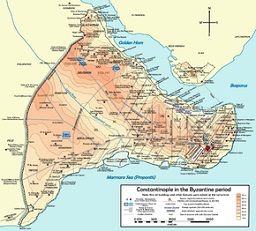
In 657 B.C.E. Greeks from Megara found a colony at Byzantium (Byzantion) (modern-day pop. 14.1M/14.7M) on the site of the 11th-13th cent. B.C.E. Thracian fishing village of Lygos between the Golden Horn (an arm of the Bosphorus) and Sea of Marmara (Propontis) on the European side of the Bosphorus across from Chalcedon on the Asiatic side, and name it after Megarian leader Byzas (Byzantas) of Thrace, who was told by the oracle of Apollo at Delphi to settle there, marrying Lygos gov. Barbysios' daughter Phidalia; located on the Silk Road, and the only sea route between the Mediterranean Sea and Black Sea, it dominates trade; on May 11, 330 C.E. Roman emperor Constantine dedicates it as his new capital, becoming the largest and wealthiest city in Europe from about 450-1204, when it is captured by the Latin Crusaders, then reconquered by the Greek Byzantines in 1261, holding on against yearly Ottoman Muslim attacks until it falls on May 29, 1453, becoming Istanbul ("to the city"), after which the Ottoman Empire rules it until its dissolution on Oct. 29, 1923, when it becomes part of the Turkish Repub.
In 652 B.C.E. the Cimmerians attack Lydia, occupy Sardis, and kill King Gyges; he is succeeded by his son Ardys II (d. -624), who becomes the 2nd Mermnad king of Lydia, going on to attack Miletus and capture Priene, and spend most of his reign fighting the pesky Cimmerians.
In 651 B.C.E. the Cimmerians are driven from Lydia by Ardys, who then plans an electrumfying campaign against the Greek cities on the coast of Asia Minor.
In 651 B.C.E. the Sicilian Greek colony of Selinus is founded by Dorian Greek colonists from Megara Hyblaea; being the closest one to the Phoenician cities it sometimes flip-flops sides in Greek-Phoenician disputes?
Between 650 B.C.E. and 323 B.C., Greece has 1.2K separate city-states.
In 650 B.C.E. the Messenians revolt against the Spartans, starting the Second Messenian War (ends -630), allying with Argos and Arcadia ("people of the bear") and winning the Battle of Senyclarus.

About 650 B.C.E. 1-eyed Lycurgus (the Lawgiver) (Gr. "he who brings into being the works of a wolf") (-700 to -630), reorganizes Sparta, broadening its power base and instituting a polyandric (sloppy seconds?) male chauvinist militaristic culture, with lifelong military training starting at age seven, rigid oligarchic govt. with three Doric tribes each providing a lochos (regiment) for the army, a Gerousia (council) of 28 elders and two kings, an Apella (assembly) made up of adult male citizens (spartiates), five ephors (chief magistrates) with wide powers, and a subclass of non-Spartan Laconians called the Perioikoi who serve in the army but have no vote in the assembly. About this time the city of Rome begins to take off, with homes having foundation blocks, tiled roofs, landscaping, inscriptions, art, etc., and exotic imports from the Greek world.

About 650 B.C.E. the Greek city-colony of Paestum (Posidonia), 25 mi. SE of modern-day Salerno (50 mi. ESE of Naples) on the Gulf of Salerno is founded by colonists from Sybaris, and devoted to Poseidon, to whom they build a colossal Doric Temple of Poseidon, (Hera?) which survives to modern times as one of the most well-preserved ancient Greek temples.

In 650 B.C.E. the Black Figure Period in Greek Art (decorated pottery) begins (ends -510).
In 648 B.C.E. the 33rd Olympiad adds the pancratium, a no-holds-barred extreme-ultimate wrestling-boxing event.
In 640 B.C.E. the kingdom of Macedon (Macedonia) is founded after Perdiccas I of the Argead Dynasty conquers the Macedonian plain and establishes a capital at Aegae (Aigai) (Vergina) in N Greece; Greeks, Illyrians, and Thracians move on in and Hellenize the aristocracy?
In 640 B.C.E. Eurycrates dies, and his son Anaxander (Anaxandros) (d. -615) becomes Agiad king #12 of Sparta.
In 632 B.C.E. the Cylonian Affair sees Athenian noble (Olympic champ) Cylon attempts to establish a tyranny in Athens with help from Megara (run by his tyrant father-in-law Theagenes), but the people don't support him, and they hole-up in the Temple of Athena on the Acropolis, after which Cylon and his brother escape, but the rest are captured by the nine archons of Athens led by Megacles and the Alcmaeonid aristocratic clan while hiding in the Temple of Athena on the Acropolis, then promised their safety and massacred, causing the Curse of the Alcmaeonidae, an inherited miasma (stain) on them.
In 630 B.C.E. Sparta wins the Second Messenian War (begun -650), and forces the poor Messenians back into helotry (serfdom).
About 630 B.C.E. the town of Histria (Istros) (Gr. "By the Danube") on the Dobrudja Black Sea Coast at the mouth of the Danube River is founded, becoming the first Greek town in modern-day Romania, opening up trade with the interior.
About 630 B.C.E. Greek elegiac poet Mimnermus of Smyrna (born in Colophon, Ionia) flourishes (until -600), composing Nanno, a collection of love poems addressed to a flute player.
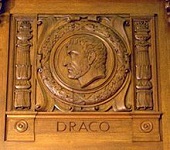
In 628 B.C.E. Athenian thesmothetai (judge) Draco (Drakon) (Gr. "serpent, dragon") the Lawgiver (-659 to -601) is elected ruler of Athens, going on in -622/-621 (39th Olympiad) to enact the draconically strict Law Code (Constitution) of Draco, the first law code of Athens, displayed at a central public location, which punishes the stealing of cabbages with death; "And Draco himself, they say, being asked why he made death the penalty for most offenses, replied that in his opinion the lesser ones deserved it, and for the greater ones no heavier penalty could be found"; unintentional and intentional homocide are first distinguished, with crimes adjuticated at the Aeropagus - is that a trick question?
In 627 B.C.E. the city of Epidamnos (Epidamnus) (Epidamnos) (modern-day Durazzo or Durres, pop. 201K) in Illyria on the Albanian coast opposite Bari and Brindisi across the Adriatic Sea is founded by Greek colonists from Corinth and Corcyra, becoming known for its natural rocky harbor surrounded by swamps and cliffs, making it very durable and secure from attack; the Romans seize it in the 4th cent. B.C.E. and change its name to Dyrrachium.
In 621 B.C.E. Argaios I dies, and Philip (Gr. "horse lover") I (d. -588) becomes king of Macedonia (Macedon).
In 615 B.C.E. Anaxander dies, and his son Eurycratides (Eurycratidas) (Gr. "wide ruler") (d. -590) becomes Agiad king #13 of Sparta, presiding over the devastating war with Tegea.
In the 6th cent. B.C.E. the Mediterranean port city of Marmaris (originally Physkos or Lyscus) in a part of Caria belonging to Rhodes (modern-day Mugla Province, W Turkey on the Turkish Riviera), with a magnificent harbor and sacred grove to Leto; Herodotus claims that a castle existed there since 3,000 B.C.E.
In 600 B.C.E. Critias is elected ruler (archon) of Athens. Leotychidas I dies, and Hippocratidas (d. -575) becomes Eurypontid king of Sparta.
In 600 B.C.E. Athens seizes Sigeum in Asia Minor from Mytilene, causing a war (ends -590).
In 600 B.C.E. Cleisthenes, tyrant of Sicyon transfers Arion's tragic choruses to Dionysus.
In 600 B.C.E. the Spanish harbor town of Gades is destroyed by their rivals the Phoenicians.
In the 6th cent. B.C.E. the isolated Greek state of Boeotia (Beotia) in C Greece, founded by Aeolic tribes from Thessaly emerges, bounded on the N by Locris Opuntia, on the E by the Atalante Channel and the Evripos Strait, on the S by Attica, Megaris, and the Gulf of Corinth, and on the W and NW by Phocis; the capital is Thebes; Boeotians are famed for stupidity.
In the 6th cent. B.C.E. the city of Theline (modern-day Arles) in S France on the Rhone River is founded by the Greeks.
In the 6th cent. B.C.E. the seaport of Pozzuoli on the Bay of Naples is founded by Greek colonists.
In the 6th cent. B.C.E. Corinth founds the colony of Potidaea in the N Aegean in order to trade with Macedonia.
In the 6th cent. B.C.E. the city of Neapolis (New City) (modern-day Naples, pop. 975K/3.1M) is settled by Ionian Greeks from Cumae.
In the 6th cent. B.C.E. the city of Massalia (Massilia) (Marseille) on the Gulf of Lion on the Mediterranean (modern-day pop. 855K/1.5M) is founded by Ionian (Phocaean) Greek and Phoenician colonists, despite Carthage trying to prevent it; the first historic mention of the Celtic Gauls (Gaels) ("love people?") and their country of Galatia (Gael. "Gaeltachd" = "land of the Gaels") ("milk-giving"?), who get introduced to olives and grape wine, and take a litle too well to wine, not drinking it diluted like civilized people?; the Anatolia (Greeks) find it hard to colonize Italy, being confined to the W; they are discouraged by the Phoenicians from settling in S Spain and Corsica, but establish colonies in Egypt.
In the 6th cent. B.C.E. Athenian Tetradrachmas, known for their beauty incl. an image of Athena on one side and an owl on the other become the currency of the ancient Western world, lasting until the Romans replace it with their currency in the 2nd cent. B.C.E.
Christianity's muddled origins in Ancient Greece, or did they get a bootleg copy of the Bible translated badly? In the 6th cent. B.C.E. the mystic Greek cult of Orphism is founded, generating a large body of sacred poetry ascribed to legendary Thracian poet-musician Orpheus, whose doctrines, esp. transmigration of souls (metempsychosis) influence Pythagoras, Plato, and Socrates; you see, the good god Dionysus, creator (Logos?) of the material world started out as a silver egg swallowed by Zeus, 6th son of titans Kronos (Chronos) (Cronus) and Rhea; Zeus, who was born in the Dictaen Cave on Crete is himself saved by his mommy after his daddy Big K, who has already shown his style by castrating his daddy Uranus (Heaven) to separate him from his mommy Gaea (Earth), swallows each of his children by her at birth (Hestia, Demeter, Hera, Hades and Poseidon), causing her to wise up and hide Zeusy baby in Crete (with the aid of Curetes), then give Kronos a rock instead of him for breakfast, allowing Zeus to grow up and force Kronos to disgorge his brothers and sisters; the egg Zeus swallows passes through his semen into Persephone, then is born as Dionysus Zagreus (son of God), but the ever-hungry Titans eat him, and Athena (goddess of wisdom) saves his heart, which Zeus eats, and this time he comes out of Semele as the final day-star-network Dionysus, and Zeus destroys the Titans with his thunderbolt and scatters their ashes through the material world, so that all humans have both good and evil elements; but if they rid themselves of the evil Titanic elements and preserve the good Dionysiac elements, they will eventually become totally purified after a series of reincarnations and go to heaven, while the rest go to hell - nine months later I felt lighter?
In the 6th cent. B.C.E. the Triskelion symbol of three interlocked spirals is found on a Greek vase; it later becomes the basis of the Greek cross (gammadion).
In the 6th cent. B.C.E. the Temple of Alcmeonidae to Apollo in Delphi, Greece is erected to restore the one that burned down; it is destroyed in -373 by an earthquake; "Know thyself" (Gr. "gnothi seauton") is inscribed in the forecourt (pronaos).
In the 6th cent. B.C.E. the Greek shrine of Dodona in the Epirus region 50 mi. E of Corcyra (modern-day Corfu) is first mentioned as a favorite place of King Croesus of Lydia, featuring a temple of Zeus and his consort Dione, whose priests interpret the rustling and other movements of a great oak tree along with the murmurings of a fountain as the words of Zeus.
In 595 B.C.E. the First Sacred War (ends -585) begins when the fortified city of Kirrha (Cirrha) (Crisa) (N of the Gulf of Corinth) causes a crisis by levying tolls on visitors to the sacred Shrine of Apollo on Delphi, causing the Amphictyony of Anthela led by Thessaly to form the Amphictyonic League along with Sicyon and Athens and declare war.

In 595 B.C.E. Solon the Wise (-638 to -558) is elected sole ruler (archon) of Athens, with special legislative powers to quiet civil unrest caused by the introduction of coined money and debt slavery.
In 590 B.C.E. Eurycratidas dies, and his son Leon (Gr. "lion") (d. -560) becomes Agiad king #14 of Sparta, fighting to a draw with Tegea.
In 590 B.C.E. Solon leaves Athens for 10 years to travel around the Mediterranean, leaving Athens to break out into factional fighting between the pediakoi (rich aristocrats of the plain) led by Lycurgus, and the paralioi (merchants and craftsmen) led by Megacles the Alcmaeonid.
In 582 B.C.E. Acragas (Agrigentum) (modern-day Girgenti) on Mt. Camicus in Sicily is founded by Greeks from Gela, becoming the #2 city after Syracuse, building great temples in the Valley of the Temples.

In 570 B.C.E. Pisistratus (Peisistratos) (Peisistratus) (-605 to -527) of Athens (a relative of Solon) begins a war against the Megarians (ends -565), making him a military leader with political ambitions.
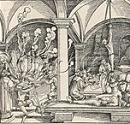
In 570 B.C.E. after turning his job of building a temple of Zeus Atabyrius in the citadel into an excuse to seize power, Phalaris (d. -554) becomes tyrant of Acragas (Agrigentum) in Sicily, ruling with an iron hand, building up, strengthening and providing water to the city, and pursuing imperialist expansion, going on to take over the whole island of Sicily, starting with Himera in the N; an epicure, he enjoys eating suckling babies; after brassmaker Perillos of Athens proposes it to him, Phalaris builds the brass Sicilian Bull (Bull of Phalaris), which he uses to roast criminals to death while a complex piping system turns their cries into the bellowing of a bull, while the fire is stoked with fragrant incense; after it is reopened, the scorched bones supposedly shine like jewels and are made into bracelets; guess who is the first victim, you guessed it, Perillos.
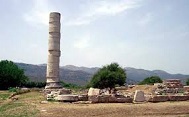
In 570 B.C.E. the Heraion of Samos, a temple of Hera is built in Samos by architect Rhoikos, lasting only a decade before being destroyed by an earthquake, becoming the first Ionic temple built in Ionia, the SW coast and islands of Asia Minor settled by Ionian Greeks, spreading to mainland Greece by the 5th cent. B.C.E.

About 570 B.C.E. Greek philosopher Anaximander of Miletus (-610 to -546) constructs the first known geographical and star charts.
In 566 B.C.E. the Panathenaic Games (Panathenaea) are founded in Athens, Greece, held every four years until the 3rd cent. C.E.
In 565 B.C.E. Pisistratus conquers the island of Salamis from Megara, which boosts his political capital; he organizes the Diakrioi ("men of the hills"), a new party of small farmers, shepherds, artisans, and poor people based in the hill country of N Attica, competing with Solon's two factions of the Pediakoi ("men of the plains") and Paraloi ("men of the shore"), and begins his rise to powah in Attica.
In 560 B.C.E. Pisistratus seizes the Acropolis, expels Megacles and the rich aristocratic Alcmaeonids from Athens (until -554), and is elected ruler of Athens, becoming a people's choice best in show tyrant, founding the Peisistratid Tyranny (ends -510), which becomes known for founding great festivals.
About 560 B.C.E. Corsica is colonized by Greek (Phocaeans) from Ionia.
About 560 B.C.E. Heraclea Pontica at the mouth of the Lycus River on the coast of Bithynia in Asia Minor is founded by the Greek city-state of Megara, and named after Heracles (Hercules), who they believe entered the underworld at a cave on the adjoining Archerusian Promontory on Cape Baba; the city subjugates the native Mariandynians and agrees not to sell them into slavery outside their homeland, and extends its control along the coast E to Cytorus, going on the found Black Sea colonies in Cytorus, Callatis, and Chersonesus; the city is broken by the Mitridatic Wars (-88 to -63).
In 550 B.C.E. after open war breaks out between the Greeks and an alliance of the Etruscans and Carthaginians, the latter under Carthaginian king Malchus campaign successfully against the Greeks in Sicily; Mago founds a new dynasty that dominates Carthage until the 4th cent. B.C.E.
About 550 B.C.E. the city of Thebes in Boeotia in EC Greece (44 mi. NW of Athens), allegedly founded by Cadmus (Kadmos) (Gr. "from the east") (son of King Agenor of Tyre and brother of Europa, Phoenix, and Cilix, and inventor of the Phoenician alphabet) from troops created out of dragon teeth (while he ultimately turns into a serpent?) (causing its acropolis to be called Cadmeia) forms the Boeotian League and begins absorbing the smaller city-states around it, incl. Orchomenos (Orchomenus) to the NW (Lake Copeis), Thespiae, and 12 others (14 total), creating a major player between Attica on the S and Phocis on the W and NW.
About 550 B.C.E. the Seven Sages (Wise Men) of Greece (Greek Antiquity), with their "pithy and memorable dicta" posted on the wall of the Temple of Delphi as dedications to the god Apollo are retroactively created in a literary hall of fame: Solon (Gr. "wise") of Athens (-638 to -558) ("Nothing in excess"), Chilon (Chilo) of Sparta (-600s) ("Know thyself"), Thales of Miletus (-624 to -547) ("To bring surety brings ruin"), Bias of Priene (-600s) ("Too many workers spoil the work") ("Most men are bad"), Cleobulus (Cleobulos) of Lindos (-600s) ("Moderation is the chief good"), Pittacus of Mitylene (-640 to -568) ("Know thine opportunity"), Periander of Corinth (d. -587) ("Forethought in all things"); alternates incl. Myson of Chen (Chenae) (Khenai) (-600s) and Anacharsis (-600s) (from Scythia).
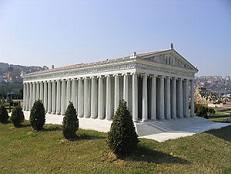
About 550 B.C.E. the Temple of Artemis (Diana) (Artemision) in Ephesus (Asia Minor) on the Ionian coast is begun by Lydian King Croesus and Greek Cretan architect Chersiphorn of Knossos and his son Metagenes, becoming one of the Seven Wonders of the Ancient World, evolving into the best little whorehouse in Asia Minor? - the original Charles and Diana? About 550 B.C.E. the Greeks build a temple of Athena and temple of Hera in Paestum in S Italy.
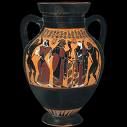
About 550 B.C.E. the Painter of Berlin 1686 decorates vases and amphorae with the black figure technique in Athens.
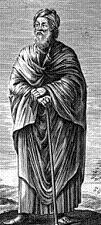
About 545 B.C.E. Xenophanes of Colophon (-570 to -470) leaves his home town of Colophon in Asia Minor and becomes a wandering poet-minstrel in Greece and Sicily, settling in Elea in S Italy in -536 for awhile and joining and/or co-founding (with Parmenides of Elea) the Eleatic School of Philosophy, which ridicules polytheism and pushes pantheism, dissing Homer for his anthropomorphic gods, with the famous soundbyte that if oxen could paint and sculpt they'd depict gods who look like oxen, espousing a belief in a supreme God that is non-mortal and eternal and doesn't intervene in human affairs; he reduces the world to the qualities of wet and dry (water and earth), dissing Anaximenes and his air theory by noting from his examination of fossils that water once covered the Earth, differentiating belief from knowledge.
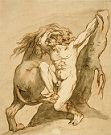
In 536 B.C. the 61st Olympiad sees famous Greek athlete Milo of Croton (Crotona) (-552 to ?), who won the boys' wrestling event in the last Olympics win the men's wrestling event for the first of 5x, becoming the source of all kinds of manly stories, incl. training by carrying a newborn calf on his back every day and working up to a 4-y.-o. cow, or holding his arm out with fingers outstretched and challenging anyone to pull his finger, er, sorry, that's Babe Ruth, bend his little finger. In 511 B.C.E. a Crotonian army commanded by Milo defeats the Sybarites; Milo dresses like Hercules in a lion's skin with a club. Too bad, one day after he reaches at least his forties a tree collapses on him and he is eaten by wild animals.

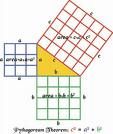

Shut your pi hole and do your math homework?



Shut your pi hole and do your math homework? About 530 B.C.E. after traveling to Egypt and learning the doctrines of the Egyptian priests, Greek Ionian philosopher (pupil of Anaximander, going for the air or ether is arche theory) Pythagoras of Samos (-580 to -497) is driven from Samos by tyrant Polycrates, and founds his mystical philosophical sect in Italy's Toe City Croton (Crotona), teaching reincarnation, numerology, and dietary restrictions (no beans), and gaining the support of superstar athlete Milo of Croton after claiming to be a reincarnation of Trojan War soldier Euphorbus; although he leaves no writings, his school discovers the Pythagorean Theorem and raises math to a science, considering Number to be the ultimate principle of the Universe, and believing the Earth to be a globe revolving with the planets (incl. the Sun) around a central fire, separated from each other by intervals corresponding to the harmonic lengths of strings, which play the Music (Harmony) of the spheres, with the incantation: "Ace choired plus bees choired e-quills seas choired"; ; Pythagoreans don't eat beans because they make bad music?; "The most momentous thing in human life is the art of winning the soul to good or to evil" - how I want a drink, alcoholic of course? Pythagoras leaves his writings to his daughter (by Theano) Damo, who passes them to her daughter Bitale.
About 515 B.C.E. (July -518)?) Scylax of Caryanda, a Greek in the Persian navy is sent by Darius I to explore the coastlines of India and Egypt, spending 30 mo. and helping Darius I conquer the Indus River Valley.
Why can't we be friends, why can't we be friends? The D Word, the 5 and 10 Cent Form of Government is Born?


In 510 B.C.E. Hippias of Athens (last Athenian tyrant) is overthrown by the Alcmaeonidae allied with the Spartans, and goes into exile along with his relatives at the court of Darius I of Persia, trying to talk him into invading Greece; the aristocrats, led by Isagoras are overthrown by the common people, headed by Athenian Alcmaeonid Cleisthenes (-572 to -485), who institutes a dem. reform of the constitution, making citizenship independent of clan, which shocks Spartan Agiad King Cleomenes I, who wants a pro-Spartan oligarchy, causing him to lead an expedition into Attica, which is foiled by fellow Spartan (Eurypontid) king Demaratus, compounded by the defection of Corinth; the Greek Archaic Period (begun -800) ends, and the Classical Age of Greece begins (ends -323), with Cleisthenes becoming known as "the Father of Greek Democracy". The Greek city of Sybaris in S Italy (Magna Graecia) is destroyed by the bean-no Pythagoreans who seize political control of Croton, and make use of internal dissensions in Sybaris to defeat it, sack it, and divert a river over its site; meanwhile Spartan leader Dorieus allies with Croton and tries to colonize W Sicily, but is killed by the Phoenicians and Segestans. End of the Black Figure Period, and start of the Red Figure Period of Greek Art (decorated pottery) (ends -330).
In 505 B.C.E. Cleandrus (d. -498) becomes tyrant of Gela in S Sicily.

In 504-501 B.C.E. Greek Socratic philosopher ("the Dark or Obscure") (dark clothing) ("the Weeping Philosopher") Heraclitus of Ephesus (-535 to -475) flourishes, becoming the philosopher of the Logos, and Mr. Fire Is the Source of All Things, adding the concept of becoming to that of being, and holding virtue to consist in subordinating the individual to the laws of society, as long they are based on a universal and reasonable harmony, leaving On Nature; he becomes known for the soundbytes: "No man ever steps in the same river twice", "The path up and down are one and the same", and "All entities come to be in accordance with the Logos (word)."
In the 5th cent. B.C.E. the literacy rate in Athens reaches 10%-15%, and goes down from there in Europe until the Industrial Rev.?
In the 5th cent. B.C.E. the Achaean League is formed by the 12 city-states of Achaea in the N-C Peloponnese of Greece.
In the 5th cent. B.C.E. the city of Beroea is founded in Macedonia on the site of modern-day Verroia (Veroia) (40 mi. WSW of Salonika), going on to become the most populous city of Macedonia by the first cent. C.E.
In the 5th cent. B.C.E. the Greeks establish the colony of Elibyrge (Elybirge) in S Spain, which later becomes known as Illiberis to the Romans, and later as the city of Granada.
In the 5th cent. B.C.E. crop rotation is introduced in Greece, leading to large estates worked by slave labor.
In the 5th cent. B.C.E. trapezitai (private bankers) take over the money-exchanging and money-lending business in Greece, and Athenian coinage becomes the predominant medium of exchange in the Greek world.
About the 5th cent. B.C.E. Greek Socratic philosopher ("the Dark or Obscure") (dark clothing) ("the Weeping Philosopher") Heraclitus of Ephesus (-535 to -475) flourishes, becoming the philosopher of the Logos, and Mr. Fire Is the Source of All Things, adding the concept of becoming to that of being, and holding virtue to consist in subordinating the individual to the laws of society, as long they are based on a universal and reasonable harmony, leaving On Nature; he becomes known for the soundbytes: "No man ever steps in the same river twice", "The path up and down are one and the same", and "All entities come to be in accordance with the Logos (word)."
In the 5th cent. B.C.E. Greek Pythagorean philosopher Hippasus of Metapontum flourishes, discovering the irrationality of the square root of 2, causing a legend to claim that he is drowned at sea by the gods as punishment.
In the 5th cent. B.C.E. rival Greek painters Zeuxis of Heraclea Pontica and Parrhasius of Ephesus flourish; Zeuxis allegedly paints such realistic grapes that the birds try to eat them, but Parrhasius paints such a realistic curtain that Zeuxis attempts to draw it aside, losing a painting contest with him because although he had deceived birds, Big Parrot had deceived him, causing Parrhasius to receive Athenian citizenship, and go on to paint the Demos, a personification of the Athenian people, showing their macaroni mix of types.
In 500 B.C.E. some Greek aristocrats are expelled from Naxos, flee to Miletus, and ask Aristagoras of Miletus (son-in-law of Histaeus) for help, and he goes to Artaphernes of the Persians, who decides to help them invade.

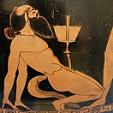
The original Tumnus from Narnia? About 500 B.C.E. the Greek cult of Pan becomes popular in Athens, with Pratinus of Philius introducing the Satyr Play at the yearly Dionysia (Dionysian festival) in Athens, showing burlesques about Pan's companions the half-goat Satyrs, known for pointy ears, long curly hair and beards, and unstoppable tumescent erections, who are ever-ready but shy, and love to dance with and chase nymphs while swigging wine; the leader of the satyrs is Silenus; Aeschylus allegedly writes the best, only one of which survives; Satyr Suspending a Pipe Case from His Erection (painted on an Attic black-figure plate) and Satyr Balancing a Wine Cup on His Erection (painted on an Attic red-figure psykter) are produced about this time; Greek actors are called "hypocrites" (pretenders) - how low can you go for your master Satan, that about summarizes professional acting?
In 499 B.C.E. Aristagoras, tyrant of the city of Miletus goes on a joint expedition with Persian satrap Artaphernes (brother of Darius I the Great) to conquer Naxos, and after Persian gen. Megabates flops and warns them, it turns into a debacle, causing Aristagoras to decide to incite the Greek city-states of Ionia into a rebellion against Darius I to save his position; fellow Milesian tyrant Histiaeus (d. -493) gives the signal to begin the Ionian Revolt (ends -493) by sending a message to Aristagoras tattooed to the scalp of his slave shaving his head first then letting the hair grow back); Militiades the Younger joins the Ionian Revolt, capturing the islands of Lemnos and Imbros, which he eventually cedes to Athens to establish friendly relations; the start of the (Greco-)Persian Wars (end -448).

In 499 B.C.E. Aeschylus (-525 to -456) enters his first dramatic competition at the Greater Dionysia, going on to become the first Greek playwright to put two actors onstage at the same time.
In 498 B.C.E. Aristagoras travels to mainland Greece to solicit aid, causing Athens to contribute 20 ships and Eretria five; an Ionian and Athenian fleet sails to Ephesus, and the soldiers disembark and march to fight Persian satrap Artaphrenes, then burn the capital of Sardis and return to Ephesus, where the Persians meet and massacre them; Aristagoras escapes and fights on.

In 498 B.C.E. Amyntas I dies, and Alexander I Philhellene ("not-a-Greek") (d. -454) becomes king of Macedonia, and later becomes the first Macedonian to participate in the Olympics and win.
In 498 B.C.E. Cleandrus is murdered, and Hippocrates (d. -491) becomes tyrant #2 of Gela, going on to conquer Leontini (Lentini) (Leontinoi) in -494, making his ally Aenesidemus its tyrant.
In 497 B.C.E. the beginning of the rule of the tyrants in the city of Catania (Katania) in E Sicily.
In 496 B.C.E. a 10-year gap is filled when Hipparchus is elected ruler of Athens.

On Oct. 20, 494 B.C.E. the Ionian Revolt (begun -499) fails with a naval defeat by the Persians at the Battle of Lade (Ladé) (Lades), followed by the sacking of Miletus, which is later rebuilt on a new site after all men are killed, the women and children are sold into slavery, and the young men castrated; historian Hecateaeus of Miletus conducts the negotiations with satrap Artaphernes, obtaining his consent to restore the constitution of the Ionic cities; Zancle in Sicily is burned and all the inhabitants (mainly from Samos) are enslaved by the Persians, who vow to get even with Athens for supporting the revolt; rebel leader Miltiades (-550 to -489), tyrant of Chersonesus flees to Athens, where he rises to prominence despite opposition by the Alcmaeonidae.
In 494 B.C.E. King Cleomenes I of Sparta attacks and defeats Argos, slaughtering 6K in the Battle of Sepeia, and forcing it into the Peloponnesian League and giving Sparta hegemony in S Greece; Cleomenes tries to punish Aegina for supporting Persia but is blocked by the other Spartan king Demaratus.
By 493 B.C.E. the Persians control all the Greek city-states of Asia Minor, and now begin an extensive preparation for an attack on the free cities of the Greek mainland.

In 493 B.C.E. Themistocles (-514 to -462), leader of the anti-Persian party is elected ruler (archon) of Athens, persuading Athens to expand its naval power by building 200 triremes and fortifying the three natural harbors of the Piraeus.
In 493 B.C.E. the strategic city of Zancle in NE Sicily is captured by Anaxilas, tyrant of Rhegium (Reggio di Calabria) across the Strait of Messina with assistance from the refugees from Mssina; he expels the remaining Samians and resettles the city with Messenians, then renames it Messana (Messina).
In 492 B.C.E. after his son Metiochos is captured by the Persians, Militiades the Younger flees to Athens, and talks his way into becoming one of the 10 strategoi (generals) for -490.
In 492 B.C.E. Darius I the Great sends a 600-ship Persian fleet under Gen. Mardonius (d. -479) to punish Athens and Eretria for aiding the Ionian Revolt, but it is destroyed in a storm on the cliffs of mean Mount Athos while rounding the Chalcidice - they weren't worth a daric?

In 491 B.C.E. Hippocrates dies, and Gelon (Gelonos) (Gelo) (d. -478), son of Deinomenes becomes ruler of Gela, founding the Deinomenid Dynasty.
In 491 B.C.E. Eurypontid Spartan king Demaratus is deposed by Cleomenes after being accused of being illegitimate, despite the opposition of the ephors, and more controllable Leotychidas II (-545 to -469) becomes Eurypontid king of Sparta (until -476), going on to lead the Spartans in the Persian Wars of -490 to -478; Demaratus goes into exile with the Persians and becomes bitter - have a seat right over there please?
In 490 B.C.E. meany Cleomenes I (r. since -520) goes mad, is imprisoned, and either commits suicide or is executed by the pissed-off Spartan ephors, and next year his half-brother Leonidas (Gr. "son of the lion") I (-520 to -480) becomes Agiad king #17 of Sparta (until Aug. 11, -480); his wife is Cleomenes I's daughter Queen Gorgo, mother of future Spartan king (-480 to -458) Pleistarchus, who becomes one of the few female historical figures mentioned by Herodotus, and originates the saying "He tan he epi tas" ([return from battle] carrying the shield or lying upon it) before the Battle of Thermopylae.
In 490 B.C.E. Darius I the Great sends a 2nd Persian force under Artaphernes and Datis, this time going across the Aegean Sea, which sieges Eretria on Euboea until it falls through treachery; on Sept. 12 after aged I-ain't-as-good-as-I-once-was ex-tyrant Hippias talks him into it, Darius I lands at Marathon, center of Peisistratid strength; the Battle of Marathon, AKA the Battle of Fennel Fields sees an Athenian army of 10K-20K under Gen. Miltiades (one of 10 strategoi) lure then defeat an invading Persian army of 15K-25K in a field of fennel, with losses of 192 Greeks vs. 6.4K Persians (incl. Hippias?), making good use of the phalanx, and pioneering double envelopment; Athenian messenger Pheidippides (Phidippides) (Philippides) (Thersipus?) (Erchius?) (Eucles?) is sent in full armor to run to Athens 41 km (26 mi.) away to announce the Greek V with the message "Nike" (victory) (actually "Nenikekamen" = "We are victorious), after which he drops dead after running the first marathon; the first mention of the runner is in Plutarch's "On the Glory of Athens" in the 1st cent. C.E., and what really happened was that Pheidippides was sent before the battle to Sparta 140 mi. away to ask for help, and they refused because they were holding a sacred festival, and after the battle the Athenian army marched 25 mi. back to Athens to head off the Persian fleet, and the two events got confused; Greek gen. Miltiades dedicates his helmet to Zeus, and it ends up in a museum; Aeschylus fights in the front lines against the Persians; in Sept. 1970 C.E. the skeletons of five warriors who died in the battle are discovered by archeologists in the Soros of the Plataians 26 mi. NE of modern Athens; the Persians then try an end-around run, sailing around Cape Sunium to attack Athens, but the fleet-footed Athenians beat them to the city, causing the Persians to chicken out and retreat to Asia. After the Greek V (nike) at Marathon, gen. Miltiades (-550 to -489) sends a flotilla to Paros Island W of Naxos (known for its fine white Parian marble) to demand a ransom for supporting the Persians, but he fails and breaks a leg, and is charged with treason ("deceiving the people") by the Athenian court, then jailed when he can't pay the huge fine of 50 talents - no leg to stand on jokes here? After the Greek V (nike) at Marathon, a shield signal is raied on Mt. Pentelicon above Marathon to signal the Persian navy to sail around Cape Sounion and attack unguarded Athens, which is widely attributed to the treachery of the Alcmaeonidae and their leader Megacles.
In 490 B.C.E. the gamoroi (landed aristocracy) begin to lose control in Syracuse to a disorganized democracy, causing them to invite tyrants in.
About 490 B.C.E. Sicilian chef Mithaecus (Mithaikos) flourishes, bringing Sicilian cooking to Greece after being expelled from Sparta to Athens, writing the first known cookbook.
In 489 B.C.E. Militiades the Younger (b. -550) leads an Athenian expedition of 70 ships to punish the Greek islands that supported the Persians, and attacks Paros, but fails to take it; Militades suffers a severe leg wound which incapacitates him; after returning without accomplishing the mission he is convicted of treason, and sentenced to death, but the sentence is reduced to 50 talents, which is beyond anybody's ability to pay, and he ends up dying in prison of gangrene.
In 488 B.C.E. the 73rd Olympiad sees tyrant Gelo of Syracuse (d. -48) win a victory in the chariot race, causing sculptor Glaucias of Aegina to make a statue of him, followed by more statues of Olympian athletes incl. Philon of Corcyra, Glaucus of Carystus, and Theagenes of Thasos.
About 488 B.C.E. Greek sculptor Phidias is commissioned to execute a large bronze group of nat. heroes at Athens with the central figure being Marathon hero Miltiades.
In 487 B.C.E. anti-Persian party candidates Themistocles (leader of the commoners) and Aristeides (leader of the aristocrats) are elected rulers of Athens, which reforms its constitution to make it more democratic.
In 487 B.C.E. Hipparchus, relative of the tyrant-traitor name-is-mud Hippias of the Pisistratus Dynasty is the first person to be officially ostracized after over 6K ostraka (potsherds) with his name written on them are cast by the assembly, causing him to be exiled from Athens for 10 years while retaining his property and citizenship; the vote is called for by a show of hands in the assembly, and at least 10K of them ostrakon thingies have to be cast for a valid ostracism, requiring him to leave Athens for 10 years min. without loss of property, civil rights or stigma, and subject to a recall vote by the assembly.
In 486 B.C.E. Alcmaeonid leader Megacles of Athens is ostracized, which doesn't stop him from winning the chariot race in the Pythian Games, according to Pindar.
In 484 B.C.E. Aeschylus wins his first Athenian first prize for drama.
In 483 B.C.E. the war between Athens and Aegina (begun -489) ends indecisively.
In 483 B.C.E. after a rich new vein of silver is discovered at the mines at Mt. Laurium, Themistocles convinces the assembly to use the money to build a fleet of 200 triremes; Aristides opposes the measure, and is ostracized.
In 481 B.C.E. Xerxes I's army gathers in Cappadocia and winters in Sardis, planning to kick Greek butt next spring; meanwhile the Congress at the Isthmus of Corinth agrees to end the war between Athens and Aegina; the Greek states, led by Sparta and Athens set up the Hellenic League to resist the Persians, with Themistocles of Athens as CIC (strategos autocrator), who refuses to place the army under command of Spartan king Leonidas, but agrees to allow the navy to serve under a Spartan adm.; after Sparta and Athens refuse the offer of Gelon of Syracuse to become CIC, he leaves quick to stop an invasion by Carthage; too bad, Thebes and Thessaly refuse to support Athens against the Persians, and Crete remains neutral.
In 480 B.C.E. the 75th Olympiad sees Theagenes (Theogenes) of Thasos defeat Euthymus in boxing; later a statue of him is made by sculptor Glaucias of Aegina, which is scourged by a man who had a grudge against the athlete, after which it fell on him and killed him, causing the statue to be tried and convicted of murder and thrown in the sea, then retrieved after the Delphic Oracle declares that the country will be barren until it's back.



In spring 480 B.C.E. Persian Zoroastrian king (since -486) Xerxes (Khshayarsha) (Ahasuerus) (Pers. "monarch") I the Great (-518 to -465) personally leads an invasion of Greece against the ?!*! pesky free-thinking polytheist Greek hooligan terrorists, assisted by bitter exiled Spartan king Demaratus, marching through Thrace and Macedonia with 200K-2M men, incl. units of Arabs on camels (Herodotus Bk. 7 says 5M plus camp followers), plus a fleet of 600-1,200 ships, cutting a canal through the 1 mi. wide Isthmus of Chalkidiki (Chalcidice) for them; on Aug. 9-11 (Aug. 16-18?) (Sept. 8-10?) (Aug. 20?) the Battle of Thermopylae sees a Greek allied army of 7K hoplites (incl. 300 Spartans, 400 Thebans, 700 Thespians, 900 Helots, and 1K Phocians) block the 50-yd.-wide (as wide as a wagon track in some places) coastal pass (6 mi. from the sea, which turns into a swamp then a rocky plain in modern times) of Thermopylae (Thermopilai) (Gr. "hot gates") in E Greece (between Mt. Oeta and the S shore of the Gulf of Maliakos) for three days, while a fleet of 270 Greek ships protects the Gulf of Artemisium; on Aug. 19 after a Greek traitor shows the Persians a bypass route which allows them to turn the Greek position, most of the Greeks retreat, except 300 Spartans and 700 Lesbians, er, Thespians (famous for their worship of Eros and the Muses) under Spartan Agiad king (since -490) Leonidas I (-520 to -480), who make a stand, and are all KIA in a legendary fashion after responding to the Persian demand to surrender their weapons with the immortal soundbyte "Molon labe" (come and take them); later Simonides of Keos turns this into the immortal soundbyte "Go tell the Spartans, stranger passing by, that here, obedient to their laws, we lie"; meanwhile half of the Persian fleet is lost to storms, and the naval Battle of Artemisium is a push, but the loss of Thermopylae causes the Greek navy to withdraw, and the Boeotians, Phocians, and Lorians to flop to the Persian side; Artemisia I of Caria commands five ships for the Persian side, followed by the Battle of Salamis, becoming the first known female admiral in history?: the Greek army retreats to the Peloponnese and builds a wall across the Isthmus of Corinth, and the Greek fleet moves to the Saronic Gulf between Athens and Salamis, causing the Athenians to flee and the Persians to occupy Attica and sack and destroy Athens, but on Sept. 23 the Greeks score a big V at the naval Battle of Salamis in the Straits of Salamis after the Persians make the mistake of attacking in a narrow strait which takes away their numerical advantage; Paros switches sides after the battle, and joins the Athenian League; Xerxes heads back to Persia with what remains of his navy and a third of his army, leaving Gen. Artabazus in charge of one-third in Thrace, and Gen. Mardonius in charge of the rest, who withdraws from Athens, burning everything in his path, and winters in Boeotia; the Acropolis in Athens is destroyed. Leonidas I dies, and his son Pleistarchus (d. -458) becomes Agiad king of Sparta. Theron of Acragas and Gelon and Hieron of Syracuse win the Battle of Himera in Sicily against Terillus of Himera, Anaxilas of Rhegium and the invading Carthaginians under Hamilcar; Syracuse begins expanding into the Tyrrhenian Sea along the Italian coast, stopping the Etruscans; the Carthaginian invasion of Sicily is stopped for 70 years, causing them to turn inland and take over the fertile Libyan hinterland.
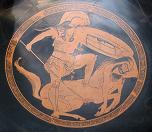
About 480 B.C.E. Centauromachy, a Greek red-figure kylix is made.
Plataea - The Greek World's Mister Money Shining Moment?

On Aug. 27, 479 B.C.E. (morning) after the Persians invade Attica again, the Greeks ignore their differences and unite against the common Persian foe, fielding an army of 110K incl. 39K Spartans in the land Battle of Plataea; the Persians under gen. Mardonius are defeated by Greek forces under Spartan gen. Pausanias (-510 to -468), with a total loss of 250K; Mardonius is KIA and his body stolen and his camp plundered; meanwhile on Aug. 27 (afternoon) after the Samians and Chians convince king Leotychides II of Sparta to take his small Greek fleet guarding the Cyclades to surprise the Persians after the latter make the mistake of drawing their ships up on the beach at Mycale near Samos, the naval Battle of Mycale sees the Athenians under gen. Xanthippus (father of Pericles) destroy the Persian fleet and complete the Greek repulse of Persia; both battles take place near a temple of the Eleusinian Demeter (Herodotus, Bk. 9); too bad the town of Thespiae in SC Boeotia in EC Greece, E of Mt. Helicon (10 mi. WSW of Thebes and 10 mi. WNW of Plataea) (whose pop. fought at both Thermopylae and Plataea) is destroyed by the Persians; on Sept. 6 the Greeks siege Thebes, demand that they turn over Persian collaborators Timagenidas and Artaginus, and when they refuse, capture the town, abolish the oligarchy, and institute a democracy; the Ionian cities of Asia Minor along with several island cities (Chios, Lesbos, Samos) see their chance and revolt from the Persian melon-heads, forming an allied Greek fleet that sieges the Persian stronghold of Sestos in the Thracian Chersonesus at the mouth of the Aegospotami River; the Spartans return home in the fall, but the Athenians and Ionians stay and capture Sestos early next year; meanwhile a tsunami in Potidaea, Greece (first in recorded history) saves the town from a Persian invasion.
In 478 B.C.E. the Persian threat behind them, the Golden Age of Athens (ends -404) begins, during which Athens grows into an empire, reaching the height of wealth and powah and producing its greatest philosophers, historians, physicians, etc.
On Feb. 17, 478 B.C.E. a solar eclipse occurs as Xerxes is departing for his expedition against Greece, as mentioned by Herodotus Bk. 7.
In 478 B.C.E. Gelon dies, and his brother Hieron (Hiero) I (d. -467) becomes tyrant of Syracuse, making it the most powerful state in Sicily, creating the first Greek secret police, relocating entire cities while conspiring against his last brother Polyzelos and patronizing culture, with Greek poets Pindar, Bacchylides, Aeschylus, Epicharmus, and Simonides of Keos (Ceos) (-556 to -468) (inventor of the idea of the Memory Palace, along with four letters of the Greek alphabet) moving to his court and churning out poetry, little of which survives to modern times - everybody committed it to memory and didn't need to write it down?
In 478 B.C.E. an allied Greek fleet led by Pausanius sacks Cyprus and Byzantium; the Spartan ephors recall Pausanius and try him for treasonous negotiations with the Persians, but he is acquitted and sent back to Byzantium; meanwhile the Spartans send Dorcis to command the allied fleet, but the Ionians refuse to recognize the dorkus and make an alliance with the Athenians in order to finish expelling all remaining Persians from Greek territory, setting up the Delian League (Athenian maritime confederacy, incl. the cities of Rhodes, Camirus, Lindus, and Ialysus), and commissioning Gen. Aristides the Just (-530 to -468) to set up a HQ on the island of Delos to collect the tribute from each member; the gen. assembly (synhedrion) consists of one voting member per ally, but big kid on the block Athens soon manages to take it over incl. its treasury, putting half of Athens on the govt. payroll; Miletus joins the Delian League and recovers from its sacking.
In spring 477 B.C.E. Persian gen. Mardonius departs from Sparta to Thessaly, and on Aug. 1 a solar eclipse is observed in Sparta according to Herodotus, Bk. 7.
In 476 B.C.E. Cimon, son of Miltiades is elected strategos of Athens, and leads an expedition to Thrace, capturing most of the Persian forts on the coast (incl. Eion) and expelling Pausanias from Byzantium.
In 476 B.C.E. Leotychidas II (d. -469) is deposed and banished for taking a bribe, and Archidamus II (d. -427), son of Zeuxidamus (Cyniscos) becomes Eurypontid king of Sparta.
In 476 B.C.E. Hieron I of Syracuse evacuates Catana to the Sicelian city of Inessa (Inessum), and renames it to Aitna (Aetna) (Gr. "I burn"), with capital at Hieron, repopulating it with 10K people from Syracuse and the Peloponnesus; in -465 Aetna begins manufacturing silver coins of unsurpassed workmanship.
In 475 B.C.E. 11K-ft. Mount Etna on the E coast of Sicily begins erupting continuously, and both Pindar and Aeschylus describe it.
In 475 B.C.E. Cimon captures Eion on the NE Greek mainland at the mouth of the Strymon River from the Persians after a long siege, then defeats the pirates on the island of Scyros; Athens sends cleruchs to both.
In 475 B.C.E. the city of Carystus in Euboea is forced to join the Delian League.
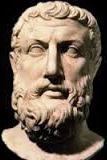
About 475 B.C.E. Greek philosopher Parmenides of Elea (-515 to -445) founds (with Xenophanes) the Eleatic School of Philosophy, which considers the real to be motionless, and distinguishes between belief and knowledge, influencing Plato; he claims that the Moon shines by reflected light; "To think and to be is the same thing."
In 472 B.C.E. Theron of Acragas dies, and the alliance with Syracuse dies with him; his mean son Thrasydaeus succeeds as tyrant of Acragas; he is defeated and deposed by Hieron I of Syracuse, and both Acragas and Himera set up democracies; Hieron I becomes big boss of Sicily, known for cruelty, but also a patron of poets and philosophers incl. Pandar and Aeschylus, and a champion athlete, winning the chariot race at Delphi in -470 and at Olympia in -468 - the original Godfather?
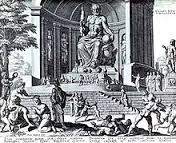
In 472 B.C.E. the Doric Temple of Zeus in Olympia, Greece is begun (finished -456), complete with a giant 40-ft.-tall 22-ft.wide seated Statue of Zeus at Olympia (finished -435), by sculptor Phidias (Pheidias) (-480 to -430), which is later copied in the Abraham Lincoln Memorial in the U.S.; it is paid for by funds from the Elean defeat of Pisa; the architect is Libon of Elis.
In 472 B.C.E. Aeschylus debuts his play The Persians (Persae).
In 471 B.C.E. Praxiergus becomes archon in Athens this year and next.
In 471 B.C.E. Argos, Tegea, and all of Arcadia except Mantinea form an anti-Spartan alliance (until -469).
In 471 B.C.E. Cimon gets Themistocles ostracised, causing him to flee to Argos and conduct anti-Spartan activity in the Peloponnese, possibly causing Elis to unite; in the 20th cent. C.E. more than 500 ostraka bearing Themistocles' name are dug up in Athens near the Acropolis and Agora.
In 470 B.C.E. Hanno ("merciful") the Navigator (Hanno II of Carthage) makes a celebrated voyage beyond the Pillars of Hercules down the African coast as far as Senegal, Sierra Leone, Cameroon, Gabon, or Nigeria, establishing a dye manufacturing plant in Mogador (Mogadore) in Morocco; he first describes gorillas, describing them as a savage hirsute people whose males couldn't be captured and the three females that were were so vicious that they had to kill them and transport their skins instead - once you go black you'll never go back?
In 470 B.C.E. alfalfa is introduced by the Persians to the Greeks - along with a macrobiotic diet?
In 469 B.C.E. Argos captures Tiryns and destroys once-great Mycenae, but is defeated with its allies at the Battle of Tegea and the Battle of Diplaea, and Sparta restores its hegemony.

In 469 B.C.E. Greek (Athenian) plug-ugly philosopher (gay?) Socrates (-469 to -399) is born in Athens to sculptor Sophroniscus and midwife Phaenarete; he goes on to sculpt a statue of the Three Graces which stands at the entrance to the Acropolis until the 2nd cent. C.E.?; father of the Maieutic (Gr. "midwife") Method of dialectic, based on "Socratic irony", an ironical profession of ignorance ("As for me, all I know is that I know nothing"); his main teaching is that all vice is ignorance, therefore no man is willingly bad, he just has to be enlightened with knowledge to act virtuously (he never heard of the Bible?); "How many things there are that I do not need" he exclaims, wearing one garment all year long and going barefoot in the snow; his student Plato writes down his ideas which otherwise would be lost since Socrates believes that writing distorts ideas, and writes nothing of his own - he could never have been a cop?

In 468 B.C.E. under Spartan pressure, Athens condemns Themistocles to death in absentia and sends officers to arrest him, causing him to flee for safety from Argos to Corcyra, Epirus, and Macedonia. Sophocles (-496 to -406) wins the Athenian prize for drama over rival Aeschylus - it's a brand new day?
In 467 B.C.E. Hieron I dies, and his brother Thrasybulus (Thrasyboulos) becomes ruler of Syracuse for 10 mo.
In 467 B.C.E. the Greek colonies of Rhegium and Taras in S Italy are defeated by the native Iapyges, who establish a democracy in Taras and expel the bean-eschewing Pythagoreans from all Italian Greek cities.
In 467 B.C.E. Naxos attempts to withdraw from the Delian League, causing Athens to defeat them and force them to raze their city walls and surrender their navy; Athens now rules the Delian League completely, with its courts assuming jurisdiction in all disputes, and punishing rebel allies by confiscating lands and establishing an Athenian colony (cleruchy), consisting of unemployed Athenians; one-sixtieth of the League's tribute is dedicated to the Temple of Athena.
In 467 B.C.E. Aeschylus debuts his play Seven Against Thebes - starring Ulysses Brynner?
In 466 B.C.E. Cimon of Athens defeats the Persians in the double naval-land Battle of the Eurymedon River on the S coast of Asia Minor (-469?) - don't they ever give up?
In 466 B.C.E. Thrasybulus is overthrown, and expelled and a democracy set up; Hieron's supporters are allowed to settle at Imessa, while the original inhabitants of Catana are allowed to return home; rash Tyndaridas unsuccessfully attempts to establish a tyranny using the standing army, causing Syracuse to introduce petalism, their own form of ostracism, with ballots made of petala (leaves) instead of ostraka (potsherds); a gen. movement against oligarchies and toward democracies in the West is now underway?
In 465 B.C.E. Thasos attempts to leave the Delian League.
In 465 B.C.E. a serious earthquake sparks the Messenian helots to revolt, starting the Third Messenian War (ends -461); the Spartans defeat them in battle, causing them to retreat to the stronghold of Mt. Ithome, causing Sparta to summon the Hellenic League, incl. Athens.
In 464 B.C.E. Messina calls the Carthiginians for aid against Syracuse, sowing the seeds of the First Punic War.
In 464 B.C.E. Themistocles arrives in Persia, where he spends a year studying Persian so that he can have an audience with Artaxerxes I.
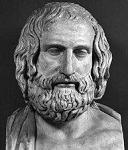
About 464 B.C.E. Ionian-born Greek philosopher Anaxagoras of Clazomenai (-510 to -428) settles in Athens, bringing philosophy to it, becoming the teacher of Socrates, and the first to explain that the Moon shines due to reflected sunlight, that it has mountains, and might be inhabited; he rejects Empedocles' 4-element theory in favor of an infinite number of unique particles making up all objects, and introduces the cosmological concept of Nous (mind); proves that the Sun is matter not a divinity, going on to attempt scientific explanations of natural phenomena incl. eclipses, meteors, rainbows, the Sun (a mass of blazing metal larger than the Peloponnese), heavenly bodies (masses of stone torn from Earth and ignited by rapid rotation, too far away to feel their heat), and the Earth (flat, floating on "strong air", whose disturbances cause earthquakes); too bad, in -450 he is charged with impiety and forced into exile in Lampsacus in Troad in NW Anatolia despite his student Pericles speaking in his defense.
In 463 B.C.E. Cimon of Athens crushes Thasos, then returns to Athens, where he is charged by Ephialtes (d. -461), head of the popular party (dem. opposition) with taking a bribe from Alexander I Philhellene of Macedon, but is acquitted.
In 463 B.C.E. Artaxerxes I meets with Themistocles, and grants him sanctuary in Persia with honors, making him gov. of Magnesia.
In 463 B.C.E. a series of conflicts leaves the mercenaries of the deposed Sicilian tyrants in possession of Messana (formerly Zancle).
In 462 B.C.E. Ephialtes is elected ruler of Athens.
In 462 B.C.E. Cimon leads an Athenian force to the Peloponnesus to help the Spartans against the Messenian helot rebels, but Sparta mistrusts their intentions and sends them home, insulting Athens and ending their alliance.
In 462 B.C.E. Megara gets into a border war with Corinth, and appeals to Sparta for aid, but is rebuffed, causing the Megarians to ally with Athens; Athens makes hay while the sun shines and soon makes alliances with Thessaly and Argos.


In 461 B.C.E. Cimon is blamed for the Spartan insult of -462 and is ostracized, and Ephialtes gets the assembly to deprive the Areopagus council of all powers except jurisdiction in homicide cases, and divides the 6K-member popular court (heliaea) into juries of 201 or more; Ephialtes is then murdered by political opponents, and pointy-headed Pericles (-495 to -429) replaces him as head of the popular party, and is elected ruler of Athens, becoming the peoples' choice for the next 30 years, with his non-Athenian wife Aspasia by his side, launching the Age of Pericles; Pericles appoints sculptor-architect Phidias (Pheidias) (-480 to -430). as his gen. supt. of public works for Athens, commissioning him to erect splendid statues and bldgs., incl. the Propylaea, Parthenon, Statue of Zeus, and gold-ivory Statue of Athena Parthenos.
In 461 B.C.E. the Messenian stronghold of Mt. Ithome falls, ending their revolt (begun -465).
In 460 B.C.E. the First Peloponnesian War (ends -445) begins between the Athenians and the Peloponnesians, who are pissed-off by pointy-headed Athens' alliance with Megara and Argos; meanwhile Athens sends a fleet of 200 ships to Egypt to aid its revolt against the Persians, defeating a Persian fleet on the Nile River and sieging the Persian army in the citadel of Memphis.
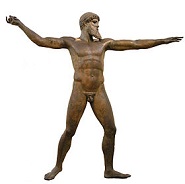
About 460 B.C.E. the lifesize bronze Poseidon (Zeus) of Cape Artemision is sculpted, showing the Greek god hurling his trident or his thunderbolt at the east (Persians).
In 459 B.C.E. the Athenians defeat the combined forces of Corinth and Epidaurus at the Battle of Halieis, and win a V at the naval Battle of Cecryphaleia in the Saronic Gulf between Aegina and the coast of Epidaurus.
In 458 B.C.E. Aegina joins the Peloponnesian alliance against Athens, but their combined fleet is defeated at the Battle of Aegina; Athenian cmdr. Leosthenes lands on the island of Aegina and sieges it, causing the Corinthians to invade Attica in an attempt to make them raise the seige, but are defeated by a reserve force (home guard) of old men and boys under Myronides, then a 2nd Corinthian force is surrounded and annihilated in the Megarid. Pleistarchus dies, and Pausanias' son Pleistoanax (d. -409) becomes Agiad king of Sparta (until -409).
In 458 B.C.E. Aeschylus debuts the trilogy Oresteia (only ancient Greek theater trilogy to survive to modern times), which incl. Agamemnon, The Libation Bearers, and The Eumenides; how Trojan War CIC Agamemon, son of King Atreus of Mycenae has his daughter Iphigenia sacrified at Aulis to secure the favor of the gods for his voyage to kick Troy's butt after Prince Paris kidnaps Helen, wife of Menelaus; on his return his wife Clytemnestra and son Aegisthus murder him, and Clyt boasts that she would enjoy drinking a toast with her hubby's blood, causing his children Orestes and Electra to avenge him (Electra recognizes her long-lost brother Orestes by the fact that their footprints match); meanwhile witch Cassandra, daughter of Trojan king Priam spins her web in the wings?
In 457 B.C.E. Aegina surrenders and turns its fleet over to the Athenians and joins the Delian League, causing the Spartans to enter the war and send an army across the Gulf of Corinth, restoring the Boeotian League under Theban hegemony; they defeat the Athenians at the Battle of Tanagra, but then screw up and return home, leaving the Athenians free to defeat the Boeotians at the Battle of Oenophyta, destroying the Boeotian League (until -447) and enrolling all Boeotian cities except Thebes in the Devilish, er, Delian League; Phocis (home of Delphi) (the Parnassus Mt. region W of Boeotia and N of the Gulf of Corinth) and Locris Opuntia (Opuntian Locrus, N of Phocis) also join; Pericles brings a Golden Age to Atheist-Free Athens, making the propertied hoplite zeugitai class eligible for the office of archon, and later the propertyless non-military thetes class; 25% of the 400K pop. are slaves; 20K slaves work in the silver mines of Laureion; Anaxagoras of Milegus becomes Pericles' teacher. The Long Walls (begun -461) connecting Athens and Piraeus are finished (demolished in -404).
In 456 B.C.E. a Persian force under Gen. Megabyzus defeats the Athenians at the citadel of Memphis in Egypt, causing them to retreat to the island of Prosopitis in the Nile Valley, then get sieged in turn.
In 455 B.C.E. Athenian gen. Tolmides talks the govt. into giving him a fleet with 4K soldiers to cruise around the Peloponnesus, and he raids the coast and burns the Spartan naval base at Gytheum (Gytheion) (Gytheio), in Laconia then recruits Achaea into the Delian League.

In 455 B.C.E. Euripides (-480 to -406) debuts his first play Peliades (The Daughters of Pelias), which fails to win the Dionysia.

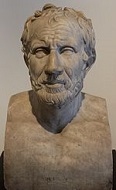
In 454 B.C.E. the Athenians holed-up on Prosipitis in Egypt are defeated after an 18-mo. siege, with all but a few killed or captured; a relief expedition of 50 ships is destroyed, causing the treasury of the Delian League to be moved from Delos to Athens; the revolt of the Egyptians, aided by the Athenians is put down by the Persians. Pericles becomes strategos (military commander) of Athens, and leads a force which lands in Sicyon and defeats the Sicyonians; he is then joined by the Achaean League, and unsuccessfully tries to take Oeniadea on the Corinthian Gulf, then returns to Athens. Alexander I dies, and Perdiccas (Perdikkas) (Perdica) II (d. -413) becomes king of Macedonia (-448 to -413)?. The Sicels under Ducetius (d. -440) defeat the mercenaries controlling Messana, and establish the federal capital of a Sicel state at Menaenum, which later moves to Palice. Greek epic poet Panyassis (Panyasis) of Halicarnassus is executed in the Persian Doric colony of Halicarnassus in SW Asia Minor by the tyrant Lygdamis II for conspiracy, causing his 20-something nephew Herodotus to flee into exile to the Greek island of Samos, under Athenian control.
In 453 B.C.E. the towns of Segesta and Halicyae in Sicily start a war with Selinus (Selinunte) in SW Sicily, then ask Athens for an alliance, which they grant.
In 451 B.C.E. Cimon returns to Athens after 3 years of exile, and negotiates a 5-year truce with Sparta; Argos loses Athenian protection and is forced to make a 30-year peace with Sparta. In Athens jurors (dicasts) in the popular courts are issued compensation, allowing poor citizens to serve. Pericles passes a law limiting the right to vote to those who can trace their Athenian lineage through both parents (repealed in -429, reenacted in -403).
About 450 B.C.E. Greek materialist (atomist) philosopher ("everything is driven by necessity") Leucippus flourishes, becoming the teacher of Democritus of Abdera, uttering the immortal soundbyte: "Everything is driven by necessity."
About 450 B.C.E. the Temple of Apollo Epicurius is built in Bassae (Gr. "little vale in the rocks") in Arcadia in NE Messenia, Greece.

About 450 B.C.E. Greek philosopher (Parmenides of Elea's pupil) Zeno the Dialectician of Elea (-495 to -435) from Elea (Velia), Italy formulates his mathematical Zeno's Paradoxes, becoming the first to use the reductio ad absurdum argument.
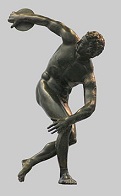
About 450 B.C. the bronze sculpture The Discobulus (Gr. "discus thrower") is finished by Greek sculptor Myron of Eleutherae, becoming famous and spawning Roman copies, which is good since the original is lost; in 1781 the Discobulus Palombara, a 1st cent. C.E. copy is discovered on the Esquiline Hill in Rome; in 1937 it is acquired for 5M lire by Adolf Hitler, who displays it in the Glyptothek in Munich, Germany until the end of WWII, after which it is returned in 1948; in 1790 another copy is discovered in Hadrian's Villa.
In 449 B.C.E. Cimon dies of disease during the siege of Citium, and the Athenians run low on supplies and return home. The Second Sacred War (ends -448) begins when Sparta takes Delphi from Phocis and makes it independent, causing Athens to intervene. The Delian League led by Athens and Persia sign the the Peace of Callias; the Persians give up the coast of Asia Minor in return for an Athenian promise not to invade Persian territory, ending the Persian Wars (begun -500) - I'm happy with who I am?
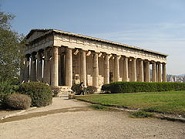
In 449 B.C.E. the Doric Temple of Theseus (Theseion) (Theseum) on the NW end of the Agora in Athens on the Agoraios Kolonos Hill is begun (finished -415), later becoming the Temple of Hephaestus, and suviving to modern times.
In 448 B.C.E. Athens takes Delphi from the Spartans and restores it to the Phocians, ending the Second Sacred War (begun -449). The rebuilding of the Acropolis (destroyed in -480) begins (ends -433).


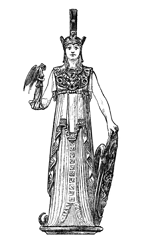
I should have known better with a girl like you? In 447 B.C.E. the Doric Parthenon (Gr. "virgin's apartment") temple of Athena on the Acropolis in Athens is begun (finished in -438), designed by Greek architects Ictinus (Iktinos) and Callicrates (Kallicrates), with sculpture by Phidias (Pheidias) (-480 to -430), who begins the Athena Parthenos (Athena the Virgin) chryselephantine (gold-ivory) sculpture housed in the Parthenon; uses fine marble from Mt. Pentelikon (Pentelikón) in Attica NE of Athens; below the Acropolis are a number of sacred caverns, incl. the seat of the Cumaean Sibyl.
In 447 B.C.E. Boeotia revolts from the Delian League, and the Athenians send an inadequate force, which is crushed at the First Battle of Coronea (2nd in -394); the Boeotian League is reestablished with a federal assembly based on proportional city rep., and oligarchies are set up in all Boeotian cities; Phocis and Locris also quit the Deleterious Delian League.
In 447 B.C.E. Herodotus settles in Athens after lengthy travels around Greece and Asia Minor, incl. Aegina, Cerigo, Crete, Cyprus, Delos, Paros, Rhodes, Samothrace, Thasos, Persia (Sardis to Susa), the W shore of the Black Sea to the mouth of the Dnieper River, Thrace, Scythia and Egypt, giving public readings of his in-progress historical works which wow the white is right Greek brain men, esp. poet Sophocles (-496 to -406), who becomes his friend.

In 446 B.C.E. Euboea revolts, and an Athenian army led by Pericles sets out to put it down, but is forced to return after a Peloponnesian invasion of the Megarid begins, driving out the Athenian garrison; the Peloponnesians reach Eleusus but withdraw after coming to terms with the Athenians, allowing Pericles to cross back to Euboea, put down the revolt, and establish a cleruchy in Histaiaea. In the fall Athens receives a free gift of grain from Egypt, and revises its citizenship rolls, removing 5K names. In Dec. after Athens finally recognizes the growing power of Sparta, the Athenians and Spartans conclude a Thirty Years' Peace, with Athens giving up political power over the states on the Greek mainland in exchange for Sparta recognizing the Athenian empire; Megara is returned to the Peloponnesian League; Troezen and Achaea become independent; Aegina becomes autonomous but also a tributary to Athens, with disputes to be settled by arbitration. Ducetius returns to Sicily.
In 446 B.C.E. Pericles founds an Athenian colony at Thourioi (Thurii) (Thurium) in Magna Grecia upriver from the former Sybaris in Magna Graecia (S Italy), and stocks it with colonists from all over Greece, incl. Greek historyscoper Herodotus, who spends the last 20 years of his life there reminiscing about his extensive travels and writing his history; Sicilian-born Greek eclectic vegetarian philosopher (last to write in verse) Empedocles of Acragas (Agrigentum) (-490 to -430) visits Pericles' new Athenian colony, going on to establish the four elements (roots) incl. Fire (Zeus), Air (Hera), Water (Nestis), and Earth (Aidoneus), which are brought into union and parted by the divine powers of Love and Strife; they started in an original pure state in a sphere; he claims that light streams out of our eyes and touches objects, and believes in the transmigration of the soul; he commits suicide by throwing himself into the active volcano at Mount Etna in Sicily to make his disciples believe that he is immortal.
Early in 445 B.C.E. the 30-year truce between Athens and Sparta is finalized; anti-Spartan forces attempt to get Pericles ostracized, but he turns the tables and gets opposition leader Thucydides, son of Melesias ostracized instead, and basks in his own sunlight while sponsoring great building and cultural programs equal to his high high crown. Syracuse and Acragas fight over the division of territory from the former Sicel federation, and Syracuse wins, becoming the top dog in sizzling Sicily.
In 443 B.C.E. Rhegium, Leontini, Catana, and Naxos ally with Athens as a counterweight to Syracuse.
In 441 B.C.E. Miletus and Samos go to war, and Miletus appeals for aid to the Athenians, who intervene and replace the oligarchy in Samos with a democracy.

In 441 B.C.E. 40-y.-o. Euripides (-480 to -406) wins the Athenian (Attic) prize for drama after 14 years of trying; he wins again only 4x - that really rips me up to my knees?

In 440 B.C.E. the Temple of Poseidon in Cape Sounion S of Athens is completed.

About 440 B.C.E. Abdera, Thrace-born Greek philosopher (Democritus' pupil) Protagoras of Abdera (-490 to -420) becomes the first Sophist (Gr. "sophistes" = one who does wisdom), with the immortal soundbyte: "Man is the measure of all things: of things which are, that they are, and of things which are not, that they are not"; their practice of charging young nobles for education in wisdom pisses-off Socrates, who calls them specious or deceptive.
About 440 B.C.E. Sophocles writes the satyr play Ichneutae (Searching Satyrs), and Antigone; too bad he didn't write one for her sister Ismene?
In 439 B.C.E. Lucius Quinctius Cincinnatus becomes dictator of Rome for a 2nd time (first in -458).
In 439 B.C.E. Athens takes Samos, razes its walls and confiscates its fleet, leaving Chios and Lesbos as its only allies in the Delian League who can contribute ships.
In 438 B.C.E. Spartacus of Thrace overthrows the Archaenactidae Dynasty (founded -480) and founds the Kingdom of the Cimmerian Bosporus (Bosporan Kingdom) (ends 370 C.E.) in E Crimea and the Taman Peninsula on the shores of the Kerch Strait, ruled by the Spartocid Dynasty (ends -110).

In 438 B.C.E. the Parthenon (begun -447) on the Athenian Acropolis, dedicated to Athena Parthenos is completed; the statue of Athena by Phidias (Pheidias) (-480 to -430) is dedicated; there are few straight lines, all the steps are of different sizes, and the distance between each of the Doric (baseless) columns in the peristyle varies, all to give an illusion of strict balance.
In 437 B.C.E. the Athenians found the city of Amphipolis in E Thrace (home of the ancient Edoni people), controlling the mines of Mt. Pangaeus.
In 437 B.C.E. Pericles leads an expedition into the Euxine and establishes good relations with Panticapaeum (modern-day Kerch) on Mount Mithridates in the Tauric Chersonese (founded -600), a source of grain.
In 437 B.C.E. Athenian strategos Phormio makes an alliance with the Acarnanians in the Gulf of Corinth.

In 437 B.C.E. the Propylaea (Propylea) (Propylaia) (Gr. "pro" + "pyle" = before the gates) monumental gateway to the Acropolis is begun by Mnesicles (Mnesikles), who quits in -432 before it is finished.

About 436 B.C.E. Greek sculptor Agoracritus (Agorakritos) (born on Paros) becomes the favorite pupil of Phidias, their work later being confused; he sculpts the colossal Nemesis of Rhamnus, starting with a statue of Aphrodite which loses a contest with rival Alcamenes.
In 435 B.C.E. the Corinthian-Corcyrean War (ends -432) begins when Corcyra (Corfu) in NW Greece objects to Corinthian interference with their joint colony of Epidamnos (Epidamnus) (founded -627) (later Dyrrachium) (modern-day Durazzo or Durrës or Durres on the Albanian coast 30km W of Tirana), and calls on Athens for help after an initial V against the more powerful state only makes them madder.
In 435 B.C.E. the Statue of Zeus at Elis is completed by the sculptor Phidias (Pheidias) (-480 to -430).
In 433 B.C.E. Pericles concludes a defensive alliance with Corcyra, and renews alliances with Rhegium and Leontini in the W; meanwhile Corinth, Megara, and Aegina appeal to Sparta to take arms against Athens.
In spring 432 B.C.E. the Corinthian colony (a subject of Athens) of Potidaea in the Chalcidice (founded in -600) revolts against Athens, backed by the Peloponnesian League, causing Athens to pass the Megarian Decree excluding Megarian merchants from Athenian harbors and markets; Megara, Corinth and Aegina pressure Sparta, and the ephor Sthenelaidas convinces the assembly over King Archidamus II' opposition to declare the Thirty Years' Peace broken, and declare war against Athens, causing fruitless negotiations with Athens all winter, and beginning the First Peloponnesian War between (ends -404); barefoot philosopher Socrates serves as an infantryman with conspicuous bravery at Potidaea, and saves Pericles' nephew Alcibiades.
On June 27, 432 B.C.E. the summer solstice (New Year) is observed in Athens by Meton of Athens, who on July 13 introduces the Metonic Cycle for intercalation, based on the observed period of 19 tropical years being equal to 235 synodic months (6,940 days), which becomes the basis for the 19-year cycle of the Hebrew calendar.


In Apr. 431 B.C.E. a fifth column of 300 Thebans unsuccessfully attacks Plataea, the only pro-Athenian city in Boeotia, with the Plataeans taking 180 POWs and putting them to death, after which Athens supports Plataea and Sparta supports Thebes, enlisting the help of the Greek cities in Sicily and Italy, while both sides appeal to Persia for help in vain; making use of accusing the Athenians of crowing about saving Greece at the Naval Battle of Salamis while increasingly imposing an extortion racket, Archidamus II of Sparta gains support by calling for the liberation of the Hellenes from Athenian despotism, launching the Second Pelopponesian War (ends -404); the Spartan war strategy is to burn the fields of Attica to lure the Athenians into a land battle, while Pericles' strategy is to sit it out in Athens, protected from starvation by the Long Walls connecting them with the port of Piraeus, and wear out the Spartans with naval raids, replacing the pop. of Aegina Island with Athenians; after 30 years of Pericles, famous adm.-gen. Phormio is elected ruler of Athens when an expedition under Pericles' command fails, and Cleon seizes on it to prosecute him, and Plutarch accuses Pericles of starting the war to revive his fading popularity, causing Pericles to be suspended from command and fined; Spartan gen. Brasidas (d. -422) first distinguishes himself by courage shown relieving the seaport town of Methoni (Methone) in Pieria from a hostile attack - his ass is made of brass? Greek Athenian gen. Thucydides begins writing "History of the Peloponnesian War"; on Aug. 3 "At last all was ready, and they were on the point of sailing away, when an eclipse of the Moon, which was then at the full, took place" (total solar eclipse) (Thucydides); he records another eclipse seven years later on Mar. 21, -424, and a 3rd eclipse 11 years after that on Aug. 27, -413; in 1907 C.E. Russian mathematician Nikolai Alexandrovich Morozov (1854-1946) claims that the first eclipse occurred on Aug. 2, 1133 C.E., and Russian mathematician Anatoly Fomenko (1945-) uses this to back his claim that all of ancient chronology is moose hockey, and that Jesus Christ was born in the 12th cent. C.E. - TLW needs to create an All New Revised Historyscope, yikes, he hopes not? On June 18 after Rome declares war on the pesky Aequi from the E and Volsci from the W, and the consuls can't agree on a dictator, and consul Titus Quinctius Cincinnatus Pennus nominates his father-in-law Aulus Postumius Tubertus, the Romans decisively defeat them at the Second Battle of Algidus Pass (first in -458), becoming the last major battle with the Aequi, after which Postumius receives a triumph; too bad, Postumius' son is so eager to attack that he abandons his post, causing daddy to have him put to death - that was my favorite dog? Empedocles propounds the theory that the Universe consists of four elements: earth, fire, air, and water, which are ruled by the forces of attraction (love) and repulsion (strife), and that human body has four humors (humours): blood, bile, black bile and phlegm - no good humor?
In 430 B.C.E. Pericles is reelected ruler of Athens; the first known visitation of plague (smallpox?) (scarlet fever?) breaks out in overcrowded Athens after entering through the port of Piraeus, killing 25% of the pop., spreading to the army besieging Potidaea; Pericles' eldest son dies, followed by his sister and another son; in Aug. Pericles sends a peace mission to Sparta without success; he gives the Funeral Oration for all the Athenians killed during the first year of the Peloponnesian War, becoming a classic defense of Greek democratic ideals, incl. the value of free discussion as a condition for a wise action (the most eloquent oration in human history?); late in the year Potidaea falls to Athens.
In 430 B.C.E. young Tharrhypas (d. -392) (ancestor of Alexander III the Great) becomes king of Epirus, introducing Athenian culture to the Molossians.
About 430 B.C.E. Greek Pythagorean philosopher Philolaus of Croton (-480 to -385) of Croton in Magna Grecia (S Italy) gets the credit for originating the theory that the Earth is not the center of the Universe; he claims that humans have immortal souls which are imprisoned as a punishment for bad behavior during life.
In Sept. 429 B.C.E. after one-third to two-thirds of the pop. of Athens dies of the plague while orgying free at last from fear of the gods, Pericles (b. -495) dies of the plague., and Cleon (Gr. "renowned") (-475 to -422) is elected ruler of Athens; Socrates shows more bravery at Potidaea. In the fall Phormio wins naval battles against two Peloponnesians fleets at the Battle of Chalcis and the Battle of Naupactus.
In June 428 B.C.E. Mytilene, chief city of Lesbos revolts against Athens.
In 428 B.C.E. Euripides debuts his play Hippolytus in the Dionysia; Hippolytus, son of the Amazon Hippolyta after her rape by King Theseus of Athens agonizes over the conflict between asceticism and sexual desire, swearing chastity and honoring Artemis instead of Aphrodite, who gets even by inspiring his stepmother Phaedra to fall in love with him, causing her to starve herself to die with honor.
In July 427 B.C.E. after Spartan adm. Alcidas helps the Lesbos rebels but flees at the sight of Athenian warships, Lesbos goes down, er, falls.
In 427 B.C.E. Archidamus II dies, and his son Agis II (d. -401) becomes Eurypontid king #18 of Sparta; the Spartans score their first V with the capture of Plataea.
In 427 B.C.E. war breaks out in Sicily (ends -424), with Syracuse, Gela, Messana, Himera, Lipara and Locri vs. Naxos, Catana, Leontini, Rhegium, Camarina and the Sicels; Gorgias of Leontini goes to Athens to appeal for aid, which is granted.

In 427 B.C.E. new Athenian playwright Aristophanes (-448 to -380) takes 2nd place in the Theater of Dionysus with his first play The Banqueters.
In June 426 B.C.E. after Athenian gen. Demosthenes (d. -413) and the demagogue Cleon revitalize Athen's military, and rich merchant Nicias (d. -413) turns gen. and leads a middle class revolt against them, Demosthenes raises an army in Acarnania while Nicias invades Thebes by way of Tanagra (suggesting a great Star Trek episode idea?); Demosthenes is ambushed by Aetolian natives and escapes to Naupactus, defending it from Spartans sent from Delphi under Eyrylochus; Demosthenes then defeats the Spartans at Olpae and Idomene, returning in triumph to Athens; Messina (Messana), lost since -493 is retaken by the Ionians under Nicias.
In 426 B.C.E. the democratic faction of Corfu massacres Spartan supporters and secures the island for Athens.
In 425 B.C.E. Demosthenes captures Pylos (modern-day Navarino) on the W coast of the Peloponnesus on the Coryphasium promontory at the N entrance to Pylos Bay (home of legendary heroes Neleus and his son Nestor), then after reinforcements under Cleon arrive, he defeats the Spartans at the naval Battle of Pylos (Navarino Bay) in Messenia, then sphincters, er, cuts off a stranded Spartan force on the neighboring island of Sphacteria (modern-day Sphagia) at the Battle of Sphacteria; 120 Spartan hostages are held to prevent another invasion of Attica, and the Spartans sue for peace, but Cleon gets the assembly to reject the overtures despite opposition by Nicias.
In 425 B.C.E. Aristophanes debuts The Achamians, a plea to end the war.
In 425 B.C.E. Euripides debuts Hecuba.

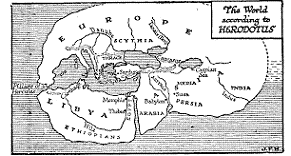
In 425 B.C.E. Greek historian Herodotus (b. -484) dies in Thurii (Thurium), Magna Graecia (S Italy) (Pella, Macedon?), leaving the first-ever The Histories (History) (Gr. "investigations") (earliest example of Greek/Euro prose to survive to modern times); "I, Herodotus of Halicarnassus am here setting forth my history, that time may not draw the color from what man has brought into being, nor those great and wonderful deeds, manifested by both Greeks and barbarians fail of their report, and, together with all this, the reason why they fought one another" (first line); "The only good is knowledge, the only evil is ignorance"; "Very few things happen at the right time, and the rest do not happen at all. The conscientious historian will correct these defects"; "Of old the Hellenic race was marked off from the barbarian as more keen-witted and more free from nonsense."
On Mar. 21, 424 B.C.E. there is a solar eclipse visible in Greece?
In summer 424 B.C.E. aristocrat Hermocrates of Syracuse persuades the warring cities of Sicily to make peace at the Congress of Gela, ending the Sicilian War (begun -427).
In 424 B.C.E. the Athenians under Nicias capture the island of Cythera off the coast of Laconia, then send an army to aid a democratic revolt in Megara, but Spartan Gen. Brasidas outmaneuvers them and relieves the city, and Megara remains a Peloponnesian ally; Brasidias then leads a small force overland to Thrace and whips up a revolt of Athenian allies there and in Macedonia, displaying great diplomacy and eloquence, then marches to Chalcidice, offering protection to cities rebelling against Athens, causing the Athenians to invade Boeotia, but Theban gen. Pagondas of Thebes crushes them at the watershed Battle of Delium (Delion), where Socrates again shows his bravery; Amphipolis in Thrace surrenders to Brasidas, and a force from the N under Thucydides arrives too late; Cleon exiles Thucydides for 20 years; the battle inspires a tragedy by Euripedes and through survivor Socrates alters the direction of Western philosophy?
In 424 B.C.E. Aristophanes debuts play #4 The Knights, a satire of populist hawk Cleon during the Peloponnesian War; carries out his promise in "The Acharians" to get revenge on Cleon for prosecuting him for slandering the polis, winning first prize at the Lenaia Festival.
In 424 B.C.E. Euripides debuts Andromache and Hecuba.
In 424 Sophocles debuts Oedipus Rex, about King Oedipus ("swollen foot") of Thebes and his sister-wife Jocasta, sisters-daughters Antigone and Ismene, sons-brothers Polynices and Eteocles, brother-in-law Creon, and blind soothsayer Tiresias; the son of King Polybos from Corinth solves the riddle of the sphinx, kills Laios and marries Jocasta, becoming king of Thebes; after his daddy dies and he becomes king of Corinth too, he finds out that Laios was his real daddy and Jocasta his sister, and she freaks and commits hari-kari, while he freaks, gouges out his own eyes and goes into exile; Aristotle later calls it the best drama of all time.

In spring 423 B.C.E. Sogdianus is slain by Artaxerxes I's bastard son Darius II Ochus (Nothus) (the Bastard) (d. -404), whose mother was a Babylonian concubine; his wife and half-sister Parysatis manipulating him, he sides with Sparta in the Peloponnesian War to regain some Greek cities in Asia Minor; is he the Darius referred to in Nehemiah 12:22?
In Apr. 423 B.C.E. the 1-year Truce of Laches is concluded between Athens and Sparta, but Spartan Gen. Brasidas ignores it and takes Scione and Mende in Thrace, causing the Athenians to break off peace neogiations and Nicias to retake Mende.
In 423 B.C.E. Aristophanes debuts his play The Acharnians (which satirizes Euripides), and his play The Clouds, which portrays Socrates as running a "thinking shop" where he teaches young men to make bad reasoning appear good, which is later used against him at his trial.
In 423 B.C.E. Euripides debuts his play The Cyclops, based on Homer's "The Odyssey" Bk. 9, becoming his only satyr play to survive to modern times.
In 423 B.C.E. Sophocles debuts his play The Trachiniae.
In 422 B.C.E. Spartan Gen. Brasidas leads a handful of helots and mercenaries against the Athenian army under Cleon at the Battle of Amphipolis and captures the city, although both generals are KIA; the main obstacles to peace are now dead; Socrates shows bravery yet again before returning to Athens to talk youths' heads off?; Thucydides later harps on Brasidas' eloquence, so unusual for a Spartan, and Plato compares him to Achilles.
In 422 B.C.E. Aristophanes debuts his play The Wasps.
In Mar. 421 B.C.E. the Peace of Nicias between Athens and Sparta is signed, pledging to defend each other for 50 years; too bad it doesn't work out.

In 421 B.C.E. the Ionian-style Erechtheum (Erechtheion), dedicated to the god Erechtheus on the N side of the Acropolis of Athens is begun (finished -405), featuring the Caryatid Porch (Porch of the Maidens), becoming the first known portal framed in stone instead of wood; it was supposed to have a W wing, but rival priests claim turf rights and stop it.
In July 420 B.C.E. after Boeotia refuses to accept the Peace of Nicias and leaves the Peloponnesian League, along with Elis, Mantinea, Corinth, and Argos, they form the Quadruple Alliance, which Corinth soon leaves; in July Alcibiades engineers an anti-Spartan alliance with the remaining three members of the Quadruple Alliance (Argos, Mantinea, Elis), and they all go to war with Sparta.

In 420 B.C.E. Pericles' has-it-all (looks, brains, charm, family) nephew Alcibiades (-450 to -404) is elected ruler of Athens.

About 420 B.C.E. Cumae is conquered by the Oscans using the gastraphetes (Gr. "belly bow"), a winched crossbow machine capable of throwing two arrows at the same time, invented by Pythagorean engineer Zopyrus of Tarentum; they go on to eradicate its Greek identity - easy cumae, easy osco?
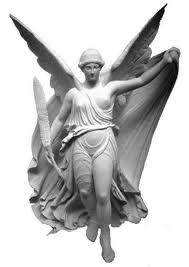
About 420 B.C.E. Thracian sculptor Paionios (Paeonius) of Mende in Chalkidiki sculpts the Nike (Gr. "Winged Victory") of Paeonius; it is excavated in 1875 C.E.

About 420 B.C.E. after using his large inheritance to travel the known world incl. Egypt, Asia, India, and Ethiopia, Abdera, Thrace-born Greek philosopher (Leucippus' pupil) ("Father of Modern Science") ("the Laughing Philosopher") ("the Mocker") Democritus (Gr. "chosen of the people") of Abdera (-460 to -370) (b. -470?) pioneers the concept of atomic structure by contrasting the Intellect and the Senses: "Apparently there is color, apparently sweetness, apparently bitterness, actually there are only atoms and the void"; "Poor Intellect, do you hope to defeat us, while from us you borrow your evidence? Your victory is in fact your defeat."
In 419 B.C.E. the Argive War (ends -418) begins when Alcibiades puts the Argives up to attacking Epidaurus, and Lacedaemon's whole army marches toward the frontier city of Leuctra as a diversion.
In 419 B.C.E. Euripides debuts his play Andromache.
In 419 B.C.E. Sophocles debuts his play Electra.
In summer 418 B.C.E. while the Argives are attacking the Epidaurians, the Lacedaemonians and some allies under the command of Agis invade Argolis, but are intercepted and stopped by Agis II of Sparta, and gets their gens. Thrasyllus and Alciphron to sign a 4-mo. truce; too bad, as Agis II returns the Argives capture Orchomenus, and the Spartans get pissed-off that he didn't capture Argos, and appoint a 10-man council to decide whether he can lead a new attack, which they soon do after receiving a plea from the Spartans in Tegea; in Aug. after Athenian gen. Alcibiades leads a Quadruple Alliance force to help Argos, they are all decisively beaten by the Spartans under Agis II at the First Battle of Mantinea, ending the Argive War (begun -419) and restoring Spartan hegemony; the Athenians are turned back at Chalcidice.
In 417 B.C.E. Athenian demagogue Hyperbolus (d. -411) is ostracized after the vote was supposed to decide between Nicias and Alcibiades, but they combine forces against him, causing the whole system to be junked - genius?
In 416 B.C.E. Selinus of Sicily calls for Athenian assistance in his war against Segesa, causing Alcibiades to propose an expedition to crush Sicily, Syracuse, and Carthage, which the assembly approves over Nicias' objections, with the soundbyte: "We shall not trouble you with specious pretenses... Since you know as well as we do that right, as the world goes, is only in question between equals in power, while the strong do what they can and the weak suffer what they must", after which the Athenians massacre the male pop. of Milos (Melos) and sell their wives and children into slavery for daring to remain neutral.
In 416 B.C.E. Euripides debuts his play Heracles.
In 415 B.C.E. the Sicilian Expedition, led by Alcibiades, Nicias, and Lamachus arrives in Sicily, but Alcibiades is accused of mutilating the Herms (sacred pillars) a nd profaning the Eleusinian mysteries, and ordered to return to Athens, where he doesn't like the justice he's getting and ends up going over to the Spartans; Athens attacks Sicily, and wins a V in Syracuse (defended by Hermocrates) in Nov.; Athenian orator Andocides (-440 to -390) is implicated in the Herms affair and turns informer to save his life, accepting exile instead (until -403).
In 415 B.C.E. the Carthaginians recapture Messina from Athens.
In 415 B.C.E. Euripides debuts his play The Trojan Women.
In 414 B.C.E. Athenian efforts to conquer Syracuse bog down when a small Spartan force under Gen. Gylippus comes to their aid and takes the heights of Epipolae, preventing an Athenian circumvallation.
In 414 B.C.E. the Spartans invade Argos, and an Athenian fleet supporting them raids the coast of Laconia.
In 414 B.C.E. Aristophanes debuts his play The Birds, and writes the play Electra.
In 414 B.C.E. Euripides debuts his play Ion; he also debuts the play Electra; he also debuts his play Iphigenia in Tauris (Iphigenia among the Taurins), set in the Chersonesus Taurica (Crim Tartary) peninsula N of the Hellespont, inhabited by the savage Tauri; Agamemnon offends Artemis, causing her to detain the Greek fleet sailing for Troy at Aulis, and the seer Calchas tells him to sacrifice his daughter Iphigenia, but Artemis relents and substitutes a hind on the altar, carrying her away in a cloud to Tauris, making her a priestess required to sacrifice all strangers, but when her brother Orestes arrives, she flees with him, carrying a sacred wooden Artemis statue, which Sparta later claims to have; she is finally transformed into the goddess Hecate.
In 413 B.C.E. Nicias is elected ruler of Athens, and sends reinforcements under Gen. Demosthenes to Sicily, while Syracuse receives aid from Sparta, Corinth, and Boeotia; the Athenians assaulting the heights of Epipolae begin to crack, and just as they are about to board an armada of 73 vessels to retreat, a lunar eclipse on the night of Aug. 27 causes soothsayers to counsel Nicias to hold firm, which he does, and the assinine Athenians are massacred and their fleet destroyed in Sept. in the Battle of Assinarus (Syracuse), with 50K captured or KIA, incl. gens. Demosthenes and Nicias; the POWs are put to work in the mines; Alcibiades gets the Spartans to capture the Athenian fortress of Decelea (Dekeleia) (Tatoi) in N Attica, bringing Athenian agricultural to a virtual standstill.
In 413 B.C.E. Perdikkas II dies, and his son (by a slave woman) Archelaus I (-413 to -399) murders his uncle, cousin, and half-brother to become king of Macedonia (until -399), moving the court to Pella, building up its infantry, and encouraging Hellenization, inviting Euripides and other Greek artists; meanwhle the Athenian defeat at Syracuse that destroys most of their fleet puts him in a position to set the price of Macedonian timber, and after he supplies them all they want they become his friends and shower him with honors.
In 413 B.C.E. the Sicilian defeat causes the popular party in Athens to be thrown out, and Theramenes (-455 to -404) to be elected ruler of Athens; the College of Ten Deliberators (probouloi) replaces many of the functions of the Areopagus Council; a 5% harbor tariff replaces tribute among the Delian League allies; the Athenians use their last 1K talents to rebuild their lost fleet, but have to recruit green sailors; Rhodes breaks with Athens and its Delian League.
In 413 B.C.E. Donald Trump, er, Alcibiades negotiates the Treaty of Miletus between the Spartans and Persians, which recognizes the Persians' right to subjugate the Ionian cities in return for money to build a Peloponnesian fleet to use to harass Athenian grain shipments from Egypt and the Black Sea; the Spartans then turn on Alcibiades, causing him to flee to the court of Persian satrap Tissaphernes.
In 413 B.C.E. Ephesus revolts against Athens and sides with Sparta in the Peloponnesian War.
In 413 B.C.E. Euripides debuts his play Helen.
In 412 B.C.E. the Sicilian defeat causes the popular party in Athens to be thrown out, and Theramenes (-455 to -404) to be elected ruler of Athens; the College of Ten Deliberators (probouloi) replaces many of the functions of the Areopagus Council; a 5% harbor tariff replaces tribute among the Delian League allies; the Athenians use their last 1K talents to rebuild their lost fleet, but have to recruit green sailors; Rhodes breaks with Athens and its Delian League.
In 412 B.C.E. Donald Trump, er, Alcibiades negotiates the Treaty of Miletus between the Spartans and Persians, which recognizes the Persians' right to subjugate the Ionian cities in return for money to build a Peloponnesian fleet to use to harass Athenian grain shipments from Egypt and the Black Sea; the Spartans then turn on Alcibiades, causing him to flee to the court of Persian satrap Tissaphernes.
In 412 B.C.E. Ephesus revolts against Athens and sides with Sparta in the Peloponnesian War.
In 412 B.C.E. Euripides debuts his play Helen.
In July 411 B.C.E. after Alcibiades promises Persian support, the oligarchy of the Four Hundred led by Antiphon, Peisander, Theramenes, and Phrynicus overthrows the Athenian democracy; the Athenian fleet at Samos refuses to recognize the new govt.; the Peloponnesians attack Euboea, causing the oligarchy to send a small fleet, which is defeated, and the oligarchs attempt to hand Athens over to Sparta, causing them to be overthrown by Theramenes (-455 to -404), who establishes the Constitution of the Five Thousand; Alcibiades is returned to favor in Athens, and in Sept. leads the Athenians in a V over the Spartans in the naval Battle of Cynossema in the Thracian Chersonese (Galipoli Peninsula).
In 411 B.C.E. Aristophanes debuts his play Thesmophoriazusae (Gr. "Women Celebrating the Festival of the Thesmophoria) (The Poet and the Women), another satire of Euripides; he also debuts his play Lysistrata; the women try to end the Peloponnesian Wars by denying the men sex.
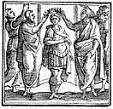
In 410 B.C.E. the Athenians under Alcibiades decisively win the naval Battle of Cyzicus against the Spartan navy and supporting Persian army, but the new demoagogue Cleophon (d. -404) muffs peace overtures; meanwhile, democracy is restored in good ole Athens, and Thrasybulus (Thrasybolus) (d. -389) and Thrasyllus (Thrasyllos) (d. -406) are elected rulers (strategoi). Nicocles dies, and his son Evagoras (d. -374), who had been exiled by the Phoenicians sneaks back in with 50 followers to become king of Salamis in Cyprus (until -374), going on to cultivate the friendship of Athens and Persia and extend his control to all of Cyprus.
In 410 B.C.E. Euripides debuts his play Phoenissae (The Phoenician Women).
In 409 B.C.E. an Athenian expedition under Thrasyllus captures Colophon in Lydia, and raids the Ionian countryside, but is defeated outside Ephesus by a combined force from Ephesus, Syracuse and Persia.
In 409 B.C.E. Sparta recovers Pylos, which falls into obscurity until -369.
In 409 B.C.E. Alcibiades recovers Byzantium from the Spartans under Clearchus (d. -401), and clears the Bosphorus for Athenian shipping.
In 409 B.C.E. seeing his chance with the mutual exhaustion of Athens and Syracuse, the Carthaginians under Hannibal Mago (d. -406) invade Sicily to avenge his grandfather Hamilcar, defeating the Sicilian Greeks, then capturing the cities of Selinus (modern-day Selinunte) and Himera, torturing and killing 3K POWs as revenge for his grandfather's defeat in the Battle of Himera in -480 before returning to Carthage with spoils.
In 409 B.C.E. the city of Rhodes on the island of Rhodes, designed by Greek urban planner ("the Father of European Urban Planning") Hippodamus of Miletus (-498 to -408) is built, based on the Hippodamian (Grid) Plan, becoming its 4th major town after Camirus (Kamiros), Lindus (Lindos), and Ialysus (Isalyssos).
In 408 B.C.E. the Carthaginians destroy the city of Himera in N Sicily.
In 408 B.C.E. Alcibiades returns to Athens in triumph after a 7-year absence, leading the religious procession to Eleusis to atone for his impiety in -415, and getting a promotion to CIC, after which he rejoins his fleet in Samos.
In 408 B.C.E. Pleistoanax dies, and his son Pausanias (d. -395) (king in -445 to -426) becomes Agiad king of Sparta (until -395); both Sparta and Athens court Darius II Persia, who decides to back Sparta, while his wife Parysatis talks him into appointing his younger son Cyrus the Younger (d. -401) (brother of Artaxerxes III) as satrap of all Asia Minor in place of Tissaphernes, who is reduced to satrap of Caria in the SW; Cyrus is sent with funds to Sardis to raise Persian support for Sparta; in the fall Spartan adm. Lysander arrives in Ephesus and begins rebuilding the Spartan fleet with help from Cyrus; too bad, Cyrus uses the opportunity to build his own personal mercenary army with rebellious idea in mind; a Panhellenic gathering is held in Olympia, at which Nihilist philosopher Gorgias (-483 to -378) speaks against the Spartan-Persian alliance.
In 408 B.C.E. a building material inventory in Greece mentions the wheelbarrow ("1-wheeler").
In 408 B.C.E. Euripides writes the plays The Phoenician Women, and Orestes; after they are both performed he gets pissed-off and leaves Athens for Magnesia, followed by the court of Archelaus I of Macedonia in Pella at his invitation.
In 407 B.C.E. Thrasybulus recaptures Abdera and Thasos on the coast of Thrace; meanwhile Alcibiades attempts to lure the Spartans out of Ephesus to do battle, but adm. Lysander doesn't bite; too bad, Alcibiades goes out searching for supplies, leaving behind his boyhood friend Antiochus in command of the Athenian fleet blockading the Spartan fleet in Ephesus, but the green Greek disobeys orders and tries to draw the Spartans led by new navarch (navy CIC) Lysander into battle with a decoy force, and loses the notable naval Battle of Notium (Ephesus) to them and a Persian force, causing Alcibiades to be stripped of command for being a bozo, causing him to leave Athens permanently, returning to his own land in the Thracian Chersonese.
In 407 B.C.E. exiled moderate dem. leader Hermocrates of Syracuse is KIA trying to force his way back into Syracuse, and the Carthaginians decide to conquer the Greek cities of Sicily.
In 406 B.C.E. Carthage invades Sicily and attacks Acragas (Akragas), but plague breaks out in their camp, killing Hannibal Mago, after which Himilco (d. -396) becomes CIC (until -397) and finishes capturing the city, followed by Gela, which is sacked and destroyed, then Camarina, whose survivors flee to Syracuse; too bad, the soldiers carry the plague back to Carthage after Hannibal Mago is killed by it. Conon and Cleophon are elected rulers of Athens; Callicratidas replaces Lysander as head of the Spartan fleet (navarch), which sieges Methymna on Lesbos (known for its excellent wine) to interrupt the Athenian grain supply; Lysander is made cmdr. in his place; the Athenians then lose the naval Battle of Mytilene to Sparta, after which the Spartans siege Mytilene until the Athenians raise another fleet under Conon and seven other strategoi and use new tactics to win the naval Battle of Arginusae near Canae E of Lesbos Island against Sparta under Callicratidas, after which at the instigation of Theremenes the Athenians put six of the eight gens. (incl. the son of Pericles) to death for not rescuing drowning sailors; a peace overture by Sparta is rejected by Cleophon, and Persian satrap Cyrus the Younger orders the Spartans to put Lysander in charge of another fleet in the Hellespont.
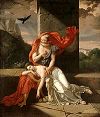
In 406 B.C.E. Greek dramatist Sophocles (b. -496) dies in Athens, leaving the play Oedipus at Colonus (his birthplace), which is produced by his grandson Sophocles in -401; same chars. Oedipus' son-brother King Polyneices of Argos, Creon's son Haemon, and King Thesus of Athens; old blind Oedipus comes to Colonus to be with the Furies (Eumenides) and his daughters when he dies, and is absolved by Zeus for his crimes first.
In 406 B.C.E Greek tragedian Euripides (b. -480) dies in Macedonia, leaving 92 plays (23 tetralogies), of which 17 tragedies and one satyr play ("Cyclops") survive to modern times: "Whom the gods would destroy, they first make mad."
In 405 B.C.E. The Romans seige the pesky Etruscan military fort of Veii just 10 mi. from Rome, the richest city of the Etruscan League.
I'll be right here, soldier? In 405 B.C.E. the Athenian fleet under Alcibiades follows the Spartan fleet under Lysander to the Hellespont, then attempts to warn the Athenian fleet under Conon at the mouth of the Aegospotami (Aegospotamos) River in Thrace (where it flows into the Hellespont) against a surprise attack, but are ignored, and the Athenian fleet is destroyed in Sept. in the naval Battle of Aegospotami in the Sea of Marmara, causing Conon to flee to Cyprus, all but ending the Peloponnesian War; Lysander then sails across the Aegean, replacing pro-Athenian democracies on allied islands with decarchies (oligarchies of ten) under a Spartan overseer (harmost), after which Spartan king Pausanias sieges Athens while Lysander's fleet blockades Piraeus, closing their grain route through the Hellespont to starve them out, causing Theramenes to lead an embassy for 3 mo. to negotiate terms of capitulation.
In 405 B.C.E. former govt. clerk Dionysius I (the Elder) (-430 to -367) becomes tyrant of Syracuse, and signs a treaty with plague-weakened Carthaginians under Hamilco leaving Carthage in control of most of W and S Sicily, then fortifies Syracuse with a wall, fortifies Epipolae, removes and/or enslaves Greek oligarchs from Naxos, Catana and Leontini, and confiscates their land to give it to his Sicilian and Italian mercenaries, and enfranchises the serfs to build up his army, with plans of ousting the Carthaginians completely.
In 405 B.C.E. Euripides' plays "The Bacchae" and "Iphigenia at Aulis" are posth. performed at the Dionysia festival, and win first prize.
In 405 B.C.E. Aristophanes debuts his plan The Frogs, which satirizes the late Euripides again; given an unprecedented 2nd performance plus a civic crown; the earliest literary mention of an inn, at which a group of men devour 16 loaves of bread, 20 meatballs, garlic, fish, and cheese, and then walk out without paying; the chorus of the frogs is "Brek-ek-ek-ex, ko-ax, ko-ax", which later becomes a cheer of Yale U. students.

On Apr. 25, 404 B.C.E. after pesky never-say-die Cleophon is tried and executed, the Peloponnesian War (begun -431) ends with the surrender of plague-stricken Athens, which has been starved into submission over the winter; Theramenes secures peace terms, allowing Athens to keep its independence while giving up all foreign possessions (which become subjects of the Persian Empire) and its bedraggled fleet, and becoming an ally of Sparta; the Long Walls (built -457) are torn down and burned to the accompaniment of Spartan flutes; the Spartans are now the rulers of Greece, having to wear shades their future is so bright?; the Athenian oligarchs, led by Critias and Theramenes and supported by the Spartans and Lysander set up a Commission of Thirty to devise a new constitution, but instead they seize power as the Thirty Tyrants (until -400), executing several citizens and suspending rights; Critias has Theramenes condemned to drink hemlock for treason; Alcibiades flees to Phrygia in NW Asia Minor under protection of Persian satrap Pharnabazus (d. -373), seeking help for Athens, then being assassinated by orders of Pharnabazus after the Spartans learn about it and tell him to; 3K of the richest citizens are enfranchised in name only, and many more are exiled or flee to Argos and Thebes; in the fall Thrasybulus leads some exiles to Phyle and then to the Piraeus; Lysander conquers Samos for Sparta; in 1997 an Athenian graveyard for soldiers killed in the Pelopponesian War is unearthed.
Early in 403 B.C.E. as Athens groans under the rule of the Spartan-imposed Thirty Tyrants (incl. Plato's uncle and cousin, both of whom are ex-friends of Socrates), a bunch of Spartan Quislings of a conservative and vengeful stamp (who order more than 1.5K executions before they are defeated) are defeated at the Battle of Munichia at Piraeus by Athenian exile forces under Thrasybulus, who kills Critias and restores democracy to Athens once again, electing the govt. of The Ten, while the Thirty, er, Twenty Nine flee to Eleusis and asks Sparta for help, and they send Lysander, but he is replaced by less hawkish king Pausanias, who narrowly defeats the Athenians at the naval Battle of Piraeus, with both sides taking large numbers of casualies, then arranges a settlement, incl. reunification of Athens and Piraeus, a gen. amnesty (excluding the oligarchic extremists after Athenian orator Lysias gives a speech) and the abolition of the Spartan decarchies in the former Athenian allies; Athenian orator Andocides is allowed to return, but his oligarchic tendencies cause him to be distrusted; the new Athenian regime adopts the 24-letter Ionian Alphabet, developed in the Anatolian city of Miletus, which incl. the lovely letters eta and omega, becoming the most common classical Greek alphabet by the middle of the cent.
In 403 B.C.E. Dionysius I of Syracuse conquers Catana, then sieges Naxos.
In 402 B.C.E. Dionysius I of Syracuse conquers Naxos, then takes on Leontini.
In 402 B.C.E. Archelaus I of Macedonia establishes a pro-Macedonian oligarchy in Larissa, Thessaly.

In 401 B.C.E. Cyrus the Younger, satrap of Anatolia and brother of Artaxerxes III rebels, and is KIA in the Battle of Cunaxa near Babylon despite having the help of Greek mercenaries, the Ten Thousand, who stage a heroic retreat (Katabasis) through Armenia (ends -399), crying "Thalatta! Thalatta!" (The sea! The sea!) on Mt. Theches (Mt. Madur) in Surmene on the NE coast of Trabzon (Turkey), which is immortalized by Greek soldier Xenophon (-431 to -354) in his Anabasis (Gr. "An Ascent") (7 vols.) (an expedition from a coastline to the interior of a country, as opposed to katabasis, from the interior to the coast), "One of the great adventures in human history" (Will Durant); about the Greek expedition of the Ten Thousand against Artaxerxes II of the Persians and the long journey home after their sponsor Cyrus the Younger is KIA in Babylon at the 401 B.C.E. Battle of Cunaxa; how Spartan gen. Clearchus, the leader of the Ten Thousand is treacherously murdered in a conference by Tissaphernes, leaving Xenophon as one of the last three leaders of the soldiers, bravely leading them N from N Mesopotamia through Corduene and Armenia to the Black Sea at Trebizond; upon encountering some barbarians (Celts?), he puzzles about their strange drink: "There were stores within of wheat and barley and vegetables, and wine made from barley in great big bowls; the grains of barley malt lay floating in the beverage up to the lip of the vessel, and reeds lay in them, some longer, some shorter, without joints; when you were thirsty you must take one of these into your mouth, and suck. The beverage without admixture of water was very strong, and of a delicious flavor to certain palates, but the taste must be acquired."
In 401 B.C.E. Oedipus at Colonus by the late Sophocles debuts in Athens.
As the 4th cent. B.C.E. begins Sparta basks in its power, although a Delphic oracle warns of coming disaster?
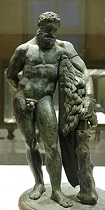
In the 4th cent. B.C.E. Glycon (Glykon) of Athens sculpts the Farnese Hercules, a copy of a work by Lysippus; found in the ruins of the Baths of Caracalla in Rome in 1599 C.E.
By 400 B.C.E. the Oscan-speaking peoples move into Campania (S of Latium on the Tyrrhenian Sea coast), Lucania (Basilicata) (from the Tyrrhenian Sea to the Gulf of Taranto), and Bruttium (Calabria) (toe region across the Strait of Messina from Sicily), all in Magna Graecia.
In 400 B.C.E. Hippias of Elis (-460 to -399) compiles a list of Olympic victors back to the 1st Olympiad.
In 400 B.C.E. Dionysius I of Syracuse conquers Leontini, and extends his control over the Sicels.
In 400 B.C.E. Conon and Iphicrates are elected rulers (archons) of Athens.
In 400 B.C.E. Persian satrap Tissaphernes sieges Cyme, causing Sparta to send Thibron with a mercenary army to liberate the Ionians from Persia.
In the 4th cent. B.C.E. Jews begin migrating to Rome and various Mediterranean towns, forming separate communities; by the next cent. large numbers live in Greece, esp. Rhodes and Thessaloniki (Salonica) (founded in -315 by Cassander of Macedon) (modern-day pop. 325K/1M) which becomes known as "the Mother of Israel".
A cemetery dating from the 4th cent. B.C.E. is found in the Ligurian city of Genua ("knee") (modern-day Genoa) on the Riviera 80 mi. S of Milan, proving Greek occupation of its fine harbor.

About 400 B.C.E. 60-y.-o. Hippocrates of Cos (-460 to -377) of the island of Cos in Greece becomes "the Founder of Western Medicine", teaching that diseases have natural causes, proposing the Four Humors (Temperaments) (sanguine, choleric, melancholic, phlegmatic) theory of disease, theorizing that mental disorders may be caused by physiological abnormalities; teaches that wounds should be washed in water that had been boiled or filtered, and that a doctor's hands should be kept clean and his nails clipped short, becoming the first to distinguish benign from malignant breast tumors, advocating withholding treatment for "hidden" cancers, with the soundbyte that surgery causes "a speedy death, but to omit treatment is to prolong life"; Aristotle later calls him the "great physician"; the Hippocratic Oath, drafted by him or his students incl. "Primum non nocere" ("The first rule is do no harm"); it begins "I swear by Apollo, the physician, by Aesculapius, by Hygieia, Panacea, and all the gods and goddesses... The regimen I adopt shall be for the benefit of my patients according to my ability and judgment, and not for their hurt or for any wrong. I will give no deadly drug to any, though it be asked of me, nor will I counsel such, and especially I will not aid a woman to procure abortion..."; he determines that the male contribution to a child's heredity is carried in the semen - matriarchial religions are f-ed? He also writes Aphorisms; "Life is short, and Art is long" (Vita breva, Ars longa) - is there a doctor in the Acropolis? He leaves the soundbyte: "Let food be thy medicine and medicine be thy food."
About 400 B.C.E. the city of Syracuse under tyrant Dionysius I invents the Arrow-Throwing Catapult.
About 400 B.C.E. Greek historian Ctesia describes a unicorn as white with a straight horn.
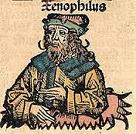
About 400 B.C.E. Chalcidice-born Greek philosopher Xenophilus (-300s) flourishes, becoming the last of the Pythagoreans, and the only one to live in Athens in the 4th cent. B.C.E.; after Pliny claims that he lives to age 105 without ever getting sick, he becomes a celeb in the Renaissance.
In the 4th cent. B.C.E. Greek painter Apelles of Cos flourishes, becoming the personal painter of Alexander III the Great, and later the most renowned painter of all time; in the 16th cent. C.E. Raphael (1483-1520) becomes known as the New Apelles.
In the 4th cent. B.C.E. Greek sculptor Scopas (born on Paros) flourishes, founding the Late Attic School of Sculpture with Praxiteles.


On Feb. 15, 399 B.C.E. Greek philosopher Socrates (b. -469), who doesn't even allow youths under 30 to be exposed to dialectic is sentenced on the charge of corrupting the morals of Athenian youth and denying or neglecting the gods of the state, esp. by introducing the daemonion, or mysterious inner voice, which they take to be a new god; after refusing to address the charges and instead giving a speech vindicating his whole weltanschauung, which sails over the jury's head, he is condemned to death by a small majority, then angers them by offering to pay a small fine instead, causing the majority against him to increase; after his friends plan an escape and he refuses to break the laws of the state, he spends a last day with friends, issues the soundbyte: "Death may be the greatest of all blessings", then nobly drinks a cup of poison hemlock (he chooses to die rather than renounce the freedom to speak his mind in the search for wisdom?) (the real reason he is tried is that he is associated with Athenian traitor Alcibiades?); his death frees his student Plato (-427 to -347) (who attends his trial but not his execution, and is messed up by it for life?) to travel broadly, er, widely, while churning out writings idolizing his crucified savior, making him immortal.
In Mar. 399 B.C.E. the Retreat of the Ten Thousand from Mesopotamia to Chrysopolis (begun -401) ends.
In 399 B.C.E. Archelaus I is killed by royal page Craterus (Crateusas) (his lover) during a hunt, leaving Macedon a much stronger power, and after talk-about-it Craterus lasts four days, Archelaus' young son Orestes (d. -396) becomes king of Macedonia (until -396), with Aeropus II (d. -393) as regent. Spartan king Agis II dies, and his lame Spartan-raised younger half-brother Agesilaus II (-444 to -360) becomes Eurypontid king of Sparta after a power struggle and a manipulation of Delphic oracles; for once Sparta has a king who has been through the tough Spartan military training and believes in the military culture implicitly?
In 399 B.C.e. Dercyllidas takes command of the Spartan forces in Asia Minor, playing Persian satraps Tissaphernes and Pharnabazus against each other, and conquering nine cities in eight days in the Aeolus.
In 399 B.C.E according to Livius, the first offering to a Greek deity in Rome is made this year.

In 398 B.C.E. after witnessing Socrates' death and fleeing to his hometown and offering refuge his other pupils, Greek Socratic philosopher Eucleides (Euclides) (Euclid) of Megara (-435 to -365) founds the Megarian School of Philosophy in Megara in N Isthmus of Corinth opposite Salamis Island, which flourishes for a cent. and produces Ichthyas, Eubulides of Miletus (known for his paradoxes, incl. The Liar Paradox), Clinomachus (first philosopher to compose treatises on the fundamental principles of Dialectics), and Thrasymachus of Corinth, and his pupil Stilpo (Stilpon) (-360 to -280), teacher of Zeno of Citium and Menedemus of Eretria; it teaches that the good is the knowledge of the one universal Being AKA God, Mind, Wisdom, Reason, and alone exists; "The Good is One, but we can call it by several names, sometimes as wisdom, sometimes as God, sometimes as Reason"; "The opposite of Good does not exist"; too bad, the doctrine is so patently absurd that the Megarians reverse Socrates' heuristic method into the eristic method of concentrating on finding something wrong in opponents' arguments, using Zeno of Elea's reductio ad absurdum technique to the max.
In 398 B.C.E. Socrates' pupil Phaedo of Elis (namesake of Plato's dialogue Phaedo) returns to Elis and founds the Elean School of Philosophy; after his death Phaedo's and Stilpo of Megara's pupil Menedemus of Eretria (-345 to -260) transfers the school to Eretria in Euboea.
In 397 B.C.E. Messina is destroyed by Carthage under Himilco, who is then forced to give the city up to Dionysius I, tyrant of Syracuse, who rebuilds the city.
In 397 B.C.E. the Carthaginian stronghold of Motya in Sicily is taken by the army of Syracuse using their new arrow-throwing catapult.
In 396 B.C.E. Cynisca (Kyneska) (Lat. "little puppy") wins the 4-horse chariot race, and again in -392.
In 396 B.C.E. Mt. Etna in E Sicily erupts, with a fiery tongue of lava snaking down into the sea, causing a Carthaginian fleet sieging Syracuse to retreat, after which Syracuse ultimately wins the war (begun -409).
In 396 B.C.E. Dercyllidas goes against the orders of the ephors and makes a truce with the Persians, allowing the latter to build up their fleet and put renegade Athenian Conon in command; Aegesilaus II replaces Dercyllidas as Spartan commander in Asia Minor, and he campaigns in Phrygia, defeating Tissaphernes' army, but is unable to defeat the Persian fleet; Persian satrap Pharnabazus sends Timocrates of Rhodes to bribe the leaders of Athens, Thebes, Corinth, and Argos to attack Sparta.
In 396 B.C.E. Sparta refuses to hand over the Greek cities in Asia Minor as promised during the Peloponnesian War, and battles Persia over them.

In 396 B.C.E. Orestes dies, and Aeropus II (d. -394) becomes king of Macedonia (until -394).
In 395 B.C.E. the Corinthian War begins (ends -387), pitting Athens and its allies Boeotia, Corinth, Argos, Megara, and Euboea against Sparta.
In 395 B.C.E. Hecatomnus of Mylasa (Hekatomnos) (d. -377) becomes Persian satrap of Caria (Turkey), founding the Hecatomnid Dynasty (ends -334) with his five children, who rule in succession until Alexander III the Great conquers them.
In 395 B.C.E. Pausanias dies, and nexst year his son Agesipolis I (d. -380) becomes Agiad king #21 of Sparta (until -380).
In 394 B.C.E. the Athenian fleet is restored.
In 394 B.C.E. Spartan king Agesilaus II returns to Greece with most of his force, then scores two hollow Vs over Thebes and its Greek allies at the Battle of the Nemea and the 2nd Battle of Coronea (1st in -447), losing his fleet to the Persian fleet under Conon at the naval Battle of Cnidus, and failing to establish Spartan hegemony as Persia grants autonomy to the Greek cities of Asia Minor and withdraws its garrisons, causing the Ionians to revolt from Sparta and establish democracies; Xenophon of Athens fights with the Lacedaemonians against the Athenians at Coronea, and is exiled from Athens.
In 393 B.C.E. Conon returns to Athens and begins rebuilding the Long Walls.
In 393 B.C.E. Athens recovers Delos, Imbros, Lemnos, and Scyros, and makes alliances with Chios, Cnidus, Cos, Mitylene, and Rhodes.
In 393 B.C.E. Aeropus II dies, and his son Pausanias becomes king of Macedon, but he is assassinated by Amyntas III the Little (d. -370) (father of Philip II), who becomes king of Macedon until he is driven out by the Illyrians, after which Archelaus II, son of Archelaus I and brother of Orestes becomes king of Macedon (until -387), becoming a patron of art and lit.
In 392 B.C.E. Dionysius I gives up on his war with the Carthaginians after failing to drive them out of Sicily.
In 392 B.C.E. Persia deposes Conon, who soon dies; in the winter a peace conference is held at Sparta, but the Athenians reject its terms.
In 392 B.C.E. Amyntas III recovers his kingdom (until -370) with help from the Thessalians under Medius, head of the house of the Aleuadae of Larissa.
In 392 B.C.E. Aristophanes debuts his play The Ecclesiazusae.
In 390 B.C.E. the Spartan fleet captures Samos, then an Athenian army under Iphicrates (d. -353) defeats the Spartans at the Battle of Lechaeum; Evagoras revolts from the Persians in Cyprus.
In 390 B.C.E. Dionysius I of Syracuse begins the conquest of S Italy (Magna Graecia) (ends -379).
In 390 B.C.E. Argaios II becomes king of Macedonia (until ?).In 390 B.C.E. Tharrhypas dies, and his son Alcetas I of Epirus (d. -370) becomes king of Epirus (until -370).
In 389 B.C.E. the Athenian navy under Thrasybulus recovers Thasos, Samothrace, Tenos, Chersonesus, Byzantium, Chalcedon, et al., placing garrisons in the most important towns and imposing a 5% harbor toll. Dionysius I of Syracuse defeats the Italiote (Greek) League at the Battle of the Elleporus. Amyntas III (d. -369) (father of Philip II) becomes king of Macedon (until -369).
In 388 B.C.E. the 98th Olympiad sees the first known case of cheating at the Olympics as boxer Eupolus of Thessaly bribes three opponents to take dives. The Athenian fleet plunders Aspendus to make up for missing pay from Athens, then the enraged pop. breaks into the Athenian camp and murders Thrasybulus. After the Spartan fleet under gen. Gorgopas ambushes the Athenian fleet near Athens and captures several ships, the Athenian fleet under gen. Chabrias ambushes and defeats the Spartans on Aegina Island; the Spartans under soldier-diplomat Antalcidas conclude an agreement with Persian king Artaxerxes I for Persian aid in its war against Athens in return for Spartan recognition of Persian supremacy over the Greek cities in Asia Minor; Antalcidas then commands the Spartan fleet in aid of the Persian fleet, defeating the Athenian navy near the Hellespont and kicking them out of the Aegean Sea.
In 388 B.C.E. Aristophanes debuts his play Plutus.
In 387 B.C.E. the Corinthian War (begun -395) ends with the King's Peace (Peace of Antalcidas), negotiated by Antalcidas of Sparta, which guarantees the autonomy of all Greek cities except those in Asia Minor, marking the imposition of Persian control over the Greek Ionian city-states.
In 386 B.C.E. Dionysius I of Syracuse captures Rhegium in S Italy.
In 386 B.C.E. the Spartan navy forces Athens to accept the King's Peace by blockading the Hellespont, then intimidates Thebes into accepting; the Boeotian and Athenian Leagues are temporarily dissolved; Ephesus is again under Persian control.
In 384 B.C.E. Sparta ends a long siege of Mantinea, dismantling its walls and breaking up the city into five villages.
In 384 B.C.E. Plato writes Symposium, a discussion on the nature of love by men at a drinking party at the house of Athenian tragedian Agathon; Aristophanes claims that there are three genders, gay male, lesbian female, and heterosexual - and homosexual behavior among men is natural, as is lesbian behavior among females, while heterosexual behavior must be learned, therefore the weird anti-sexual Christian cult that develops centuries from now is profoundly sick, wasting human happiness by denying the pleasures of the flesh and making life not worth living, so no wonder it brings on a Dark Ages of looney tunes hoping the world will end any minute so they can become as angels and not have to worry about sex, while avoiding taking baths?
In 383 B.C.E. Dionysius I of Syracuse begins another war with Carthage (ends -381).
In 382 B.C.E. after an appeal from Amyntas II of Macedonia, Sparta goes to war with the Chalcidian League (led by the city of Olynthus), sending 10K soldiers, who seize the Theban citadel of Cadmea and turn it over to the oligarchic party, causing the democratic party to flee to Athens; the Spartans then march to the Chalcidice, where they are defeated - I'm the survivor, not you?
In 381 B.C.E. the Persians defeat Cyprus and destroy their fleet.
In 381 B.C.E. Carthage kicks Dionysius I's butt at the Battle of Cronium, causing him to end his war, pay an indemnity of 1K talents, and cede the territory W of the Halycus River by -378.
In 381 B.C.E. Sparta sends a 2nd expedition led by King Agesilas to Olynthus, which sieges and captures the city and dissolves the Chalcidian League (until -379); Agesilaus is KIA.
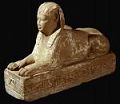
In 380 B.C.E. Hathor dies, and his son Nepherites (Nefaarud) II (d. -380 becomes king #3 of the Egyptian 29th Dynasty, ruling only 4 mo. until army gen. Nectanebo (Kheperkare Nakhtnebet) I (d. -360) of Sebennytos overthrows him, becoming king #1 of the Egyptian 30th (XXX) Dynasty (ends -343) (last dynasty with Egyptian-born rulers), and successfully turns back the Persians, building a great Temple of Isis on Philae, an island in the Nile (closed 537 C.E.), causing the cult to spread throughout the Hellenic world in this cent.; Isis (later identified with the Greek goddess Demeter) is the daughter of the Earth and Sky (Keb and Nut), wears cow horns, has the personality of Athor (goddess of love and gaiety), marries her brother Osiris (Serapis) (judge of the dead), and has son Horus (god of day) - the original Hollywood couple?
In 380 B.C.E. Greek dramatist Aristophanes (b. -448) dies, leaving 40-44 plays, of which 11 survive to modern times - big day for birds, frogs, etc.?
In 379 B.C.E. Dionysius I of Syracuse finishes conquering S Italy.

In 379 B.C.E. Theban democratic exiles led by (freedom fighter?) Pelopidas (d. -364) and Epaminondas conspire with Athens against the Spartan hegemony in Cadmea, recovering it by a stratagem, massacring the Spartan tyrants and establishing a democracy, causing two Athenian generals who aided the Thebans to be executed for operating without authority; Sparta does not directly intervene, but leaves Sphodrias with a garrison at Thespiae, and lets him operate without authority and raid Attica; Athens allies with Thebes against Sparta.
In 379 B.C.E. Marsala on the W coast of Sicily is founded by the Carthaginians.In 378 B.C.E. Timotheus (Timotheos), son of gen. Conon is elected strategos of Athens; Spartan king Agesilaus II is assigned the campaign against Thebes and Athens, and reorganizes the Peloponnesian League, forming 10 districts, each responsible for sending men or money, sending punitive expeditions into Boetia, prompting counterstrikes by Thebes, which is now commanded by Epaminondas, and attempting to seize Piraeus, driving Athens closer to Thebes, forming the Second Athenian Empire (ends -355), incl. most of the cities of Boeotia and some of the Ionian islands as a successor to the Delian League, after which the Spartans under Phoebidas are routed by the Thebans aided by the Athenians under gen. Chiabras at the Battle of Thespiae, liberating Thebes, with Phoebidas KIA; Chiabras wows the Spartans with a new battle maneuver of defending against a charge by resting on the left knee with shields resting on the ground and spears pointed forward; the new Athenian empire is much diminished in power, wealth, and influence, with Athens giving up all claims to its cleruchies and letting an allied council (synhedrion) rule jointly with the Athenian assembly (ecclesia).
In 377 B.C.E. Hecatomnus dies, and is succeeded by Mausollos (Mausolus) (d. -353) as virtually independent Persian satrap of Caria (Turkey), embarking on an expansionist policy.
In 377 B.C.E. Greek sculptor Scopas moves to Athens, working there for 25+ years.

In 376 B.C.E. On the main day of the Eleusinian Mysteries, the Athenian fleet under gen. Chabrias, aided by up-and-coming gen. Phocion (Phokion) the Good (-402 to -318) (pupil of Plato) crushes the Spartan fleet in the naval Battle of Naxos, giving Athens control of the sea, becoming the first Athenian V since the Peloponnesian War; Chabrias breaks off from annihilating the Spartan fleet to pick up survivors so he doesn't end up like the gens. of the 406 B.C.E. Battle of Arginusae; the V makes Phocion a big man, and he proves his wisdom and works to earn his nickname "The Good" by going out to collect regional tributes in a single ship instead of the 20 offered, with the soundbyte "If I was being sent to fight the pesky islanders I would need a larger force, but since I'm visiting them as allies, one is enough".
In 376 B.C.E. Thebes restores the Boeotian League on a democratic basis.
In 376 B.C.E. Bas of Bithynia (-397 to -326), son of Boteiras becomes the first independent prince of Bithynia in NW Asia Minor (until -326), defeating Alexander I the Great's gen. Calas to maintain independence.
In 376 B.C.E. the Thracian city of Abedera is sacked by the Thracian Triballi tribe from the South Morava, West Morava, and Iskar Rivers at the Sebian-Bulgarian border.
In 373 B.C.E. the city of Helice in Achaea, Greece is destroyed by an earthquake containing "immense columns of flame", becoming the first recorded instance of earthquake lights; at night a tsunami from the Corinthian Gulf inundates what's left, killing the entire pop.; the city of Boura further inland is also destroyed.
In 371 B.C.E. In the summer Sparta and the Theban allies reach a general peace settlement, but Spartan King Agesilaus II torpedoes it by singling Thebes out of its terms and not letting Theban king Epaminondas sign on behalf of all Boeotia, then sending Spartan troops under King Cleombrotus I to chastize Thebes; they meet in battle in only 3 weeks, but it backfires, and Sparta's 700 warrior citizens and 1.3K slave soldiers are soundly defeated by 6K Theban warriors at the Battle of Leuctra (Leuktra); Sparta loses 400 of its 700 remaining full citizens (officers) and never recovers; the city of Megalopolis (Gr. "big city") is founded in the prefecture of Arcadia by Epaminondas to celebrate his V as the seat of the Arcadian League; Sparta's hegemony over Greece is shattered, and Boeotia begins dominating Greece (until -338); Thebes withdraws from the Athenian League along with the cities in Acarnania, Euboea, and the Chalcidice; Cleombrotus I dies, and his son Agesipolis II (d. -369) becomes Agiad king #23 of badly sprained Sparta (until -369).
In 370 B.C.E. the Satraps Revolt results after Datames of Cappadocia et al. decide it's too risky to obey the Persian king Artaxerxes III's orders to recover Egypt; a Persian army from Pisidia led by gen. Artabazus is defeated by Datames, followed by another led by Autophradates.
In 370 B.C.E. Amyntas III dies, and Alexander II (d. -368) becomes king of Macedonia.
In 370 B.C.E. Alcetas I dies, and his son Neoptolemus I of Epirus (d. -357) becomes king of Epirus (until -357), claiming to be a descendant of Greek hero Achilles as well as king Lycomedes.
In 370 B.C.E. the Arcadian League is formed under Theban protection as a counterweight to Sparta, and the city of Mantinea is restored; the league is ruled by the Ten Thousand, a gen. assembly of all freeborn citizens, meeting in Megalopolis.
In 370 B.C.E. the Thebans under Epaminondas liberate the exiled Messenians from Sparta, and they return to the Peloponnesus next year, founding Messene (Messenia), with Pylos as its main port.

About 370 B.C.E. Greek lover, fighter, scholar, and historian ("the Attic Muse") Xenophon (Gr. "foreign voice") of Athens (-431 to -354) writes Anabasis (Gr. "An Ascent") (7 vols.) (an expedition from a coastline to the interior of a country, as opposed to katabasis, from the interior to the coast), about the Greek expedition of the Ten Thousand against Artaxerxes II of the Persians and the long journey home after their sponsor Cyrus the Younger is KIA in Babylon at the 401 B.C.E. Battle of Cunaxa; how Spartan gen. Clearchus, the leader of the Ten Thousand is treacherously murdered in a conference by Tissaphernes, leaving Xenophon as one of the last three leaders of the soldiers, bravely leading them N from N Mesopotamia through Corduene and Armenia to the Black Sea at Trebizond; upon encountering some barbarians (Celts?), he puzzles about their strange drink: "There were stores within of wheat and barley and vegetables, and wine made from barley in great big bowls; the grains of barley malt lay floating in the beverage up to the lip of the vessel, and reeds lay in them, some longer, some shorter, without joints; when you were thirsty you must take one of these into your mouth, and suck. The beverage without admixture of water was very strong, and of a delicious flavor to certain palates, but the taste must be acquired." (Book IV)
In 369 B.C.E. Agesipolis II dies, and his brother Cleomenes II (d. -309) becomes Agiad king #24 of Sparta.
In 369 B.C.E. Athens and Sparta make an alliance on equal terms, while Thebes works to unite all of Thessaly (except Pherae) under a single archon.
In 368 B.C.E. Alexander II dies, and Ptolemy (Ptolemaeus) (Pteolemaios) (Gr. "warlike") Alorites (d. -365) becomes king of the Massy Mountains of Macedonia.

In 367 B.C.E. After entering into an alliance with Athens, Dionysius I the Elder, known for competing at the Athenian drama festivals and having fun with Damocles (having a sword hanging by a hair suspended over his head at a banquet to teach him the insecurity of the most fortunate) dies in the spring during a war with Carthage, and his weak son Dionysius II (the Younger) (-395 to -343) becomes tyrant of Syracuse (until -356) under the regency of his uncle Dion, who immediately makes peace with Carthage; during the reign of Dionysius the Younger, Pythagorean philosophers Damon and Phintias (Pythias) gain fame when Phintias is condemned to death for treason, and requests home leave to arrange his affairs, with Damon offering to remain as hostage; Phintias is delayed and Damon is about to be executed, and is saved just in time when Phintias returns, impressing Dionysius so much that he pardons Phintias and asks to become friends with them both.
In 367 B.C.E. Pro-Persian Spartan leader Antalcidas commits suicide.
In 367 B.C.E. Philip of Macedon, youngest son of Amyntas II is captured by the Thebans and held hostage at Thebes for the next 3 years (until -364), using the opportunity to learn the A-1 Theban military techniques - which means that we oughtn't to a done that, right?
In 366 B.C.E. Athenian gen. Chabrias is accused of treachery for advising the surrende of Oropus to the Thebans, and is acquitted, but bolts to Egypt, where he accepts a command under king Teos to fight the pesky Persians.
In 366 B.C.E. Plato travels to Syracuse at the urging of Dionysius II's son-in-law Dion to set up a perfect state with Dionysius as a philosopher-king; by next year both Dion and Plato are expelled.

In 365 B.C.E. Ptolemy Alorites is killed by Perdiccas (Perdikkas) III (d. -359), who becomes king of Macedonia (until -359).
In 365 B.C.E. the pro-Spartan party of Callistratus in Athens is replaced by the party of Timotheos, who is elected strategos of Athens; peace is made with Thebes on the basis of the status quo, then Athens breaks its promise and sends a cleruchy to garrison its ally Samos.
In 364 B.C.E. tyrant (since -369) Alexander of Pherae is defeated by Thebes in the Battle of Cynoscephalae; Theban gen. Pelopidas is KIA; Philip of Macedon returns to Macedon, and his older brother Perdiccas III appoints him gov. of a Macedonian principality.


About 364 B.C.E. possibly legendary Athenian sculptor Praxiteles (Gr. "he who finishes his works"), sculpts a statue of Aphrodite of Knidos (Venus Pudica) (Modest Venus), modeled by Thespian courtesan Phryne (b. -371), becoming the first to sculpt the life-size nude female form, along with the statue of Hermes of Praxiteles (Olympia) and the Infant Dionysus; rediscovered in 1875 C.E. - this stupid knife dispenser is stuck?
In 363 B.C.E. Epaminondas leads a Theban army into Thessaly, and again defeats Alexander of Pherae.
In 363 B.C.E. Athens subjects its allies Ceos and Naxos to its jurisdiction.
On July 4, 362 B.C.E. the Second Battle of Mantinea becomes Sparta's 3rd military D in history as the Thebans kick their butts while losing their military hero Epaminondas, along with his male lover Caphisodorus, who are buried together like husband and wife; Sparta is occupied by a Theban army; the Mycenaean Helot slaves (the backbone of the Spartan army, since true Spartans have resisted expansion of their ranks until only a few hundred remain) are liberated; this is the end of Sparta as a significant force in Greek politics, supplanted by Thebes (until -338). The Arcadian League breaks up, and oligarchs take control of many of its cities.
In 361 B.C.E. Aristophon and Ebolos are elected rulers of Athens, which sends a cleruchy to occupy Potidaea. Athenian adm. Leosthenes (d. -323) is sent to take on Alexander, tyrant of Pherae, but is surprised and defeated, losing five triremes and 600 men, getting condemned to death as punishment.

In 360 B.C.E. Agesilaus II dies, and his son Archidamus III (d. -338) becomes king of Sparta.
In 360 B.C.E. (380 B.C.E.?) Plato (-427 to -347) writes The Republic, which postulates an ideal state with philosopher kings "who love the sight of truth" (475c), at the top of a class society of alpha (rulers) (reason), beta (warriors) (spirit), delta (workers) (appetite) people; contains references to specialization of labor and production; "Until philosophers rule as kings or those who are now called kings and leading men genuinely and adequately philosophize, that is, until political power and philosophy entirely concide, while the many natures who at present pursue either one exclusively are forcibly prevented from doing so, cities will have no rest from evils... nor, I think, will the human race" (473c-d); becomes the first known advocate of the Credit Theory of Money, which claims that money originated as a unit of account for debt, and that money creation involves the simultaneous creation of money and debt, meaning that they're really the same thing.
In 360 B.C.E. Xenophon of Athens (-429 to -354) writes Oeconomicus, about household mgt. and agriculture, becoming the first Greek text on economics.

In 359 B.C.E. Perdiccas III dies, and his younger brother Philip II of Macedon(ia) (-382 to -336) (later father of Alexander III the Great) becomes regent of Macedonia for Perdiccas' infant son Amyntas IV, then kicks the runt out the window (executes him) and takes the crown for himself, quelling internal revolts.
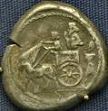
In 358 B.C.E. Persian king (since -404) Artaxerxes II Mnemon (b. -445) dies, and his son Artaxerxes III Ochus (-425 to -338) becomes king of Persia (until -338), becoming the most bloodthirsty of all Persian rulers?
In 358 B.C.E. the Athenians make peace with the Macedonians to leave them free to fight the Odrysae in Thrace; Macedonia gives up its claim to Amphipolis on the Macedonian coast, and Athens promises them Pydna, also on the coast; Philip II reorganizes his army along Theban lines, increasing the importance of the phalanx.
In 357 B.C.E. Dion leads a rebellion in Syracuse that expels Dionysius II.

In 357 B.C.E. Philip II of Macedon captures Amphipolis, but grants it independence instead of turning it over to Athens; in the winter he conquers Pydna, and keeps it; he makes a treaty against Athens with Olynthus, and marries Molossian princess (high priestess of Lesbos) Olympias (-375 to -316); 9 mo. later, here comes the son of god? - I'd like to climb her mountain?
In 357 B.C.E. Chios, Rhodes, and Cos ally to overthrow their democratic govts., and together with Byzantium revolt against domineering Athens, beginning the War of the Allies (Social War) (ends -355); in midsummer the Athenian fleet under returned gen. Chabrias and new gen. Chares (known for staying in power via corruption) is decisively defeated, and Chabrias is killed in an attack on the island of Chios, after which Chares withdraws the fleet to the Hellespont to attack Byzantium.
On July 21, 356 B.C.E. Greek psycho Herostratus sets fire to the Temple of Artemis in Ephesus in order to immortalize his name, after which he is executed, and any mention of his name forbidden under penalty of death, which doesn't stop historian Theopompus from immortalizing him in his Hellenics anyway, causing the expression "pursue a Herostratic honor" to be coined, along with the Streisand Effect; the temple takes 120 years to rebuild; Alexander III the Great (d. -323) is allegedly burn, er, bairn, er, born the same day.
In 356 B.C.E. at the instigation of Thebes, the Amphictyonic Council fines Phocis for tilling land sacred to Apollo, but they refuse to pay despite a threat of war.

In 356 B.C.E. Greek philosopher Aristippus of Cyrene (b. -435) dies after founding the Cyrenaic school of philosophy in Cyrene, Libya, which considers individual sensual pleasure the greatest good; his daughter Arete of Cyrene takes over - hard or gentle strokes?
In 356 B.C.E. the Artemision (Temple of Artemis) NE of Ephesus (near modern-day Selcuk, Turkey) is destroyed by fire, after which it is rebuilt by Macedonian architect Deinocrates (Dinocrates) (Dimocrates) (Cheirocrates) (Stasicrates) of Rhodes, becoming one of Pausanias' Seven Wonders of the World in his 10-vol. History of Greece (162 B.C.E.) (4.31.8; 7.5.4); the others are the pyramids at Giza, Egypt (only one to survive to modern times), the Hanging Gardens of Babylon, the Statue of Zeus in Olympia, Greece, the Mausoleum of Halicarnassus in Bodrum, Turkey, the Pharos Lighthouse in Alexandria, Egypt, and the Colossus of Rhodes in Rhodes, Greece; the Artemision becomes a famous place of sanctuary (Acts 19:23-41); the temple is destroyed in 263 C.E. after only 93 years.
In 355 B.C.E. faced by a series of revolts, Athens caves-in to the Persians and withdraws from Asia Minor, recognizing the independence of its allies there, and gives up its confederation, replacing the war party of Chares and Aristophon with a peace party under Eubulus; Isocrates is elected ruler of Athens; the theoric fund is founded for financial surpluses, to be used for public entertainment - is that like "I, Isocrates"?
In 355 B.C.E. the Phocians, led by Philomelus seize Delphi, beginning the 10-year Third Sacred War (ends -346) with the Amphictyons, and allies with Athens and Sparta, using the sacred money from Delphi to pay for a large mercenary army.
In 355 B.C.E. Philip II of Macedon takes the city of Crenides (Krenides) in E Macedonia (N Greece) from Thracian Odrysae and renames it Philippi, planning on making it a great city; gold coins made from the gold mines in the area are issued in his name.In summer 354 B.C.E. Philip II of Macedon captures Methone (Methoni) in Pieria after a long siege, during which he takes an arrow in the right eye from a sniper while inspecting siege machinery, but luckily his helmet deflects its trajectory, and Greek physician Critobulus of Cos uses the Spoon of Diokles to extract the arrowhead, saving his life although he loses the eye; he then advances into Thessaly.
In 354 B.C.E. the Phocian mercenary army is defeated by the Boeotians at the Battle of Neon (Crocus Field) near the Gulf of Paghasitikos, and Philomelus is KIA; Onomarchus (d. -352) becomes the ruler of funky, funky, funky Phocis.
In 354 B.C.E. after Calippus of Athens tricks Dion into thinking he's not in the conspiracy by feeding him rumors of one and swearing he's not in it at the Temple of Persephone on the day it is done, Dion of Syracuse (b. -408) is assassinated by unarmed Zacynthians who jump him and try to strangle him but fail, after which Lyco of Syracuse gives them a sword to finish him off; Calippus becomes tyrant of Syracuse for 13 mo. (until -352).
In 354 B.C.E. Greek historian Xenophon (b. -431) dies, leaving Agesilaus, and other works, incl. Cyropedia (Education of Cyrus), the prototype of the novel.
In 353 B.C.E. the Phocians led by Onomarchus seize Thermopylae and Orchomenos, and defeat Philip II of Macedonia 2x.
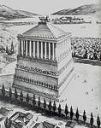
In 353 king (since -377) Mausollos (Mausolus) of Caria dies after annexing Rhodes and Cos; for his tomb his sister-wife Queen Artemisia builds the first Mausoleum (Tomb of Mausolus) in Halicarnassus (modern-day Bodrum or Budrum, Turkey) (finished -350).
In 352 B.C.E. Philip II of Macedon defeats and kills Onomarchus, unites Thessaly under his rule, then marches S toward Greece, but is stopped at Thermopylae by the Phocians allied with the Athenians, Achaeans, and Spartans.
In 352 B.C.E. after an unsuccessful attempt to conquer Messina, followed by a successful campaign against Rhegium, Calippus of Syracuse is KIA by his mercenaries Leptines II and Polyperchon with the same sword he used to kill Dion; Dion's brothers Hipparinus and Aretaeus (sons of Dionysius I) succeed as tyrants of Syracuse, attempting to stabilize Sicily.
In 351 B.C.E. Sidon is burned by its inhabitants, and 40K are killed.
In 351 B.C.E. Olynthus becomes suspicious of Philip II's designs and appeals to Athens for aid, and Demosthenes, leader of the anti-Philip party gives his three Olynthiac Orations, urging action against the Macedonian menace.
In 351 B.C.E. Cyprus revolts against Persian rule (until -349), and Athenian gen. Phocion aids Persian emperor Artaxerxes III in subduing them.
In 350 B.C.E. Neoptolemus I dies, and his son Alexander I of Epirus (-370 to -331) (brother of Olympias, and uncle of Alexander III the Great) becomes king of Epirus.
About 350 B.C.E. the nice seaport of Nice (Nikaia) (Gr. "victory") is founded on the Mediterranean coast by the Greeks of Massilia (Marseille) after a big V over the neighboring Ligurians, and it soon becomes one of the busiest trading ports on the Ligurian Coast, while engaging in rivalry with the nearby Roman town of Cemeneleum on nearby Cimiez Hill.
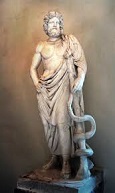
About 350 B.C.E. Pergamum (Pergamon) (Pergamos) in Asia Minor, whose acropolis atop a 1300-ft. cliff above the Calcus River gives it an excellent view of the Bay of Lesbos becomes known for its worship of Asclepius (Asclepios) (Asklepios), the god of medicine and healing (son of Apollo), known for his snake-entwined (no wings like Hermes' Caduceus) Rod of Asclepius that becomes a symbol of medicine; his daughters are Hygieia (cleanliness), Isaso (recuperation), Aceso (healing process), Aglaea (Aegle) (beauty), and Panacea (universal remedy); Epidaurus (Epidoros), his alleged birthplace becomes the #1 healing center of the ancient Greek-Roman world, lasting until the mid-5th cent. C.E. as a Christian healing center - the first free clinic for the treatment of sexually-transmitted disease?
About 350 B.C.E. Greek painter Antiphilus flourishes, working for Philip II of Macedon and Ptolemy I of Egypt, becoming a rival of Apelles.
About 350 B.C.E. Greek writer Aeneas Tacitus writes How to Survive Under Siege, a treatise on siegecraft, describing arrow-shooting machines; he also invents a coded optical communication system using torches and water jars.
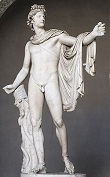
In 350 B.C.E. the 7.3' nude dangly Apollo Belvedere statue is sculpted of white marble by Greek sculptor Leochares, showing Apollo after having shot an arrow; a Roman copy is made about 130 C.E., which is discovered in 1489 in Anzio, Italy, and ends up in the hands of Pope Julius II (Giuliano della Rovere); in 1755 German art historian Johann Joachim Wincklemann calls it the best example of the Greek aesthetic ideal, after which it becomes an icon of the Enlightenment; in 1796 Napoleon steals it from the Vatican, which gets it back in 1815 after his fall.
In 349 B.C.E. the revolt in Cyprus (begun -351) is quashed.
In 349 B.C.E. Athens allies with Olynthus; meanwhile Philip II of Macedon begins capturing all the towns of Chalcidice, invading Euboea and setting up local tyrants who incite the local pop. to revolt from the Athenian League, causing the Athenians under Phocion to go against Demosthenes' advice and divide their forces between Euboea and Olynthus; hoping to win the Euboeans by diplomacy, Phocion establishes a camp near Tamynae, telling his men to ignore turncoats taking Macedonian bribes; Demosthenes unsuccessfully attempts to divert money from the Athenian theoric fund for the military.
In 348 B.C.E. Athenian comdr. Phocian defeats a Euboean army under gen. Callias of Chalcis, almost losing when he decides to offer too many religious sacrifices before battle, allowing the Euboeans to attack first, then freeing the POWs for fear that his fellow Athenians would be too harsh with them before returning to Athens; meanwhile Philip II of Macedon takes Olynthus, destroys it and enslaves its pop., then makes peace with the Thracians.
In 347 B.C.E. the Thebans and Thessalians call on Philip II of Macedon to intervene on behalf of the Amphictyonic League and fight the Phocians in the Sacred War.
In 347 B.C.E. tyrant Dionysius II returns to Syracuse (until -345).
In 347 B.C.E. Greek "number appears to lead towards truth" philosopher Plato (b. -427) dies in Athens at age 76-80 after becoming the first to propose that the brain is the seat of mental processes, and to propose the Great Chain of Being; "One of the penalties for refusing to participate in politics is that you end up being governed by your inferiors"; "Wonder is the feeling of the philosopher, and philosophy begins in wonder"; "Whatever deceives seems to exercise a kind of magical enchantment"; leaves The Dialogues, incl. nine tetralogies (arrangement ascribed to Tiberius' court astrologer Thrasyllus by Diogenes Laertius): 1: Euthyphro, Apology, Crito, Phaedo (which describes Socrates' last words and hemlock death, and claims that swans sing because they are inspired by Apollo, and is also claimed to have the beginning of the Gospel of John and the Trinity in it by St. Augustine); 2: Cratylus, Theaetetus, Sophist, Statesman; 3: Parmenides, Philebus, Symposium, Phaedrus; 4: Alcibiades 1 & 2, Hipparchus, Lovers; 5: Theages, Charmides (Temperance), Laches, Lysis; 6: Euthydemus, Protagoras, Gorgias, Meno; 7: Hippias Major, Hippias Minor, Ion ("Poetry is nearer to vital truth than history"), Menexenus; 8: Clitophon, The Republic, Timaeus ("God created the soul before the body and gave it precedence both in time and value, making it the dominating and controlling partner"), Critias; the Story of Atlantis is found in "Timaeus" and "Critias", allegedly passed down by his ancestor Solon; 9: Minos, Laws; Epinomis, Letters; spurious works incl. Axiochus, Definitions, Demodocus, Epigrams, Eryxias, Halcyon, On Justice, On Virtue, Sisyphus.
In 347 B.C.E. Plato (b. -427) dies, and his nephew Speusippus (-407 to -339) succeeds him as head of the Academy in Athens, going on to reduce the Good from the #1 to #2 principle, and argue that one cannot know something until one knows all the differences which separates it from everything else, inventing the ideas of genera and species, and dividing philosophy into Dialectics, Ethics, and Physics.
In 346 B.C.E. after Philip II of Macedon marches into Phocis and destroys its cities, the Third Sacred War (begun -355) ends with disaster for the Phocians, who are kicked out of the Amphictyonic Council, ordered to pay a huge fine, and dispersed into small villages; Philocrates (Philokrates) is elected ruler of Athens, negotiating the Peace of Philocrates with Philip II along with Aeschines, Demosthenes, and seven other Athenian ambassadors, leaving the status quo; after the ambassadors are dealayed on their way back from Athens with approval of the assembly, Philip uses the opportunity to conquer more of Thrace; Philip II hosts the Pythian Games at Delphi with the Thebans and Thessalians, causing Panhellenic groupies to begin hailing him as the destined messiah who will lead them against common enemy Peria.
In 346 B.C.E. tyrant Dionysius II returns to rule Syracuse.
In 345 B.C.E. Dionysius II is replaced as tyrant of Syracuse by Hicetas, tyrant of Leontini.
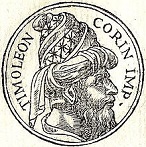
In 344 B.C.E. Hicetas is ousted by Greek gen. Timoleon of Corinth (-411 to -337) at the request of the people of Syracuse, and exiled to Corinth; Timoleon institutes a moderate oligarchy complete with a dem. constitution that makes him military CIC, the priest of Zeus (amphipolos) as chief magistrate, and 600 wealthy citizens as the council; he then begins a campaign to oust other tyrants in Sicily and S Italy, causing Greek Sicily to revive its economy and culture.
In 344 B.C.E. Philip II of Macedon begins a campaign to secure a foothold in the Peloponnesus, espousing the cause of the Argives, Messenians et al. against the Spartans; Demosthenes travels through the Peloponnesus trying to develop an anti-Macedonian alliance, delivering his Second Philippic at Athens.
In 342 B.C.E. Philip II of Macedon conquers Eumolpias (modern-day Plovdiv) in Thrace, and renames it Philippopolis; the Romans later rename it Trimontium ("City of Three Hills"), and make it the capital of Thrace.
In 342 B.C.E. Alexander I Molossus (-370 to -330) (brother of Alexander III the Great's mother Olympias) becomes Aeacid king of Epirus (E coast of the Ionian Sea in modern-day S Albania and NW Greece).
In 341 B.C.E. the Carthaginians under Hasdrubal and Hamilcar try to conquer Sicily but are defeated by Syracuse under Timoleon at the Battle of the Crimissus.
In 341 B.C.E. Demosthenes gets Athens to form an anti-Macedonian alliance with Euboea and the Pelopennesus, and they send an army under gen. Chares to protect the Greek colonies of Chersonensus, Perinthus, and Byzantium from pesky Philip II, but they tell him to fuck off and almost cancel the expedition until Phocion talks them out of it.
In 340 B.C.E. Demosthenes is elected ruler of Athens.
In 340 B.C.E. Philip II of Macedon sieges Perinth in Thrace, employing arrow-firing machines; meanwhile his 16-y.-o. son Alexander III rules Macedonia in his absence, puts down the rebellious Maedi in W Thrace, takes their chief city by storm, drives out its pop. and brings in his own settlers, and names the place Alexandropolis Maedica in honor of himself.
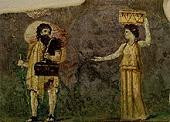
About 340 B.C.E. after being born rich and giving it away, lame hunchbacked Cynic philosopher Crates of Thebes (-365 to -285) moves to Athens, becoming the pupil of Diogenes of Sinope followed by the teacher of Zeno of Citium, marrying babe Hipparchia of Maroneia, sister of his student Metrocles, who gives up her wealth for him; he becomes known as the Door-Opener from his habit of entering any house he pleased, being welcomed with honor and gladness.
In 339 B.C.E. After the Athenians send gen. Phocion to aid Byzantium, and he earns their trust via his personal friend Leon, Philip II of Macedon sneak-attacks the city at night, but his army is spotted due to a bright crescent moon, causing the city dedicated to Diana, goddess of the hunt to adopt the crescent moon as its symbol; Phocon counterattacks and drives the Macedonians out of the region, but is wounded and returns to Athens; meanwhile the Megarians secretly request military help, causing him to arrive with his army and erect two long walls to the seaport of Nisaea, causing them to feel so safe that they ally with Athens. To prevent the Sicilian tyrants from allying with Carthage, Timoleon makes a separate peace with Carthage, establishing a boundary at the Halycus River, then expels the tyrants and forms a military league against Carthage; Timoleon then retires from public life.

In 339 B.C.E. Philip II of Macedonia attempts to convince the Amphictyonic Council to fine Athens for improperly dedicating spoils from Persia and Thebes, but orator Aeschines (-389 to -314) gives a great speech that diverts attention to the Locrians of Amphissa, causing the Fourth Sacred War between the Macedonians and the Locrians to begin (ends -338); the Amphictyonic Council gives Philip II of Macedon command of the League's forces, causing the Athenians to enter an anti-Macedonian alliance with Thebes, and send a force of 10K mercenaries to guard Amphissa.
In 339 B.C.E. Demosthenes reforms the financial system supporting the Athenian navy.

In 339 B.C.E. Chalcedon-born Xenocrates (-396 to -314) becomes head (scholarch) of the Platonic Academy in Athens (until -314), backing Plato's teaching but claiming a third form of being other than the sensible and intelligible, corresponding to opinion; he splits with Plato by considering Platonic ideas to be identical with mathematical objects, and considers unity and duality to be gods that rule the Universe, and the soul to be a self-moving number; he believes in daemonical powers intermediate between the divine and moral, which consist of conditions of the soul; he teaches that virtue produces happiness, but that worldly goods can help.
On Aug. 2, 338 B.C.E. after annihilating Athens' mercenary force and capturing Amphissa (Amfissa) (Salona) between Mt. Giona and Mt. Parnassus in Phocis 120 mi. NW of Athens, Philip II of Macedon and his son Alexander III the Great crush Athens and Thebes in their struggle for independence at the Battle of Chaeronea in Boeotia, at which the Sacred Band of Thebes of 300 paired gay warriors goes down (but not on each other any more?); the era of Greek independence is kaput, and Philip II is master of Greece; Alexander burns all of Thebes except the house of poet Pindar, and garrisons Thebes while letting Athens go free; the Fourth Sacred War (begun -339) ends; Greece loses its independence until 1820 C.E.; Philip II declares the League of Corinth to unite the Greeks in a war against Persia, causing all Greek states except Sparta to join under Macedonian hegemony but with members guaranteed autonomy, with only Thebes, Corinth, Chalcis, and Ambracia garrisoned; the Achaean League joins the opposition to Philip II and is dissolved; Macedonia replaces Thebes as the leading Greek state (hegemon); Athens elects Gen. Phocion (who was touring the Aegean colonies) during the Battle of Cheronea) as strategos for the first of 45x, going on to try unsuccessfully to stop Athens from joining the Hellenic League.
In 338 B.C.E. Archidamus III of Sparta invades S Italy, which ends in defeat and his death, and his son Agis III (d. -331) becomes Eurypontid king #21 of Sparta (until -331).
In 338 B.C.E. Ctesiphon is elected ruler of Athens.
In 337 B.C.E. the Second Congress of Corinth (first in -481) declares a Common Peace.
In 337 B.C.E. Philip II reorganizes the conquered Greek territories in the Corinthian League; Alexander III the Great repudiates his wife Olympias, who goes into exile in the Molossian court of Alexander I of Epirus and plots against him with hatey hate hate hate, trying to talk him into making war on Philip II, which he doesn't buy, instead marrying Philip II's daughter (his niece) Cleopatra of Macedon (-355 to -308) next year (put up to it by Olympias?).

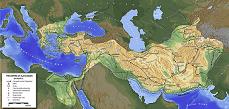
A proven 40 is traded for an unproven 20? In summer 336 B.C.E. after sending a 10K-man army under gen. Parmenio (-400 to -330) to Asia Minor, 46-y.-o. Macedonian King Philip II (b. -382) is assassinated by a disgruntled bodyguard during the wedding of Olympias' daughter Cleopatra to her brother Alexander I of Epirus, and his 20-y.-o. sn Alexander III the Great (-356 to -323) succeeds; Greek historian Diodorus later attributes the assassination to the Fates, but attributes Alexander's er, great success to "his own force of character"; although his daddy left 60 talents in the treasury, he owed 500, leaving Alexander a net of only a few gold and silver cups; driven by a boundless desire for glory, he borrows 800 talents, forms a comparatively small but good army, and sets out looking to conquer you guessed what, invading Illyria and Thrace; meanwhile Philip's lavish tomb at Vergina 75km SW of Thessaloniki, filled with a gold sarcophagus and gobs of exquisite gold doodads and prepared years in advance is sealed, and rediscovered in 1978 beneath a host of other tombs that had been ransacked by robbers; it contains a carved ivory hunting scene, incl. a cool tiny Bust of Alexander, which breaks with tradition and shows a lifelike depiction, becoming the first political portrait?; Alexander goes on to have many statues made depicting his charismatic blonde big-hair Caucasian face with straight aquiline nose, which ends up on coins for centuries, being used by future rulers to give credibility to their regimes? Demosthenes is elected ruler of Athens; gen. Phocion bans all celebratory sacrifice for Philip II, with the soundbyte "It isn't worthy enough that the army that defeated us at Cheronea has lost just one of its soldiers". The rulership of Timoleon in Syracuse gives way to a democracy (ends -317).
In 335 B.C.E. a rumor that Alexander III the Great had died on campaign causes Thebes, Athens, Arcadia, Elis, and Aetolia to revolt against the Macedonians, and Alexander rushes S, captures and destroys Thebes (except for a statue of poet Pindar) and enslaves its pop., and defeats the rebellion in Illyricum; when Alexander refuses to see the Athenian ambassadors, Phocion is sent, and when Alexander asks his advice out of respect to his father, he tells him to quit oppressing Greece and go after Persia, which advice Alexander takes, making Phocion one of his favorites ahead of a lot of Macedonians, packing his lunch basket for his great campaign to kick Persian butt; meanwhile the-cat's-away Olympias orders the murder of Philip II's other wife Cleopatra.

In 335 B.C.E. after breaking ranks with his master Plato of the Academy in Athens, Stagira, Macedonia-born Greek Golden Mean philosopher ("the Peripatetic Philosopher") (the first scientist?) (gay?) Aristotle (Gr. "best (purpose) of all") of Stagira (-384 to -322) begins his career by founding a gymnasium in E Athens called the Lyceum (Lykeion), named after a nearby temple to Apollo Lycean (Gr. "lukos" = wolf), founding the Peripatetic School, named either after the collonades of the Lyceum, or for his habit of walking and talking; he prefers to go around collecting data before solving problems, vs. Platonists, who sit around thinking up answers by pure thought; Aristotle writes the 10-vol. Nicomachean Ethics, which becomes a hit during the European Middle Ages, and uses lunar eclipses to prove that the Earth is ball-shaped. He goes on to become the teacher of undefeated world conqueror Alexander III the Great, preferring to collect data rather than sit around thinking, and (after much personal experimentation?) deciding that all inheritance comes from the father, the mother merely providing the material, and that female babies are caused by "interference" from the mother; he leaves 260 treatises, incl. Constitution of Athens (written in -350) (discovered in 1890 C.E.), Physics, Metaphysics, Ethics, Logic, Zoology, De Anima (On the Soul) (the nous poietikos or active intellect vs. the nous pathetikos or passive intellect), which first mentions the Tabula Rasa view of the mind as starting out a blank slate, and Poetics, the first work on art criticism, valuing art based on how it imitates the universal in human nature, and claiming criticism as a science: "Man is by nature a political animal"; "Hope is a waking dream"; "Tyrants preserve themselves by sowing fear and mistrust among the citizens by means of spies, by distracting them with foreign wars, by eliminating men of spirit who might lead a revolution, by humbling the people, and making them incapable of decisive action"; "Music directly represents the passions of the soul. If one listens to the wrong kind of music, he will become the wrong kind of person."
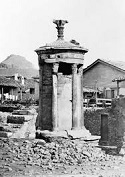
In 335 B.C.E. the Choragic Monument of Lysicrates in Athens is begun (finished in -334), becoming the oldest known building of the Corinthian Order.
About 335 B.C.E. Greek Peripatetic philosopher-musician Aristoxenus of Tarentum (b. -375) (pupil of Aristotle) flourishes, leaving Elements of Harmony, becoming the main modern source of knowledge about ancient Greek music.

In May 334 B.C.E. Alexander III the Great launches his campaign against Persia, leaving his gen. Antipater (-397 to -319) as gov. of Greece and worshipping at Dion at the foot of Mt. Olympus, then crossing the Hellespont with an army of 32K infantry and 5K cavalry, and a 160-ship navy of Greek allies; his approach causes most Greek cities of Ionia to revolt against their Persian masters; in June after Persian naval cmdr. (of Greek forces in Persian service) Memnon of Rhodes unsuccessfully advises a tactical retreat, Alexander totally defeats the Persian army of Darius in the NW corner of Asia Minor in the Battle of the Granicus River (which flows from Mount Ida to the W shore of the Sea of Marmara near Priapos, and is named for river god Granicus or Grenikos), then conquers Lydia (incl. Sardis) and liberates the Persian bases of Miletus and Helicarnassus, cutting off access to food and water to the Persian fleet under Memnon of Rhodes (-380 to -333), which flees, alowing Alexander to capture the rest of the ports on the Anatolian coast; Ephesus breaks away from the Persians and comes under control of a series of Hellenistic rulers.
In 334 B.C.E. king (-350 to -331) Alexander I Molossus of Epirus (-370 to -331) (brother of Olympias, and uncle of Alexander III the Great) is called in by the Greek colony of Taras (Tarentum) in Magna Graecia in S Italy to fight the Italiote League of the Oscan-speaking Lucanians (Lucani) and the Bruttii, setting a precedent for Epirus to interfere in their affairs.

In 334 B.C.E. the grand Temple of Apollo in Didyma in modern-day Turkey is begun; it is never finished, and construction ends in 300 C.E.; an earthquake damages it in the 16th cent.; in Oct. 1979 Lothar Haselberger of the Tech. U. of Munich discovers nearly complete plans for it inscribed in stone on some of its walls.


In spring 333 B.C.E. Memnon of Rhodes dies during the siege of Mytilene, causing Darius III to withdraw his Greek mercenaries into Syria and gather a large army. Alexander III the Great subdues Ancyra (modern-day Ankara), Caria, and Cilicia, then advances into Syria; in Nov. he defeats Darius III in the SE corner of Asia Minor at the Battle of Issus, a seaport on a narrow coastal strip between high mountains and the Gulf of Issis in Cilica (near modern-day Alexandretta, Syria), causing Darius to offer him 10K talents plus all of Asia W of the Euphrates if he backs off, but Alexander demands unconditional surrender; Alexander takes Memnon of Rhodes' widow Barsine (-363 to -309) as his mistress, becoming the only woman he has sex with until his marriage to Roxane in -327 (how many men, though, who knows - at least he doesn't have to make the Macedonian bar scene anymore?); Alexander III the Great makes Antigonus I (Cyclops) (Monophthalmus) (-382 to -301) gov. of Phrygia in W Asia Minor; Phoenicia, incl. Sidon, Arwad, and Byblos is conquered, except for hard-to-crack Tyre, causing Alexander to begin a 7-mo. siege (ends (-332); meanwhile after Rhodes allies with Ptolemy, he sends his son Demetrius I Poliorcetes ("besieger of cities") (-337 to -283) to invade it with 40K men, and after he finds its walls impregnable he sieges it (until -304), building massive siege towers, the first ship-borne tower capsizing in a storm, and the larger land-based Helepolis stopped by flooding the land in front of the walls.


In Jan. 332 B.C.E. blonde-blue Macedonian king (since -336) Alexander III the Great (-356 to -323) sieges the well-protected island city of Tyre under its last king Azemilkos, and captures it in Aug. after a 7-mo. siege by building an enormous mole connecting it permanently with the mainland, during which time he goes underwater in a diving bell to observe divers removing underwater obstacles, and has his vessels equipped with chain cables so that they couldn't be cut adrift at night; he crucifies 2K POWs and sells 30K more into slavery; the Persian navy disintegrates, and Phoenician trade slackens as the Phoenicians lose their identity and are Grecianized; Alexander then obtains the submission of the provinces of Galilee, Samaria and Judah, and invades Egypt, and Persian satrap Mazaces surrenders without a fight, ending the 31st Egyptian Dynasty (begun -343); Alexander stay in Egypt for a year, visiting the Egyptian coast and ordering the Temple of Luxor restored to its ancient glory, then having an overwhelming desire to found a new city (according to Roman author Arrian), which becomes Alexandria (modern-day pop. 5M), then visits the Oracle of Amon-Ra at the Siwah Oasis in the Western Desert (barely making it and almost dying of thirst), where is proclaimed the son of god; there were settlements in the Alexandria area for several hundred years? According to Jewish historian Josephus in his Antiquities 11.317-45, Alexander III the Great visits Jerusalem, and the Jewish elders freak him by reading to him from the Book of Daniel (Ch. 2) the prophesy about the statue with a head made of gold, chest and arms made of silver, belly of brass, legs of iron, and feet of iron mixed with clay, explaining that the head is Babylon, the breast and arms Medo-Persia, the brass belly and thighs Greece, and the iron legs Rome, before or after which he has a dream about the Jewish god being right and sacrifies to him, sparing the city from sacking although putting it under his control; they probably didn't read to him from Ch. 8, which talks about the shaggy goat with one large horn between its eyes that is replaced by four horns that have lesser power?; too bad, the pop. of Gaza puts up a fight at a stronghold on a hill, causing Alexander to siege and take it in Oct. after suffering a serious shoulder wound, massacring the men and selling the women and children into slavery.
In 332 B.C.E. Alexander III the Great's uncle Alexander I of Epirus crosses the Adriatic Sea to Italy to assist the Tarentines against the Lucanians, Bruttians, and Samnites, and wins a V over the Samnites and Lucanians near Paestum, making an arrangement with the Romans for a joint attack on the Samnites, taking Heraclea from the Lucaanians, and Terina and Sipontum from the Bruttii, causing the Tarentines to fear that he's trying to set up a kingdom in Italy and turn against him.
On Apr. 7, 331 B.C.E. the city of Alexandria on the Cape Lochias peninsula, protected by the island of Pharos is founded by Alexander III the Great, with Cleomenes of Naucratis (d. -322) as gov. #1; a number of Jews settle there immediately - and begin churning out the New Testament?
In spring 331 B.C.E. Alexander III the Great leaves Egypt and marches for Mesopotamia, quelling a rebellion by the Jews in Samaria, then expelling the pop. and inviting Macedonians to move in; after conquering the Amman Citadel in Jordan and renaming the city Philadelphia, he crosses the Euphrates and Tigris Rivers without opposition, and turns S on the Royal Road toward Susa; on Oct. 1 after faking the Persians out, causing them to stay awake all night looking for a night attack, Alexander's 47K-man army decisively defeats the 100K-man (1M?) army of Darius III Codomannus (complete with elephants and scythed chariots) at the Battle of Gaugamela near Arbela (modern Arbil or Erbil in Iraq), with Darius refusing to delegate authority, causing him to personally screw everything up, causing up to 90K Persian vs. 1K Greek casualties, after which the loser flees to Arbela, leaving behind his chariot, bow, and a large store of coins, and forgetting to destroy the bridges behind him, joining up with 2K loyal Greek mercenaries, some Bactrian cavaly and what's left of his royal guards, regrouping to Ecbatana; meanwhile Alexander has control of half of Persia, and on Oct. 21 Alexander and his massy Macedonians triumphantly enter Babylon, and wins over the Babylonian priesthood by restoring the worship of Marduk. Armenian satrap Orontes II is killed, and Alexander appoints Orontes' son Mithanes (-370 to -317) as new satrap, founding the Orontid (Ervanduni) Dynasty in Armenia, which eventually becomes kings (with Mithanes I as king #1) and rules Armenia until -200; he then decides to conquer the rest of Persia; meanwhile Sparta, seeing its chance and aided by Persian money allies with Elis, Achaea, and part of Arcadia, and defeats a Macedonian force sieging Megalopolis, causing Antipater to march into the Peloponnesus and crush them after Alexander sends him a large sum of money to finance the war; Agis III dies, and his brother Eudamidas I (-330 to -305) becomes Eurypontid king of sputtering Sparta.
In 331 B.C.E. the Italiote League defeats Alexander I of Epirus at the Battle of Pandosia, and Alexander I is KIA by a Lucanian, leaving son Neoptolemus and daughter Cadmea, after which Roman historian Livy speculates that if Alexander III the Great had taken on the Romans he would have found out that fighting everybody else would have been like waging war against women.
In 331 B.C.E. orator Lycurgus (-396 to -324) is elected ruler of Athens.
In 331 B.C.E. Ariamnes I dies, and his son Ariarathes I (-403 to -322) becomes satrap of Cappadocia (until -322).
On Jan. 20, 330 B.C.E. the Battle of the Persian Gate sees Alexander III the Great and his 60K-man army take mountain pass known as the Persian Gates (Darvazeh-ye Fars) (modern Tang-e Meyran), after which he takes Susa, holding a festival which incl. athletic events, after which he reorganizes his army for guerrilla warfare, dividing it into units of 75-100 men; in Jan. he reaches the Persian capital of Persepolis, and finds several mutilated Greek captives, pissing him off and adding fuel to the fire of the atrocities committed against Athens 150 years before (-480) by Xerxes, after which the city is looted and burned in revenge; after promising not to do it since he wants to rule the country but getting drunk, Alexander and his army burn the great Palace of Xerxes; the captives allegedly debate whether they should return and shock their families, or stay in Persia with friends with benefits - I'm thinking Arby's?
In spring 330 B.C.E. Alexander III the Great pursues Darius III N through Media toward his summer palace on the Caspian Sea, meeting up with Darius' troops at Damghan, then learning that Darius has been arrested by his own satraps in Parthia (modern Afghanistan) in hopes of stopping Alexander from invading Persia further, but Alexander refuses the offer and attacks; in early July Darius III is murdered near Rhagae in the Persian desert E of modern-day Tehran by his own kinsman Bessus (d. -329), satrap of Bactria, who retreats to Bactria and proclaims himself Darius' successor Artaxerxes V; Alexander views Darius' body, covering it with his cloak (he wanted to keep him alive as a puppet king), then pursues Bessus, subduing the Caspian region and taking Aria in Sept., then Drangiana in Nov., then marching S into Persia.
In 330 B.C.E. Alexander I of Epirus (b. -370) is KIA at the Battle of Pandosia by a Lucanian emigrant, and the Italiote League breaks up, after which the Epirotes eventually leave Italy. Olympias returns to Molossis and serves as regent for her cousin Aeacidas.
In 330 B.C.E. Philotos, son of Parmenio (b. -400) is executed for complicity in a plot, causing Alexander to send messengers to murder Parmenio in Media to prevent a possible revolt.
In 330 B.C.E. Demosthenes is accused by Aeschines of illegally accepting a civic crown, then tried and acquitted.
In 330 B.C.E. compulsory military training for all Athenian youth (epheboi) is established.
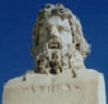
In 330 B.C.E. Greek geographer Pytheas of Massilia (-380 to -300), seeking to circumvent the Phoenician monopoly sets sail from Massalia (Marseille), passing through Gibraltar then sailing N as far the British Isles, the coasts of France and Denmark, the Shetland (Zetland) Islands, and possibly to Iceland and Norway, which he calls Thule (because if you try to pee you'll freeze your tool?), and the mouth of the Don River in the Black Sea; the first literate explorer of these areas, he refers to the British Isles as the Isles of the Pretani (Britanni), made up of Irish Cruithin (Gael. "painted or tattooed people"), Scottish Picts (Lat. "painted or tattooed people") and Welsh Britons; he also develops the use of North Star sightings to determine latitude, and discovers that tides are related to the phases of the Moon.
In 330 B.C.E. Athenian courtesan Thais accompanies Alexander III the Great on his Asiatic campaign?
In 330 B.C.E. as Alexander's troops, which come from all over Greece and speak various dialects (not only the "pure" Attic one) begin to develop their own Koine (common) dialect, the Hellenistic Koine Period of the Greek Language begins (ends 330 C.E.), replacing Aramaic as the universal language of the civilized West in the wake of Alexander's conquests, and continuing even after the Roman takeover.
About 330 B.C.E. Greek poet ("the Daedalus of Tasty Dishes") Archestratus (Archestratos), born in Gela or Syracuse in Sicily flourishes, becoming the first cookbook writer with his humorous didactic poem Hedypatheia (The Life of Luxury), which waxes lyrical about a "boiled torpedo done in oil and wine and fragrant herbs, plus some thin grated cheese"; he also writes the amorous poem The Art of Cookery.
In 330 B.C.E. the Iron III Period of Archaeology (begun -600) ends, and the Hellenistic Period of Archaeology begins (ends -63).
In 330 B.C.E. Aristotle writes Politics, a critique of Plato's advocacy of rule by philosopher-kings, analyzing monarchy, aristocracy, constitutional govt., tyranny, oligarchy, and democracy; disses common ownership of property because of the "wickedness of human nature", with the soundbyte: "It is clearly better that property should be private, but the use of it common, and the special business of the legislator is to create in men this benevolent disposition"; dumps Plato's credit theory of money for Metallism, the theory that money derives its value from the purchasing power of the commodity upon which it is based, is only a medium of exchange, an "instrument", and on its own "it is worthless... not useful as a means to any of the necessities of life", but warns about obsession with money accumulation, praising "wealth-getting" for one's household as "necessary and honorable", while dissing the massing of money via retail trade as "justly censured, for it is dishonorable", also dissing usury and monopolies.
In 330 B.C.E. the Red Figure Period of Greek art ends, and the Hellenistic Period of Greek Art (ends -31) begins, spreading with Alexander's conquests, only to be stopped by the Romans with the defeat of Cleopatra VII at Actium.
In 330 B.C.E. the 3rd Temple of Apollo in Delphi, Greece is completed to replace the 2nd one, which was destroyed in -375 by an earthquake; "Know thyself" (Gr. "gnothi seauton") is inscribed in the forecourt (pronaos).
In early 329 B.C.E. Bessus tries to prevent Alexander the Great from crossing the Oxus (Amu Darya) River into Bactria, but fails, and his own men hand him over to Alexander, who mutilates him by cutting off his ears and nose, then has him brought back to the place where he killed his master and tried by a Persian court and crucified; Alexander then invades soggy Persian-held Sogdiana in C Asia SE of the super-salty (10%) Aral Sea between its filler-uppers the Oxus (Amu Darya) (S) and Jaxartes (Syr Darya) (N) Rivers, and conquers the Persians under Spitamenes (Spitamaneh) (-370 to -328) with difficulty, then invades Afghanistan and captures Gandara (Kabul) (125 mi. E of the Khyber Pass), causing the Afghanis to resist with guerrilla fighting, which Alexander meets with scorch-and-burn tactics; he then detours NE through the Hindu Kush ("Hindu killer"?) in the spring, and captures Arachosia in Mar.; meanwhile the pagan Kafirs in Kafiristan are formed by Greeks staying in the country, becoming an unconquerable region that is later used as the setting of Rudyard Kipling's "The Man Who Would Be King".
In 328 B.C.E. Alexander III the Great, "Conquerer of the World", "the Macedonian Madman" becomes great king of Persia, showing favor to them by adopting many Persian customs, dressing up as a Persian, making people bow down to the ground and kiss his feet (proskynesis), and generally letting his passions take him over; he drinks wine to excess, and believes in diviners, who throng his court; he trains 30K Persians to fight in the Macedonian fashion; the sophist Anaxarchus (-380 to -320) (who accompanies him into Asia along with Pyrrho) tells him that "what is done by a great king should be held just", and next year allegedly debates with Callisthenes at Bactria, telling him that Alexander should be worshiped as a god even during his lifetime; he allegedly founds the town of Kandahar (Candahar) (originally Alexandria) in Afghanistan 250 mi. SW of Kabul.
In 328 B.C.E. the Romans siege Greek-held Neapolis (Gr. "New City") (Naples) on the Bay of Naples 120 mi. SE of Rome (until -327).

In 327 B.C.E. Alexander III the Great's mistress Barsine bears a son named Heracles (d. -309), his first son; Alexander defeats Bactrian king Oxyartes at Sogdian Rock fortress in Balkh, Bactria, and takes his 16-y.-o. daughter Roxane (Roxana) (Pers. "the dawn") (-340 to -310) captive, then marries her to cement relations with Bactria, not having sex with her until after the ceremony, which makes him even more popular; Barsine returns to Pergamon - Roxane, you don't have to put out the red light? Alexander III the Great's gen. Craterus (-370 to -321), known for going lion hunting with him in the nude is given the first independent command in the Macedonian army to take on the Tapurians of Hyrcania; meanwhile late in the year Alexander invades India at the invitation of Taxiles (King Ambhi of Taxila), who wants him to fight King Porus (Parvataka), and with Roxane at his side he crosses the Hindu Kush into N India, then over the Indus River, capturing Persian-held Bombay; too bad, upon seeing the 4K well trained and equipped war elephants of the Nanda Empire, his forces mutiny at the Beas River; his dog Peritas (Gr. "January"), of the Skilos tou Alexandrou (Molosser) Mastiff breed (which has been with him since age 11) dies on a pass in India, causing Alexander to later name a city after him - it's fun to get out and meet people? The Greek colony of Neapolis comes under Roman control, but retains its Greek culture, going on to become a favorite resort for the wealthy - the clothes make the matron?
In 327 B.C.E. the Greek colony of Neapolis comes under Roman control, but retains its Greek culture, going on to become a favorite resort for the wealthy - the clothes make the matron?
In 326 B.C.E. Alexander III the Great wins a number of military Vs, culminating in May in the defeat of Hindu king Porus (Raja Puru) (Rai Por) (Raja Purava) (Raja Parvatka), king of Paurava at the Battle of the Hydaspes (Jhelum) River in the Punjab near Bhera in modern-day Pakistan, after which in June Alexander loses his legendary steed Bucephalus (Bucephalus) (b. -355) and founds the city of Bucephala (Alexandria Bucephalus) to honor him near modern-day Jalapur Sharif, after which he advances to the Hyphasis (Beas) River, but his Macedonian army refuses to go any farther east - you see that big black dude on steroids? In Nov. Alexander III the Great marches via the Hydaspes and Indus Rivers to the Acesines River near the Indian Ocean and fights the Mallian Campaign (ends Feb.) against the Malli and Oxydraci of the E Punjab, on the Indus River, leaping single-handedly from their city wall into their midst, where he is wounded by an arrow but rescued by his troops.
In 326 B.C.E. Athenian orator Hypereides (Hyperides) (-390 to -322) is elected ruler of Athens, going on to promote war against Macedonian rule after the death of Alexander III the Great.
In 326 B.C.E. Bas dies, and his son Zipoites (Zipoetes) (Ziboetes) I (-354 to -278) becomes the 2nd ruler of Bithynia in NW Asia Minor (until -278), and in -397 takes the title of king.
The list just keeps growing? In July 325 B.C.E. after his troops refuse to go further E, Alexander the Great halts on the banks of the Indus River and returns to Macedon through the Gedrosian Desert, where lack of supplies decimates his troops; Nearchus (Nearchos) of Crete returns with his fleet via the coast of the Indian Ocean and the Persian Gulf to the Euphrates River, reporting "a reed in India that brings forth honey without the help of bees", observing people growing sugar cane and making granulated sugar ("sarkara") (Lat. "saccarum") (Gk. "zakkhari"), causing Alexander's soldiers to carry some of the "honey-bearing reeds" home with them; native rebel Chandragupta Maurya occupies the Punjab after Alexander withdraws, planning a rebellion. The Oscan city of Cumae in S Italy is conquered by the Romans, who turn it into a seaside resort for Roman politicos. Lame Macedonian noble Harpalus (son of Machatas), a boyhood chum of Alexander III the Great who was given a post in Asia Minor, where he was contacted frequently by Alexander III for reading material (Aeschyulus, Sophocles, Euripides, Philistus, Philoxenus, Telestes, etc.) is caught embezzling funds while Alexander is in India, and flees to Athens, where he bribes Athenian officials to secure sanctuary.
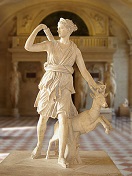
About 325 B.C.E. Leochares sculpts the marble Diana of Versailles.

In Mar. 324 B.C.E. after Alexander III the Great's army and navy meets in Caramania for a rest stop, it heads for Susa, the capital of Elam; he then orders 80 of his officers to Persian-up and marry Persian or Median ladies, and marries soldiers to their hos, and pays the soldiers' debts; he marries his 2nd wife Statira (Stateira) (Gr. "creation of the stars") (II) (-340 to -320), daughter of Darius III Codomannus and sister of Drypetis (Drypteis) (d. -323), then recalls Greek exiles and proclaims himself the son of the god Zeus Ammon instead of his human father Philip II, sending 10K unfit Macedonians home and replacing them with Persians, then going on to replace native satraps by Macedonians, and make his boyfriend gen. Hephaestion (Hephaistion) (-356 to -324) his #2 in command (hipparch) (grand vizier); too bad, he dies en route from Susa to Ecbatana and is not replaced even though extravagantly mourned; it seems like the West is going to be ruled by the gay Greeks forever?
In 324 B.C.E. Demosthenes is exiled from Athens for taking bribes from Harpalus.

In early 323 B.C.E. faced with the choice of going back to conquer India or conquering Arabia next, Alexander III the Great (b. -356) picks proud unconquered Arabia, gathering a large army and navy at Babylon while making plans the Dean Martin Way (sousing in booze); one day he gets mad at friend and countryman Clitus for criticizing him for allowing a song to be sung which ridicules Macedonian officers, loses his temper and kills him with a spear, then sobers up, repents, goes to his tent for three days to mourn, and allegedly gets over it, but shortly afterward (May 31) falls ill after a prolonged eating-drinking bout, keeps drinking despite it, loses his voice, lets his soldiers see him one last time, "already speechless as the army filed past... he greeted one and all, raising his head, though with difficulty, and signing to them with his eyes" (nice ass, nice package, etc.?); on June 10 he dies in Babylon of fever (malaria?) at age 32 years 8 mo., before he can name a successor or consolidate his vast (2.18M sq. mi.) empire, incl. the S Balkan peninsula, Asia Minor, Egypt, and the entire Near East as far E as the Indus River (and make more of the East white, blonde and Western like himself?) (and conquer Arabia, possibly preventing the later rise of Islam?); his body is preserved in a huge crock of honey; before croaking and being crocked, Alexander gives his ring to his gen. Perdiccas (-360 to -320), uttering the soundbyte that he gives his empire "kratistoi" (to the strongest), although he might have said "to Craterus"; either way, nobody wants Alexander's children by "barbarians" Barsine or 5-mo.-pregnant Roxana to be his heir, and his gens. scramble for power, resulting in the Wars of the Diadochi (ends -275) and the division of the empire into four kingdoms under four dynasties, Macedonia (the Antigonids), Egypt (the Ptolemies), Pergamon (the Attalids), and Syria-Mesopotamia (incl. Persia) (the Seleucids).
The closest man has ever come to eternity, and he dies at age 33 after gaining the whole world and losing his soul? The ultimate source of the Jesus story? On June 10, 323 B.C.E. Greek conqueror Alexander the Great (b. -356) dies in Babylon of fever after bringing the banana, the ring-necked parakeet, sugar, cotton (all from India), and crucifixion (from Persia) to Europe; poisoned with slow-acting white hellebore?; really dies of Gullain-Barre Syndrome?; his body fails to show any signs of decomposition for six days after his death, causing the Greeks to believe he is a god; spent his life seeking the formula for eternal life, causing him to be called al-Iksander, the 2-horned god, pictured on coins wearing the spiral ram's horns of divinity on his head; or did he never really die, but broke his crown and ran away, becoming the first Romany (gypsy), wanting only eternal freedom? - the good die young?
The original Omen starring evil-eyed Damien? In Sept. 323 B.C.E. while the world holds its breath, Alexander's wife Roxane bears a son named Alexander IV (-323 to -309), who with his 25-y.-o. half-brother Philip III Arrhidaeus (-359 to -317) (illegitimate son of Philip II of Macedon and Philinna of Larissa) are made co-rulers under the regency of Alexander's vizier gen. Perdiccas; Alexander's gen. Meleager (d. -323) (son of Neoptolemus) becomes the first of Alexander's officers to propose that they not wait until pregant Roxana bear a son, and at first backs mentally-deficient Philip III, while Perdiccas's ambition pisses-off Meleager, who storms out of the meeting and joins a mutiny of the soldiers, and gets into a death struggle with Perdiccas, after which Eumenes of Cardia (-362 to -316) brokers a too-good-too-be-true deal, getting all to agree to give the succession to Philip III and Roxana's unborn son Alexander IV, with Mealeager and Perdiccas as regents, while Perdicca switches to Philip III, who becomes his puppet to buy time to outmaneuver and kill Meleager, after which Antipater and Craterus share Macedonia and Greece; Laomedon of Mytilene gets Syria and Phoenicia; Ptolemy I Soter (-367 to -283) gets Egypt; Philotas (d. -330) gets Cilicia; Peithon (Pithon) (-355 to -314) gets Media; Antigonus I Monophtalmus (the One-Eyed) (-382 to -301) gets Pamphylia and Lycia; Leonnatus (-356 to -322) gets Phrygia; Neoptolemus (d. -321) gets Armenia; Eumenes of Cardia gets Cappadocia and Paphlagonia, although he has to win Cappadocia by force from Ariarathes I first (ends -322); Lysimachus (-360 to -281) gets Thrace; Taxiles and Porus remain in charge of their kingdoms in India; Alexander's father-in-law Oxyartes (father of Roxana) gets Gandhara; Sibyrtius gets Arachosia and Gedrosia; Stasanor of Cyprus gets Aria and Drangiana; Philip III (-359 to -317) gets Bactria and Sogdiana; Phrataphernes gets Parthia and Hyrcania; Peucestas gets Persis; Tlepolemus gets Carmania (modern-day Kerman Province, Iran) on the Persian Gulf coast W of Hormuz; Atropates (-370 to -320) gets N Media; Archon of Pella (d. -321) gets Babylonia until he is KIA in -321 in a fight with Docimus; Arcesilas gets N Mesopotamia; too bad, Meleager and about 300 of his partisans are killed by forces loyal to Perdiccas; meanwhile Alexander's hand-that-rocks-the-cradle first wife Roxane plots to have second wife Barsine murdered - and the game is on, forever proving that blonde whitey is too stupid to unite and rule the world, because there is no real white race, only lighted and unlighted windows?
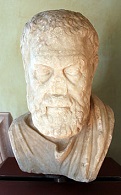
In 323 B.C.E. after receiving the good news about Alexander, and ignoring the advice of Phocion, the lame Lamian War (ends -321), a revolt against Macedonian regent Antipater begins when Athenian gen. Leosthenes (d. -323) and orator Hypereides (Hyperides) (-390 to -322) give inflammatory speeches, and the revolt spreads through C and N Greece; Phocion is put in charge of military actions against Boeotia, and calls all Athenians ages 60 and under to join the army, pointing out that he's 80 and will be their leader; Leosthenes defeats Antipater in battle and forces him to Lamia, circling and sieging him for several mo., with Phocion saying that he wished he had been the gen. who achieved this V, but would still have counseled as before; Leosthenes is killed, and new strategos Antiphilus (not the painter) is appointed to counterbalance Phocion; meanwhile Aristotle's pupil Theophrastus (-371 to -287) becomes dir. #2 of the Lyceum in Athens after Aristotle (Alexander's teacher) is forced to leave the city by anti-Macedonian forces (accused of impiety), fleeing to Chalcis in Euboea; meanwhile the Athenians recall Demosthenes from exile and pay his fine. A civil war begins in Sicily (ends -316) between the oligarchs and democratic leader Agathocles.

In 323 B.C.E. Sinope, Pontus-born Greek Cynic philosopher Diogenes of Sinope (the Cynic) (-412/404 to -323) dies, founding the Cynic School of Philosophy; his father Icesias is a banker who is convicted of debasing coinage, causing Diogenes to have to leave Sinope for Athens, where he gets Cynic philosopher Antisthenes to take him in and begins living like a dog in a tub (large ceramic jar) in the marketplace, masturbating in public, hence the name cynic (canine) (like a dog), carrying a lamp in daytime to look for an honest man; he sabotages the lectures of Plato, criticizing and embarrassing him and Alexander the Great; he is captured by pirates on a voyage to Aegina, sold as a slave in Crete to Xeniades of Corinth, and set free and made tutor of his children; teacher of Zeno of Citium - he's not on the pedophile list? He dies on June 10 (same day as Alexander the Great) after having an interview with him, and when asked by Alexander how he can best serve him, telling him, "Stand out of my sunshine", causing Alexander to remark, "If I were not Alexander, I should wish to be Diogenes"?: "Humans have complicated every simple gift of the gods"; "I fawn on those who give me anything, I yelp at those who refuse, and I set my teeth in rascals" (when asked why he lives like a dog); "If only it were as easy to banish hunger by rubbing my belly" (when asked why he masturbates in public); "I am a citizen of the world (cosmopolites)" (first use of the word cosmopolitan); "It is not that I am mad, it is only that my head is different than yours."
In 322 B.C.E. the Athenians under gen. Phocion defeat the Macedonians under Gen. Mikion at the Battle of Rhamnus in Attica; simultaneously the Athenians under Antiphilus defeat the Macedonians in Thessaly, but a large army from Asia under gen. Craterus defeats their combined Athenian army at the Battle of Cranon (Crannon), and Antipater's army closes in on Athens, causing both Athenian gens. to come crawling to him to talk peace, to which he responds that now that his soldiers are here, why stop?; Phocion then kisses up to him bigtime and gets him to parley; back in Athens, the supporters of Macedonia condemn Hypereides and other orators to death, and Hypereides flees to Aegina before being captured at the Temple of Poseidon and executed; meanwhile Demosthenes flees to avoid arrest by Antipater's lt. (an actor) Archias of Thurii, and commits suicide on Calauria Island.
In 322 B.C.E. Alexander's gens. Ptolemy, Antigonus I Cyclops, Antipater (-397 to -319), and Craterus (-370 to -321) form a coalition against Perdiccas.
In 322 B.C.E. Rhodes expels the Macedonians, and goes on to two cents. of prosperity, culture and power.
In 322 B.C.E. 82-y.-o. Ariarathes I of Cappadocia (b. -403) is defeated by Perdiccas, and crucified with many of his relations, and Eumenes takes full possesion of Cappadocia (until -301).
In 322 B.C.E. a new tax on metics (foreign residents) is instituted, and when Platonic Academy head Xenocrates is unable to pay, Athenian orator Demetrius Phalereus pays it for him.

In 322 B.C.E. 20-y.-o. Menander (-342 to -291) debuts his first play, The Self-Tormentor - about menanderbation?
In 322 B.C.E. Greek Golden Mean philosopher Aristotle (b. -384) dies after parting ways with Plato and founding the Lyceum, preferring to collect data rather than sit around thinking, and deciding (after much personal experience?) that all inheritance comes from the father, the mother merely providing the material, and that female babies are caused by "interference" from the mother; leaves 260 treatises, incl. Constitution of Athens (written in -350) (discovered in 1890 C.E.), Physics, Metaphysics, Ethics, Logic, Zoology, De Anima (On the Soul) (the nous poietikos or active intellect vs. the nous pathetikos or passive intellect), which first mentions the Tabula Rasa view of the mind as starting out a blank slate, and Poetics, the first work on art criticism, valuing art based on how it imitates the universal in human nature, and claiming criticism as a science: "Man is by nature a political animal"; "Hope is a waking dream"; "Tyrants preserve themselves by sowing fear and mistrust among the citizens by means of spies, by distracting them with foreign wars, by eliminating men of spirit who might lead a revolution, by humbling the people, and making them incapable of decisive action"; "Music directly represents the passions of the soul. If one listens to the wrong kind of music, he will become the wrong kind of person." Greek statesman-orator Demosthenes (b. -384) on Calauria (Kalaureia) Island (near Poros) (suicide by poison): "He who confers a favor should at once forget it if he is not to show a sordid, ungenerous spirit."
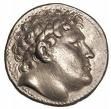
In 321 B.C.E. Perdiccas' gen. Eumenes of Cardia (-362 to -316) defeats and kills Craterus (b. -370) and his rebel Greek auxiliaries in Asia Minor near the Hellespont; Craterus dies after his horse falls on him.
In 321 B.C.E. the Lamian War (begun -323) is ended with a humiliating treaty for Athens, with 12K Athenians disenfranchised and heavy reparations demanded, causing a mass migration to Thrace; Phocion becomes the de facto ruler of what's left of Athens, sucking up to Antipater and becoming unpopular with the people, who blame him for handing Athens to him and getting Demosthenes killed.


In 320 B.C.E. Perdiccas (b. -360) is assassinated while campaigning in Egypt against Ptolemy, then Ptolemy meets with Antigonus and Antipater in N Syria, and they agree to make Antipater the regent of Alexander the Great's empire; Antigonus then defeats Eumenes in Cappadocia, and dies next year, passing over his son Cassander (-355 to -297) as his successor for old fart gen. Polyperchon (-394 to -303), pissing-off Cassander, as well as Ptolemy and Antigonus; after securing Cassander's release, Eumenes accepts Polyperchon's offer to ally against Antigonus in Asia.
In 320 B.C.E. Pytheas the Greek (-380 to -300) of Massalia (Marseille), having returned from a 7K mi. voyage, during which he circumnavigated Britain and watched people harvesting grain and tending cattle, visited tin mines in Cornwall, searched for amber on the coast of Denmark, going as far as Thule (Iceland or Norway), then returning via Ireland, pub. On the Ocean; he describes the Goths as a tribe dwelling on the Baltic; he says of Britain "The island is thickly populated and has an extremely chilly climate"; the people are "unusually hospitable, and... gentle in their manner... Their diet is inexpensive and quite different from the luxury that is born of wealth... It has many kings and potentates, who live for the most part in a state of mutual peace"; the British people "are simple in their habits, and far removed from the cunning and knavishness of modern man... they do not drink wine, but a fermented liquor made from barley, which they call curmi"; he also describes waters so cold that chunks of ice float in them, and that farther north (a day's sail from a land called Thule) the water is completely frozen, and the sun never sets during the summer solstice; too bad, his books are regarded as fiction by Polybius, Strabo and others, and are eventually lost, saving the British Isles and who knows what else from Grecification?
In 319 B.C.E. Cassander orders his officer Nicanor to replace Menyllus as ruler of Munychia, causing nearby Athens to split into two camps, with the aristocrats on Cassander's side and the non-aristocrats on Polyperchon's side; strategos Phocion plays off both sides, getting Nicanor freed after he is arrested by Athenian soldiers at Piraeus during a conference with him, but the Athenian assembly then orders him to attack Nicanor, and he balks, allowing Nicanor to turn the Athenian soldiers against him and seize Piraeus.
In 318 B.C.E. after Polyperchon's son Alexander arrives in Athens with a Macedonian army, he gets Phocion deposed as strategos, then condemned as a traitor along with 10 of his party, and ordered to drink hemlock; Polyperchon and Dimades are elected rulers of Athens; Nicaner is executed by the Macedonian army.
In 318 B.C.E. Antigonus marches against Eumenes, who withdraws E of the Tigris River, joining the Persian satraps.
In 318 B.C.E. after Polyperchon's son Alexander arrives in Athens with a Macedonian army, he gets Phocion deposed as strategos, then condemned as a traitor along with 10 of his party, and ordered to drink hemlock, paying the executioner 12 drachmas for it, with the last words: "For a man, it is hard to die in Athens without paying for it"; Polyperchon and Dimades are elected rulers of Athens; Nicaner is executed by the Macedonian army.

In summer 317 B.C.E. after pursuing Eumenes into C Persia, Antigonus I fights the indecisive Battle of Paraetacene (Paraiteakene) (near modern-day Isfahan NE of Susa) (3.7K KIA and 4K injured for Antigonos vs. 540 KIA and 1K injured for Eumenes). Olympias' army invades Macedonia in support of Polyperchon, and captures and executes Philip III Arrhidaeus, leaving Olympias' grandson Alexander IV as sole ruler of Macedonia; Cassander seizes Piraeus and leaves Peripatetic orator Demetrius of Phaleron (Demetrios Falireas) (-350 to -280) (student of Theophrastus) in command of Athens (until -307), then heads for Macedonia.
In 317 B.C.E. Troops sent by Syracuse led by Agathocles' brother Antander (Andro) to relieve Crotona are signed by the Bruttii tribe.
In 316 B.C.E. Cassander defeats Olympias at the Little Bitty Battle of Pydna (the big one is in -168), then executes her and imprisons Roxana and her son Alexander IV.
In 316 B.C.E. Antigonus I surprises Eumenes while he winters at the Battle of Gabene, which Eumenes seems to be winning until his ally Peucestas turns traitor and causes him to lose his baggage camp, which incl. the booty of 30 years of Vs along with the women and children, to Antingonus, who demands that Eumenus be handed over by the Silver Shields, after which he starves him for three days and executes him.
In 316 B.C.E. Antigonus I drives Seleucus from Babylon to refuge with Ptolemy in Egypt, gaining control Mesopotamia and Asia Minor, and turning his attention to Syria.
In 316 B.C.E. Agathocles (-361 to -289) ends the civil war (begun -323), and becomes tyrant of Syracuse (until -289), expelling the oligarchs and dividing their property among the poor.
In 315 B.C.E. Antigonus I sieges Tyre.
In 315 B.C.E. Zipoites I of Bithynia wars against Chalcedon and Astakos.
In 314 B.C.E. Lysimachus joins the other Diadochi (Cassander, Ptolemy I, Seleucus I) in a league against Antigonus I, who is busy sieging Tyre.
In 313 B.C.E. Antigonus I captures Tyre, then finishes taking Syria from Ptolemy, turning his attention to the Aegean, Peloponnese, and Asia Minor.
Early in 312 B.C.E. after Ptolemy I invades Syria with 18K infantry and 4K cavalry Antigonus I's son Demetrius I of Macedon and his 12.5K infantry, 4.4K cavalry, and 43 war elephants are defeated at the Battle of Gaza, with 500 Syrians KIA, 8K taken POW, and all war elephants KIA; Antoginus I captures the Nabataean city of Petra, which had been by used by the Arabs to store treasure, and carries it all away - leaving just enough for an Indiana Jokes, er, Jones flick?

In 312 B.C.E. the Alexander III the Great's Greek Empire is partitioned, and Seleucus I Nicator (Gr. "conqueror") (-358 to -281) receives Babylonia, founding the Seleucid Dynasty of 26 rulers (ends -63), which goes on to incl. Persia, Sogdiana, the E provinces of Bactria, Syria, and large portions of Asia Minor; the Seleucid Calendar AKA Anno Graecorum (Year of the Greeks) begins on Oct. 1, ending up being adopted by Eastern Jews; the Seleucids use the horned horse, elephant, and anchor as symbols on their coins. Agathocles captures Messina (Messana) with the help of Latin mercenaries (Oscans or Mamertines), who stay afterwards and eventually take over.
In 311 B.C.E. Seleucus I campaigns in the eastern provinces (until -302), and recaptures Babylon from Antigonus I, and proceeds to secure it (ends -304).
In 311 B.C.E. the exiled oligarchs of Syracuse appeal to Carthage, causing the latter under Gen. Hamilcar to defeat Agathocles at the Himera River and siege Syracuse.
In 310 B.C.E. Roxana and her son Alexander IV (b. -323) are put to death.
In 310 B.C.E. Agathocles of Syracuse lands at Cape Born and attacks Carthage, causing the siege of Syracuse to be lifted; Agathocles stays in Africa until -307, capturing the Berber town of Tunis (named after Phoenician goddess Tanith or Tanut) (modern-day pop. 1M/2.6M).
In 309 B.C.E. Polyperchon has Barsine and her son Heracles murdered.
In 309 B.C.E. Cleomenes II dies, and his grandson Areus I (d. -265) becomes Agiad king of Sparta.
In 309 B.C.E. there are six rival kings in Macedonia, while Cassander works to consolidate his position there.
In 307 B.C.E. Agathocles of Syracuse leaves his army in Carthage under the control of his sons, and it is annihilated during his absence. Antigonus I sends his son Demetrius to Athens, where he expels Demetrius of Phaleron, and sets up Stratocles as ruler of Athens; Demetrius Poliorcetes restores the Athenian constitution, causing the pop. to honor him and Antigonus as divine saviors; Demetrius of Phaleron settles in Alexandria; pissed-off Cassander starts the Four Years' War with Athens (ends -304).
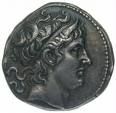
In 306 B.C.E. winning a great V over Ptolemy I at the naval Battle of Salamis in Cyprus, Antigonus I Cyclops (Monophthalmos) (One-Eyed) (-382 to -301) and his son Demetrius I Poliorcetes (Poliorketes) (the Besieger) (-336 to -283) are crowned as kings of Syria, beginning the demise of Alexander III the Great's dream of a single empire controlling the world and ruled by a blonde bi guy?
In 306 B.C.E. Agathocles concludes a peace with Carthage that lets him declare himself king of Syracuse two years later.

In 306 B.C.E. Pyrrhus (-319 to -272) becomes king of Epirus (until -272) under the care of guardians.

In 306 B.C.E. Samos-born Greek philosopher Epicurus (Gr. "ally/comrade") (-341 to -270) founds the Garden School in Athens, which teaches Epicureanism, the teaching that the purpose of philosophy is to attain a happy, tranquil life, characterized by peace and freedom from fear (ataraxia) and the absence of pain (aponia), preferably self-sufficient and surrounded by friends; pleasure and pain are the measures of what is good and evil; death is the end of both body and soul and should therefore not be feared; the gods neither reward nor punish humans; the universe is infinite and eternal; events in the world are ultimately based on the motions and interactions of atoms moving in empty space; too bad, he contracts kidney stones and dies in agony, claiming that "The cheerfulness of my mind, which comes from the recollection of all my philosophical contemplation, counterbalances all these afflictions."
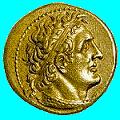

In 305 B.C.E. Alexander III the Great's polymath gen. Ptolemy I Soter (Gr. "savior") (-367 to -283), son of Lagus takes power in Egypt, becomng king #1 of the Hellenistic Egyptian Thirty-Second (32nd) (Ptolemaic) (Lagid) Dynasty, which lasts 275 years (until -30); Ptolemy I establishes the great Alexandria Museon (Museum-Library) (Museo) (dedicated to the Muses) in Egypt in honor of Alexander III the Great, whose body he had brought from Babylon and buried there; elite Greek scholars must complete the Logikon, a course in theoretical science before going on to the Cheirourgikon (experimental lab), incl. an observatory, botanical-zoological gardens, dissection rooms, et al.; the library is filled by royal decree, with all travelers visiting the city required to yield up any scrolls in their possession so that copies can be made and given to them; the museum cranks out pioneers incl. Euclid of Alexandria (-365 to -265) (geometry), Herophilus (Herophilos) (-335 to -280) (anatomy), Aristarchus of Samos (-310 to -230) (astronomy), Eratosthenes of Cyrene (-276 to -194) (astronomy), Hero (Heron) of Alexandria (10-70) (steam turbine and windmill-driven organ) et al.; destroyed in 642 C.E. by the Christians, er, Muslims.
In 305 B.C.E. Eudamidas I dies, and his son Archidamus IV (d. -275) becomes Eurypontid king #23 of Sparta.
In 305 B.C.E. Demetrius I sieges Rhodes (ends -304).
In 304 B.C.E. Ptolemy I assumes the royal title, founding the Egyptian 32nd (Ptolemaic) Dynasty (ends -30), followed immediately by Seleucus I, Lysimachus, and Cassander, which officially dissolves Alexander's empire.
In 304 B.C.E. after Ptolemy sends a relief force, Demetrius I's siege of Rhodes (begun -333) fails, and he gives up and goes on to relieve Athens from the Four Years' War waged against them by Cassander (begun -307); Rhodes sells its siege equipment for 300 talents and devotes it to building a colossal statue of their patron god Helios.
In 304 B.C.E. Agathocles of Syracuse comes to terms with Carthage and the expelled oligarchs and takes the title of king; the Tarentines are attacked by the Lucanians and call him for aid.
In 303 B.C.E. Cleonymus of Sparta fails against the Lucanians (Lucani) in Magna Graecia in S Italy.
In 303 B.C.E. Seleucus I Nicator cedes NW India to Chandragupta (Sandrocottus), rebuilds the city of Osroe (Chosroes), and founds the city of Edessa (named after the ancient capital of Macedonia) in SE Turkey (NW Mesopotamia) near the Syrian border (modern-day Urfa, pop. 560K); in the 2nd cent. B.C.E. it is known as Antiochia on the Calirrhoe, becoming the capital of the Kingdom of Osroene from -132 to 242; in 639 it falls to the Muslims; in 1098-1144 it becomes the capital of the Crusader County of Odessa before falling to the Turkic Zengid Dynasty and being absorbed by the Ottoman Empire in 1517.
In 302 B.C.E. Pyrrhus of Epirus is dethroned by an uprising led by Cassander of Macedonia; his cousin Neoptolemus II (d. -297), son of Alexander I of Epirus becomes king of Epirus (until -297).
In 302 B.C.E. Demetrius I revives the Hellenic League of Philip II, while Lysimachus, Seleucus I, Ptolemy I, and Cassander form an alliance against Antigonus I and Demetrius I - doesn't anybody read the Bible?
In 302 B.C.E. Lysimachus pacifies the region around Ephesus.
In 302 B.C.E. the Spartans under Cleonymus (Cleonimos) sail up the Po River, but are repelled by the Patavians (Veneti) from modern-day Padua (Patavium) on the Brenta River (modern-day pop. 214K) (oldest city in N Italy to survive to modern times) (which according to Virgil and Livy was founded in 1183 B.C.E. by Trojan prince Antenor); the Spartans try to take Tarentum, fail, then make an alliance with Tarentum against the Lucanians, causing Tarentum to lose faith with other Greek colonies.
In 302 B.C.E. Greek gen. Seleucus I gives up plans to invade India and makes an alliance with Maurya ruler Chandragupta, giving him his daughter in marriage, all of which increases Greek cultural influence in N India.
In 301 B.C.E. the Battle of Ipsus in Phrygia sees 81-y.-o. Macedonian king Antigonus I Monophtalmus (b. -382) and his son Demetrius I defeated by the combined armies of Cassander of Macedon, Lysimachus of Thrace, and Seleucus I Nicator of Babylonia-Persia after Antigonus I starts out winning with his war elephants, but neglects to wear his plate armor and is killed with a javelin, causing his army to disintegrate; Demetrius I escapes and continues to terrorize the Aegean with his fleet; Seleucus I receives the lion's share of Antigonus' territories, incl. a large part of Asia Minor and all of Syria, incl. Phrygia, and renames the ancient (2K B.C.E.) N Syrian city of Khalpe (Khalibon) (on the site of modern-day Aleppo) to Beroea (Veroea) after the Macedonian city, becoming the oldest continuously inhabited city to survive to modern times; Lysimachus receives C Asia Minor, and renames Antigonia to Alexandria Troas (Troas) after you know who the Great; Cassander is sole ruler of Macedonia, and his brother Pleistarchus is given Cilicia; Ptolemy I seizes Coele-Syria (S Syria and Palestine) from Seleucus I, who doesn't press his claim because of the former's aid in returning him to Babylon; the last chance to reunite Alexander the Great's empire is kaput.
In 301 B.C.E. Parchment, made of animal hides (and superior to papyrus because it can be printed on both sides and folded) is invented in Pergamon.
In 301 B.C.E. Macedonian satrap Amyntas is defeated by Ariarathes I's adopted son (eldest son of his beloved brother Holophernes) Ariarathes II (d. -280) with the assistance of Armenian king Ardoates, and becomes ruler of Cappadocia (until -280) under Seleucid suzerainty.
In 301 B.C.E. Olympiodorus (d. -285) becomes ruler of Athens.
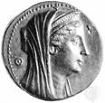
In 300 B.C.E. King Lysimachus of Thrace marries Arsinoe II (-316 to -270), full sister of Ptolemy II, and renames Ephesus after her - dirty old man cradle robber?
In 300 B.C.E. Agathocles of Syracuse invades Italy and establishes his power in Bruttium.
In 300 B.C.E. King Seuthes III of the Ordysian kingdom dies after obtaining partial autonomy in Thrace.

About 300 B.C.E. Greek mathematician Euclid of Alexandria (-325 to -265) pioneers deductive mathematics, and proves the infinitude of the prime numbers, providing the first examples of formal mathematical proofs and algorithms. In -295 he pub. Optica, the first text on geometrical optics. He dies leaving his 13-vol. masterpiece Elements [of Geometry] - and two Alexandrian Compasses in the garage? "There is no royal road to geometry."

About 300 B.C.E. Citium, Cyprus-born Greek philosopher (of Phoenician descent?) (Crates of Thebes' pupil) Zeno of Citium (-334 to -262) founds the Stoic School of Philosophy in Athens, named from the Stoa Poikile or Painted Porch in Athens, which teaches that it is man's duty to accept his fate, that virtue is the highest good, and that the passions (destructive emotions) are to be condemned and moral and intellectual perfection to be sought by purging them in favor of goodness and peace of mind, stressing the life of virtue in accordance with Nature; when he dies, Cleanthes of Assos (d. -232) (from the town of Assos in coastal Asia Minor, where Aristotle later opens an Academy) becomes head of the Stoic School in Athens, going on to give materialism a religious flavor by comparing the Universe to a human being and the fixed stars to its soul, which makes it okay to worship them, and composes a Hymn to Zeus, praising cosmic order, law, and universal reason - sounds a lot like the Hebrew Jehovah?
In the 3rd cent. B.C.E. Iberian culture flowers under Greek and Carthaginian influence - let's get the party going, it's still anybody's game?
In the 3rd cent. B.C.E. Greeks begin working as teachers in Rome, and upper-class Romans begin learning Greek - by -146 every Roman aristocrat can own one?
In the 3rd cent. B.C.E. Chaldean priest Berosus (Berossus) ("Bel is his shepherd") brings astrology to Greece.
In the 3rd cent. B.C.E. the city of Scupi (modern-day Skopje) (Gr. "skopein" = lookout") on the Vardar River in Macedonia on the N-S route between the Balkans and Athens (modern-day pop. 506K) is founded by the Celtic Dardanians (Dardani) ("oak people") of Paionia (Macedonia), who make it the capital of Dardania in the next cent.
In 299 B.C.E. Demetrius I, with aid from Seleucus I expels Cassander's brother Pleistarchus from Cilicia.
In 298 B.C.E. Cassander dies, and his young sons Antipater and Alexander V rule jointly in Macedon, but soon have a falling out.
In 297 B.C.E. after returning with backing from Ptolemy I and agreeing to rule as co-king, Pyrrhus regains his throne in Epirus, killing chump Neoptolemus II and becoming sole king, later founding the seaport of Antigonia (Antigonea) (later Troas) in Chaonia on the Aegean Sea in NW Asia Minor, posth. named for one of his wives, Antigone (-318 to -295), daughter of Berenice.
In 297 B.C.E. Philip IV (d. -297), son of King Cassander becomes king of Macedonia, but dies 4 mo. later during an invasion of Greece, and his brother Alexander V (d. -294) becomes sole king of Macedonia; his brother Antipater II (d. -297) vies for the throne.
In 297 B.C.E. Prince Zipoites I of Bithynia leads a revolt against Macedonian rule, and becomes king #1 of Bithynia (until -278).
In 296 B.C.E. Ptolemy I acquires Pamphylia and Lycia from Demetrius I.
In 295 B.C.E. Demetrius I sieges and recovers Athens; Lachares and Phaedros are elected rulers of Athens.
In 295 B.C.E. Greek physician ("the Younger Hippocrates") Diocles of Carystus (b. -375) dies after writing the first medical treatise in Attic (not Ionic), and inventing a surgical instrument for the extraction of arrowheads called the Spoon of Diocles (Dioclean Cyathiscus); also leaves A Letter on Preserving Health, addressed to Antigonus II Gonatas of Macedon (-319 to -239).
In 294 B.C.E. Demetrius I kills Alexander V, son of Cassander, seizes Macedonia, then sets his sights on NE and C Greece, eventually taking all of it except Aetolia.
In 294 B.C.E. Greek physician Erasistratus of Ceos (-304 to -250) diagnoses Seleucis I Nicator's eldest son Antiochus I Soter as lovesickness, and when asked who it is, he claims it's his own wife, causing Seleucus I to pontificate that he should give her up, whereupon he reveals that it's really his own hot new queen Stratonice, causing Seleucus I to give her up; Erasistratus goes on to co-found the Medical School of Alexandria with Herophilus of Chalcedon (-335 to -280); after doing the first dissections (vivisections)? Erasistratus studies the brain, distinguishing between the cerebrum and cerebellum; Herophilus studies the nervous system, distinguishing between sensory and motor nerves; Herophilus calls the pineal gland a "sphincter which regulates the flow of thought".
In 294 B.C.E. Lachares, Phaedros, and Olympiodorus are elected rulers of Athens.

In 293 B.C.E. after revolting in -313, the Thracian Getae (Getai) (Gets) tribe of the Lower Danube River under king (since -300) Dromichaetes (Dromichaites) (d. -280) defeats and captures Macedonian king of Thrace (since -306) Lysimachus (-360 to -281), who is released after he grants their independence.

In 293 B.C.E. the 107-ft.-high Colossus of Rhodes (the Greek god Helios) (finished in -282) is begun by Chares of Lindos to celebrate the V in -304 over Demetrius I, using iron tie bars with a shiny brass skin that never tarnishes, mounted on a 50-ft.-high white marble pedestal near the Mandraki Harbor entrance, all compliments of materials and weapons left behind; too bad, it is destroyed in an earthquake in 226 B.C.E.
In 290 B.C.E. the Aetolian (Aitolian) League in Aetolia in W Greece is formed by the semi-barbarian Aetolians to fight the Achaean League and Macedonia, holding biannual meetings in Thermika and Panaetolia, occupying Delphia and expanding over all of C Greece outside of Attica and Boeotia by the end of the cent.
In 290 B.C.E. Ptolemy I Soter orders the construction of the (Pharos) Lighthouse of Alexandria (finished in -275 by his son Ptolemy II).
In 289 B.C.E. Agathocles (-361 to -289), tyrant of Syracuse (since -317) and king of Sicily (since -304) dies after returning to Syracuse and restoring democracy and prohibiting his sons from succeeding him as king; too bad, a band of Campanian mercenaries calling themselves the Mamertines ("sons of Mars") seize Messina (Messana) and begin raiding the trade of Syracuse.
In 288 B.C.E. King Pyrrhus of Epirus and King Lysimachus of Thrace drive Demetrius I out of Macedonia, and he flees to Syria.
In 287 B.C.E. Olympiodorus and Demochares are elected rulers of Athens.
In 287 B.C.E. Lysimachus builds a 6 mi. (10 km.) circumference wall around Ephesus.
In 287 B.C.E. Theophrastus (b. -371) dies, and his pupil Strato of Lampsacus (-335 to -269) becomes dir. #3 of the Lyceum in Athens.
In 286 B.C.E. Pyrrhus takes Thessaly and the W half of Macedonia.
In 286 B.C.E. Demetrius I attempts to campaign in Asia Minor, but is captured and imprisoned by Seleucus I in Cilicia.
In 286 B.C.E. Ptolemy I acquires Caria and the island of Cos.
In 285 B.C.E. Ptolemy I's son Ptolemy II Philadelphus becomes co-regent of Greek-run Egypt.

In 283 B.C.E. Demetrius I dies in captivity, and his son Antigonus II Gonatus ("Knock-Kneed") (-319 to -239) claims the throne of Macedonia.
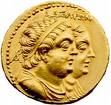
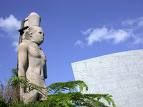
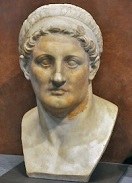
In 283 B.C.E. Macedonian Greek gen. Ptolemy I (b. -367) dies after telling Euclid of Alexandria that his Elements is too hard to study and receiving the reply "There is no royal road to geometry", leaving History of the Conquests of Alexander; after a catfight between his 3rd and 4th wives Eurydice (daughter of Antipater of Macedon) and Berenice I, his co-regent (since -285) son Ptolemy II Philadelphus (-309 to -246) (Berenice I's son) becomes king #2 of the Egyptian 32nd (Ptolemaic) Dynasty, sole ruler of Egypt and Libya, and is crowned next Jan. 7, pissing-off Euyrice's son Ptolemy Keraunos (Ceraunus) ("thunderbolt") (d. -279) (ceramic anus?), who had grown up thinking he would be Ptolemy I's heir, causing him to move to the court of Lysimachus, king of Macedonia, Thrace, and W Asia Minor, whose wife Arsinoe II is his half-sister.
In summer 282 Seleucus I begins preparing his army after Arsinoe II poisons her hubby Lysimachus' mind against his son and intended heir Agathocles and gets him to order his execution, and Agathocles' wife Lysandra and her brother Ptolemy Keraunos flee to his court in Babylon, asking for aid to place a son of Agathocles and Lysandra on the throne.
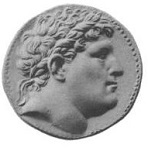
In 282 B.C.E. Lysimachus deposits 9K talents of gold with his general Philetaerus (-343 to -263), who uses it to set up the Attalid Kingdom in Pergamon (Pergamos, Pergamum, Pergamom, Akropol).
In 282 B.C.E. the Colossus of Rhodes (begun -293) is completed; too bad, it only lasts 56 years (until -226).
In 281 B.C.E. the Tarentines send an embassy to Pyrrhus of Epirus offering him command of their combined armies, and Tarentum asks for his assistance against Rome, causing visions of becoming the successor to his distant kinsman Alexander III the Great and conquering first Rome then the entire Western World to dance in his head.

In Feb. 281 B.C.E. after appointing his son Antiochus as his successor, Seleucus I (b. -358) defeats and kills Lysimachus (b. -361), ruler (since -306) of Thrace, Macedonia, and Asia Minor at the Battle of Corupedion (Corupedium) in Lydia near Magnesia ad Sipylum, winning all of Asia Minor and proclaiming himself king of Macedon; in Aug.-Sept. after crossing the Hellespoint en route to seizing Thrace and Macedonia, Seleucus I is treacherously assassinated (stabbed) by Ptolemy Keraunos, disinherited son of Ptolemy I Soter, earning him the nickname "thunderbolt", and Seleucus I's son Antiochus I Soter ("savior") (-324 to -261) becomes king of Syria, while Keraunos takes Macedonia (until -279), beginning the First War of Succession (ends -279) with Ptolemy II Philadelphus.
In 280 B.C.E. Pyrrhus sails for Tarentum with 20K foot, 3K horseman, 2K archers, 500 slingers, and 20 elephants, and gains a complete but costly V over the Romans at the Battle of Heraclea on the Siris River in Lucania by stampeding his elephants on the not-knowing-what's-going-on Romans after a long and bloody battle, becoming the original "Pyrrhic victory" when it depletes his forces too much to become the next Alexander III the Great, and after penetrating to within 20 mi. of Rome and failing to fake-out the Romans into surrendering he withdraws to winter quarters back in Tarentum.
In 280 B.C.E. the Second Achaean League is formed by 12 towns in the N Peloponnese.
In 280 B.C.E. Ariarathes II dies, and his eldest son Ariamnes II (d. -230) becomes ruler of Cappadocia (until -230), going on to share his throne with his son Ariathes III and gain independence from the Seleucid Empire.
About 280 B.C.E. the Gallic invasion of the Balkans sees an 85K-man army of Celtic Gauls from overpopulated Pannonia led by Cambaules and Brennus ("duke") (Acichorius?) (d. -279) invade the Balkans, eaching Thrace and splitting into three groups, with Brennus' group invading Paionia (Paeonia) N of Macedonia, group #2 led by Cerethrius, Leonnorius and Lutarius invading Thrace and Triballi, and group #3 led by Bolgius (Bolgios) (Belgius) invading Macedonia and Illyria.

About 280 B.C.E. after Ptolemy I Soter ordered its construction shortly after announcing himself king in -305, the 394 ft.-449 ft. (120m-137m) 800-talent limestone (Pharos) Lighthouse of Alexandria is finished by his son Ptolemy II Philadelphus on the small island of Pharos on the W edge of the Nile Delta, served by the port of Eunostos and its inner basin Kibotsos, connected with the Great Harbor of Alexandria to the E by the 1.2Km (7 x 180m) Heptastadium mole, becoming the world's first important lighthouse, guiding ships into the harbor for 1.6K years before being toppled by an earthquake in 1323 C.E.; the light is created by a furnace at the top; it is allegedly designed by Greek architect-engineer Sostratus of Cnidus; it is badly damaged by an earthquake in 956 C.E.; the last of its stones are used in 1480 C.E. to build the Citadel of Qaitbay; in 1994 C.E. French archeologists discover some of its remains; the mole is gradually filled-in, becoming the modern Ras el-Tin quarter of Alexandria.
In spring 279 B.C.E. after they offer Ptolemy Keraunos the chance of paying them to keep them from attacking, and he underestimates them and turns down an offer of 20K soldiers from the Dardanians, then refuses to aid the tribes of Thrace against them, causing them to switch sides, the Celtic Gauls of Bolgius invade Macedonia and kick Ptolemy II's Keraunos' ceramic anus and capture and behead him after he is thrown by his his elephant, parading his head around on a spear, leaving Macedonia in anarchy, with rulership claimed successively by Keraunos' brother Meleager, Antipater Etesias, and Sosthenes; the First War of Succession in Syria (begun -280) ends by default; too bad, the Gauls don't follow-up their V in Macedonia, and Macedonian gen. Sosthenes (d. -277) assembles an army that forces Bolgius' troops to withdraw, only to be defeated by more Gauls under Brennus, after which 30K Gauls under Brennus defeat the Greeks at the Second Battle of Thermopylae after being held back for several mo. with heavy losses by the Phocians and Aetolians, who escape by sea, but are turned back at the Battle of Delphi after the Greek gods allegedly send them bad weather and the Celts go mad and slay 26K of each other; Brennus dies of his wounds, while his army retreats to the Spercheios River, only to be routed by an army of Thessalians and Malians; Arsinoe II flees to Alexandria after Ptolemy II Philadelphus executes her two younger sons.
In 279 B.C.E. Greek skeptic philosopher Timon of Phlius (-320 to -230), a disciple of Greek skeptic Pyrrho gives 'em hell with the line that people only need to know three things, their nature, how we are related to them, and what we can gain from them, but since our knowledge must always be subjective and unreal, we can only live in a state of suspended judgment - I prefer a real Savior?
In 278 B.C.E. Pyrrhus campaigns against the Carthaginians in Sicily to help the Sicilian Greeks (until -276), and conquers all of it except Lilybaeum (Marsala); too bad his despotic I'm-Alexander-the-Great-eat-me attitude pisses-off the Greek cities, who withdraw their support in his fight against Rome, giving them time to recover?
In 278 B.C.E. Zipoites I (b. -354) dies, and his eldest son Nicomedes I (-300 to -255) becomes king #2 of Bithynia, killing two of his three brothers, while #3 Zipoites II sets up an independent kingdom in Bithynia; meanwhile Antiochus I Soter of Syria invades, but withdraws without a battle after Nicomedes I allies with Heraclea Pontica and Antigonus II Gonatus.
In 278 B.C.E. C Anatolia is occupied by the Celtic Galatians, who make Ankara the HQ of the Tectosages tribe, Pessinos (modern-day Balhisar) the HQ of the Trocmi tribe, and Tavium E of Ancyra as the HQ of the Tolstibogii tribe.
In 277 B.C.E. an army of 20K Gauls led by Leonnorius et al. siege Byzantium and force them to pay tribute, gaining control of Lysimachia; they then luck out when Nicomedes I of Bithynia allies with them in an effort to rid his kingdom of his pesky brother Zipoites II, and helps them cross into Asia Minor to defeat and kill the pest, allowing Big Nick to become sole ruler of Bithynia; the Gauls then advance into Phrygia and colonize Galatia in the Kizil Irmak and Delice Irmak River basins on the great central plateau of Asia Minor, with capital at Ancyra (modern-day Ankara) (225 mi. ENE of Byzantium), mixing with a gaggle of Greeks and raising sheep and goats; meanwhile back in Macedonia, Antigonus II Gonatas defeats the Gauls under Cerethriius at the Battle of Lysimachia, and recovers Macedonia from the "wild men", establishing the Antigonid Dynasty (ends -168); the defeated Gauls move inland to Thrace and establish a kingdom with capital at Tyle (Tylis) (modern-day Kazanluk) (ends -211) - Spartacus' great-great-?-grandfather might be a Celt?
In 276 B.C.E. the Greek Sicilians revolt against Pyrrhus, and he returns to Italy, crossing from Epirus to Brindisi (on Italy's heel), intending to kick Roman butt all along the Appian Way to Rome.
In 276 B.C.E.
The Alexandrian Library gets its finest scientist, but too bad, books always flow into it, but hardly ever out?
In 276 B.C.E. Greek mathematician-geographer-astronomer ("greatest of all ancient geographers") ("founder of geodesy") Eratosthenes of Cyrene (-276 to -194) is born in Cyrene, Africa, becoming a pupil of grammarian Lysanias and poet Callimachus; he goes on to estimate the Earth's circumference by measuring noon Sun angles in wells at Aswan and Alexandria, coming within 50 mi. of the correct value (approx. 25K mi.), and suggesting that the Sun moves around the Earth; he also measures the obliquity of the ecliptic with an error of 7 min. of arc; he maps the course of the Nile River, adding the British Isles, India, and Ceylon to the map of the world; it takes until 1670 C.E. for Christian Europe to catch back up?

In 275 B.C.E. the Romans under Manius Curius Dentatus (d. -270) defeat Pyrrhus at the Battle of Malventum (Beneventum) ("bad wind"); Pyrrhus withdraws to Tarentum, decides to give up conquering the Romans and returns to Epirus, leaving Gen. Milo to defend it; Hiero II (-308 to -215), bastard son of Syracusan noble Hierocles is chosen as cmdr. of the army of Syracuse; the Romans establish a colony at Malventum, which they rename to Beneventum (Benevenuto)("good wind").
In 275 B.C.E. the Seleucids defeat the Gauls in Galatia.
In 275 B.C.E. Archidamus IV dies, and his son Eudamidas II (d. -244) becomes Eurypontid king #24 of Sparta.
In 275 B.C.E. Greek-speaking Jews in Alexandria persuade Ptolemy II to order a Greek trans. of the Hebrew scriptures (Pentateuch) for the library of Alexandria, the Septuagint (Lat. "seventy"), a Greek trans. of the Hebrew scriptures sponsored by Egyptian king (-283 to -246) Ptolemy II Philadelphus (-309 to -246) (benefactor of the Alexandrian Library-Museum), begun by guess how many Hellenistic Jews in Alexandria (finished by -50).
In 274 B.C.E. the First Syrian War between Antiochus I and Ptolemy II Philadelphus begins (ends -271).
In 274 B.C.E. Pyrrhus of Epirus, subsidized by Ptolemy II Philadelphus invades Macedonia, and defeats Antigonus II Gonatus after Macedonian troops join his army, driving Agonized Gonads II from Macedonia.
In 274 B.C.E. Cyrene becomes independent (until -248).
In 273 B.C.E. Pyrrhus is called to Greece by Cleonymus, pretender to the Spartan throne.
In 272 B.C.E. Pyrrhus (b. -319) invades the Peloponnese with 25K infantry, 2K cavalry and 24 elephants to restore Cleonymus, and is met by Sparta and a coalition of Greek city-states; at the walls of Sparta the spunky Spartans tell Pyrrhus, "If thou art a god, thou wilt not hurt those who have never injured thee; if thou art a man, advance, and thou wilt find men equal to thyself" (Plutarch); Pyrrhus is paralyzed and KIA during a street fight in Argos by one of Antigonus II's soldiers (struck by a tile?); Antigonus II returns to Macedonia, establishing control of Greece by garrisoning Corinth, Chalcis (Euboea), and Demetrius (Thrace), making peace with the Aetolian League and backing pro-Macedonian tyrants in the Peloponnesus; with Pyrrhus kaput, Gen. Milo surrenders Tarentum, and the Romans win the Pyrrhic War (begun -282), and with it almost all of Italy S of the Po Valley, conquering the Brutti, Lucani, and Samnites, and garrisoning Tarentum and other Greek cities in S Italy; much of Sicily remains under Carthaginian control.
In 271 B.C.E. Ptolemy II's Egypt defeats the Seleucids, ending the First Syrian War (begun -274); Syria loses Miletus, Phoenicia, W Cilicia, Pamphylia, and Lycia.

In 270 B.C.E. the Mamertines holding Messina (Messana) and harrassing the Syracusans are defeated by Hiero II of Syracuse at the Battle of Mylae (modern-day Milazzo) on the Longanus River; the Mamertimes call on the Carthaginians and Romans for aid, and the Carthaginians arrive first and capture the city, putting in a garrison at Messina; Carthage now becomes the guardian of sea law in the Mediterranean Sea; his military successes against the Mamertines cause the grateful citizens of Syracuse to elect former gen. of Pyrrhus of Epirus Hiero II (-308 to -215) as their king (tyrant) (until -215), becoming a wise and just ruler, later employing his kinsman Archimedes to engineer advanced hi-tech defense equipment to save the kingdom from the nasty Romans; he builds the Altar of Hiero II in memory of the fall of tyrant Thrasybulos in -466, which is celebrated annually in the Feast of Zeus Eleutherios (Zeus of Freedom) with a sacrifice of 450 bulls followed by a feast.
About 270 B.C.E. Greek poet Theocritus from Syracuse flourishes, creating Greek bucolic poetry.
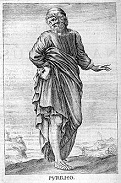
In 270 B.C.E. Greek skeptic philosopher (first) Pyrrho of Elis (-360 to -270) dies, becoming the inspiration for the 1st cent. B.C.E. Greek Skeptic (Pyrrhonist) School of Anesidemus of Cnossos, which teaches that man is unable to know the real nature of the world or how it came into being (acatalepsia), and that instead of searching for the unknowable men should be practical, follow custom, and accept the evidence of their senses, freeing themselves from worry (ataraxia) - if only man could settle for that?
In 269 B.C.E. Strato of Lampsacus (b. -335) dies, and his student Lyco (Lycon) of Troas (-299 to -225) succeeds him as dir. #4 of the Lyceum in Athens.
In 268 B.C.E. Ptolemy II Philadelphus of Egypt stirs up (and subsidizes) Athens, led by Chremonides to issue the Decree of Chermonides, declaring an alliance between Athens, Sparta, and Egypt against Antigonus of Macedon, causing the Chremonidean War with knock-kneed Macedonia next year (ends -261).
In 267 B.C.E. Chremonides and Glaukon are elected rulers of Athens.
In 265 B.C.E. Areus I dies after introducing coined money, and his son Acrotatus (d. -262) (grandson of Acrotatus I) becomes Agiad king of Sparta, which is sagging under the concentration of land and wealth in too few hands, causing Phylarchus to accuse him of corrupting the simplicity of Spartan manners.
In 265 B.C.E. the Romans first learn about Greek medicine from captured POWs.
In 265 B.C.E. Greek geometer Euclid (b. -325) dies, leaving his 13-vol. masterpiece Elements [of Geometry]: "There is no royal road to geometry" - levaes two Alexandrian Compasses in the garage?
In 264 B.C.E. Nicomedes I founds Nicomedia (modern-day Izmit) as the capital of Bithynia (NW Asia Minor), replacing nearby Astacus (Askatkos); it flourishes for the next six cents.
In 263 B.C.E. Macedonia begins a 2-year siege of Athens (ends -262).

In 263 B.C.E. Philetaerus dies, and his nephew Eumenes I (d. -241) becomes king of Pergamon (Pergamum) (until -241); Ptolemy II Philadelphus then incites him to revolt from Antiochus I, becoming virtually independent.
In 263 B.C.E. the rebuilt Temple of Artemis in modern-day Selcuk, Turkey is destroyed.
In 262 B.C.E. after Ptolemy II fails to give aid, Athens surrenders. Agrigentum (modern-day Agrigento) on the S coast of Sicily is captured by Rome after a trench war and the loss of 30K Romans through plague and starvation and war; the Carthaginians evacuate to the fortified towns on the W coast of Sicily, anchored by Lilybaeum, where the Carthaginian fleet can easily supply them from Africa.
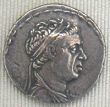
In 262 B.C.E. Ariamnes II dies, and his co-ruler son Ariarathes III (d. -220) becomes sole ruler of Cappadocia, going on to proclaim himself king (basileus) about -250 and add the Plain of Cataonia to his dominions.


In 262 B.C.E. Zeno of Citium (b. -334) dies, and Cleanthes of Assos (d. -232) (from the town of Assos in coastal Asia Minor, where Aristotle later opens an Academy) becomes head of the Stoic School in Athens, going on to give materialism a religious flavor by comparing the Universe to a human being and the fixed stars to its soul, which makes it okay to worship them, and composes a Hymn to Zeus, praising cosmic order, law, and universal reason - sounds a lot like the Hebrew Jehovah?
In 262 B.C.E. Acrotatus dies, and his son Areus II (d. -254) becomes Agiad king of Sparta (until -254).
In 261 B.C.E. the Chremonidean War (begun -268) ends with a Macedonian V, and Antigonus II garrisons several strong points in Attica while imposing a moderate oligarchy on Athens.

In 261 B.C.E. Antiochus II Theos ("god") (-286 to -246) succeeds his father Antiochus I Soter ("savior") as king of Syria (until -246) - god the son?
In 261 B.C.E. the Romans begin building a new fleet of quinqueremes based on a captured Carthaginian vessel; in 2 mo. they build 100 of them, plus 30 triremes; having no naval skills, they scrap the Carthaginian tactic of ramming or breaking the oars of enemy ships, and instead invent the corvus, a long drawbridge which they swing down on the enemy deck and swarm soldiers over.
In 260 B.C.E. the Second Syrian War begins between Antiochus II and Ptolemy II (ends -253); Antiochus II secures the support of Antigonus II and Rhodes.
In 260 B.C.E. Archimedes discovers the law of buoyancy in his bath, shouting "Eureka!"
About 260 B.C.E. Aristarchus of Samos pioneers the theory that the Sun is the center of the Solar System.
In 259 B.C.E. Ptolemy III completes the seizure of Ephesus.
In 258 B.C.E. Antigonus II of Macedonia defeats Ptolemy II of Egypt in the naval Battle of Cos, and takes the Cyclades.
In 255 B.C.E. Antigonus II and Ptolemy II sign a peace, giving the former Cilicia and W Pamphylia.
In 255 B.C.E. Nicomedes I dies, and after she pussy-whips him into it, his 2nd wife Etazeta of Bithynia ends up as regent for her infant sons, pissing-off his eldest son (by first wife Ditizele) Ziaelas (d. -228), who starts a civil war with the help of the Galatian Gauls, causing her to marry Nicomedes I's brother and ally with Antigonus III Doson of Macedonia (ends -254).
In 254 B.C.E. Ziaelas defeats Etazeta and she flees to Macedonia with her sons; Ziaelas becomes king #3 of Bithynia (until -228).

In 254 B.C.E. Areus II dies, and Leonidas (Gr. "lion-like") II (d. -235) becomes Agiad king #28 of Sparta.
In 251 B.C.E. Aratus of Sicyon (-271 to -213) recovers Sicyon from the Macedonian-backed tyrant Nicocles and deposes him, then joins the Achaean League, soon dominating it.
About 250 B.C.E. Greek academic skeptic philosopher Arcesilaus (-316 to -240) founds the Second (Middle) Academy in Athens.
About 250 B.C.E. the principles of the lever, compound pulley, and other simple machines are developed by Archimedes.
In 249 B.C.E. Peloponnesian gov. Alexander of Corinth (d. -245) revolts from Antigonus II, and holds the peninsula until his death in -245.

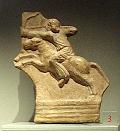
In 248 B.C.E. Arsaces I (d. -211), new leader of the Parni tribe in E Iran begins a war to oust the Syrians under Antiochus II, defeating and killing Seleucid satrap Andragoras in -238 and capturing Astabene (Astauene); next year he founds the Zoroastrian Parthian (Arsacid) Empire (ends 224 C.E.), SE of the Caspian Sea in modern-day Afghanistan and NE Iran between the Seleucid Kingdom in the W and the Bactrian Kingdom in the E; they inherit a mix of Greek and Persian culture, and become known for their multicultural tolerance; Parthian soldiers are given seven years of physical training then awarded a special belt, and like to wear mustachios; their horse archers become known for their trick of pretending to flee then shooting arrows back at the enemy when their guard is down, AKA the Parthian Shot (parting shot).
In 247 B.C.E. the Achaean League drives the Macedonians from Corinth.
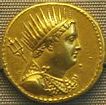

On Jan. 29, 246 B.C.E. Ptolemy II (b. -285) dies, and his son (who as crown prince has already put down a revolt in Cyrenaica) Ptolemy III Euergetes ("benefactor") I (d. -222) becomes king #3 of Egypt's 32nd (Ptolemaic) Dynasty, and soon receives an urgent call for help from his sister (Antiochus II's 2nd wife) Berenice II, who is under siege by Laodice I, beginning the Third Syrian (Laodicean) War (War of Berenice) between Ptolemy III and Seleucus II (ends -241); Berenice II and her infant son are murdered in Antioch before Ptolemy III arrives in Asia Minor, taking Antioch, then moving E to take Babylon and Seleucia-on-the-Tigris; Antiochus II Theos is poisoned by his first (divorced) wife Laodice I in Asia Minor, and her son Seleucus II Callinicus ("gloriously victorious") (-265 to -226) becomes Seleucid king of Syria (to -226).
In 246 B.C.E. Antigonus II Gonatas of Macedonia reconquers the Cyclades from Ptolemy III Euergetes of Egypt in the naval Battle of Andros.
In 246 B.C.E. Ctesibus of Alexandria invents the hydraulis (water organ), a mechanical flute-playing instrument whose wind pressure is regulated by water pressure, becoming the first organ, and him the first organist; it takes until the 6th-7th cent. for bellows to be invented.
In 245 B.C.E. Eudamidas II dies, and his reformer son Agis IV (-265 to -241) becomes Eurypontid king #25 of Sparta (until -241), becoming known as idealistic but impractical.
In 243 B.C.E. the Achaean League takes Corinth from Macedonia.

In 243 B.C.E. King Leonidas II of Sparta goes into exile until -241; his son-in-law Cleombrotus II rules during his absence.

In 241 B.C.E. Eumenes I dies, and cousin's son Attalus (Attalos) I Soter (Gr. "savior") (-269 to -197) comes to power in the city of Pergamon in NW Turkey, and defends the city from the dying, er, invading Gauls, taking the title of "savior".
In 241 B.C.E. Agis IV is executed for attempting agrarian reform (dividing the land into 4.5K equal lots rather than giving it only to the 700 it had fallen to) and trying to introduce the Lycurgan constitution, and his infant son Eudamidas III (-240 to -228) becomes Eurypontid king of Sparta (until -228), with regents ruling in his place.
In 240 B.C.E. Halley's Comet can be traced back to this year (76-year cycle); it tends to appear four years before a war breaks out?

In 239 B.C.E. Antigonus II Gonatas dies, and in the winter his son Demetrius II (d. -229) becomes king of Macedonia (until -229); after he protects Epirus against the Aetolian League, it breaks with Macedonia and allies with the Achaean League.

In 239 B.C.E. Diodotus I of Bactria allies with Seleucus II against the Parthians and is killed, and his son Diodotus II (d. -230) becomes king of Bactria (until -230).
In 238 B.C.E. Demetrius II of Macedonia attacks Aetolia, beginning the War of Demetrius (ends -229).
In 235 B.C.E. king Leonidas II of Sparta dies, and reformer Cleomenes III (-260 to -219) becomes Agiad king of Sparta (until -222) after marrying the widow of Agis IV, going on to imitate Agis II and become Sparta's most energetic king, trying to restore the prestige while waging wa against the Achaean League under Aratus of Sicyon.
In 233 B.C.E. Macedonia is attacked by invaders from the N, causing Demetrius II to break off his attack on Aetolia.
In 232 B.C.E. after the Celtic Galatians in Asia Minor side with renegade Seleucid prince Antiochus Hierax, and the Hellenized cities unite behind him and inflict several defeats on them, they are forced to settle permanently in modern-day Galatia, with the Tolistobogii in the W around their capital Pessinus, the Tectosages in the C around their capital Ancyra, and the Trocmi in the E around their capital Tavium.

In 232 B.C.E. Agron dies, and the Illyrian Ardiaei throne is occupied by his wife Queen Teuta (Tefta) (d. -227), the "Catherine the Great of Illyria", acting as regent for her son Pinneus; she drives the Greeks off the Albanian coast, then considers piracy as a lawful trade and begins attacking Roman ships in the Ionian Sea.
In 231 B.C.E. Epirus joins the Aetolian and Achaean Leagues against Demetrius II of Macedonia.
About 230 B.C.E. oil lamps begin to be used in Greece.
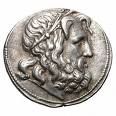
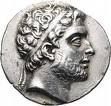
In 229 B.C.E. Demetrius II Aetolicus dies, and his Antigonid cousin Antigonus (Antigonos) III Doson (Gr. "going to give", "always promising") (-263 to -221) becomes guardian of Demetrius' 8-y.-o. son Philip V (Demetrius III) (-238 to -179), going on to marry his mother and become king of Macedon (until -179); the War of Demetrius (begun -238) ends; Argos expels pro-Macedonian tyrant Aristomachus and joins the Achaean League; Athens declares independence from Macedonia.
In 229 B.C.E. War breaks out between Sparta and Achaea.
In 229 B.C.E. Attalus I of Pergamum drives Antiochus Hierax out of Asia Minor (ends -228).
In 229 B.C.E. Eurycleides and Mikion are elected rulers of Athens.
In 228 B.C.E. Seleucus II Calinicus gathers an army in Babylonia to recapture Parthia.
In 228 B.C.E. Cleomenes III defeats the Achaean League under Aratus of Sicyon, then seizes power in Sparta, redivides the land, enfranchises 4K perioikoi, and abolishes the ephorate, forming a larger citizen army.
In 228 B.C.E. Eudamidas III dies, and Archidamus V (d. -227) becomes Eurypontid king #27 of Sparta.
In 228 B.C.E. Ziaelas is killed by some Galatian Gauls, and his son Prusias I Chlorus (-228 to -182) becomes king #4 of Bithynia, going on to form a marriage alliance with Philip V of Macedon.
In 227 B.C.E. Archidamus V is deposed by Cleomenes III, who poisons Eurydamidas and installs his Agiad brother Eucleidas (d. -222) becomes Eurypontid king of Sparta (until -222); Cleomenes III of Sparta starts a war with the Achaean League.
In 227 B.C.E. Arsaces I returns victorious to Parthia after Seleucus II withdraws.
In 227 B.C.E. Antigonus III Doson takes the throne of Macedonia from Demetrius III (Philip), then makes peace with Aetolia and drives the northern tribes out of Macedonia.
In 227 B.C.E. Seleucus drives Antiochus Hierax out of Syria to Celt-run Thrace, where he is killed next year.

In 226 B.C.E. Seleucus II dies, and his son Seleucus III Soter Keraunus (Ceraunus) ("thunderbolt") Soter (Gr. "savior") (-241 to -223) becomes king of Syria (until -223).
In 226 B.C.E. the 226 B.C.E. Rhodes Earthquake destroys the Colossus of Rhodes, causing it to snap at the knees and fall over onto the land; it also destroys the city of Camirus along with its temple; Ptolemy III offers to pay for the reconstruction of the Colossus of Rhodes until the Oracle of Delphi nixes it; the ruins lay around for the next eight cents. (until 654 C.E.), becoming a tourist attraction, with people wrapping their arms around the fallen thumb for a photo opp.
In 225 B.C.E. Cleomenes III of Sparta bests Aratus of Sicyon, causing him to appeal to Antigonus III for help.
In 225 B.C.E. Lyco (b. -299) dies, and his student Aristo of Ceos (d. -190) succeeds him as dir. #5 of the Lyceum in Athens, leaving Conversations in Love, and a bio. of his master Lyco.
In 224 B.C.E. Syria and Pergamon start a war (ends -221).
In 224 B.C.E. the Achaean League requests Macedonian aid against Sparta and the Aetolian League.

In 223 B.C.E. after Seleucus III is murdered during his war with Attalus I of Pergamum, his younger brother Antiochus III (the Great) (-243 to -187) becomes king of Syria (until -187).
In 223 B.C.E. Archimedes is accused of impiety.
In 222 B.C.E. Megalopolis is destroyed by Cleomenes III of Sparta, but is later restated by Achean League leader Philopoemen; a new Hellenic League, consisting of the Achaean League allied with Antigonus III Doson of Macedonia routs the Spartan army in the Battle of Sellasia, and takes possession of Sparta, making it kaput as a political entity; Cleomenes III flees to Egypt to the protection of his patron Ptolemy III; Antigonus abolishes the Spartan kingship, restores the ephors, and forces Sparta to join his league.

In 221 B.C.E. Antigonus III Doson dies, and his adopted son Philip V (-238 to -179) becomes king of Macedonia (until -179), going on to attempt to maintain Macedonian hegemony over the Greek city-states but ultimately blundering them into Roman domination.
In 221 B.C.E. the war between Syria and Pergamon (begun -224) ends with Syria recovering most of the territory lost since -241; the Fourth Syrian War (ends -217) between Antiochus III and Ptolemy IV begins.
In 220 B.C.E. Spartan king Cleomenes III escapes, then tries to stir up a revolt in Alexandria.
In 220 B.C.E. Philip V of Macedonia wars against the Aetolian League (until -217).
In 220 B.C.E. Prusias I Chlorus of Bithynia wars against Byzantium, and defeats the Gauls.
In 220 B.C.E. Ariarathes III dies, and his boy son Ariarathes IV Eusebes (the Pious) (d. -163) becomes king of Cappadocia, going on to marry Antiochis, daughter of Antiochus III the Great of Syria and his wife Leodice III, and produce daughter Stratonice (Stratonike), who goes on to marry Eumenes II of Pergamum.

In 220 B.C.E. the flaccid, er, reclining Statue of the Dying Gaul is erected by Attalus I in Pergamon about this year to commemorate the big V against them in -241.
In 219 B.C.E. exiled Spartan Agiad king Cleomenes III (b. -260) is slain in Egypt, and an anti-Macedonian faction in Sparta restores the dual kingship; he is succeeded by Agesipolis III (d. -215), grandson of Cleombrotus II as Agid king #31 (last) of Sparta, and Lycurgus (d. -210) becomes Eurypontid king of Sparta.
In 218 B.C.E. the ancient Greek shrine of Dodona is destroyed in warfare by the Aetolians; it is later rebuilt.
On June 22, 217 B.C.E. after initial setbacks in the war, losing much of the Syrian coast, Ptolemy IV of Egypt scores an underdog V against Antiochus III at the Battle of Raphia (Gaza) near Gaza by using some native Egyptian troops, becoming the first known battle between Asian and African elephants, Ptolemy's 73 African elephants vs. Antiochus' 102 Asian elephants; "A few of Ptolemy's elephants ventured too close with those of the enemy, and now the men in the towers on the back of these beasts made a gallant fight of it, striking with their pikes at close quarters and wounding each other, while the elephants themselves fought still better, putting forth their whole strength and meeting forehead to forehead. Ptolemy's elephants, however, declined the combat, as is the habit of African elephants; for unable to stand the smell and the trumpeting of the [Asian] elephants, and terrified, I suppose, also by their great size and strength, they at once turn tail and take to flight before they get near them" (Polybius); Ptolemy used forest elephants, while Antiochus used savannah elephants?; the Syrians lose 10K KIA incl. 300 horse and 5 elephants, and 4K taken POW vs. 1.5K KIA, 700 horse and 16 elephants for the Egyptians, who capture most of the Syrian elephants; the Fourth Syrian War (begun -221) ends with Antiochus retaining only the port of Seleucia on the Syrian coast, but the win boomerangs when it causes a nationalistic awakening in Greek-ruled Egypt?; the battle plus a visit by Ptolemy to Jerusalem are mentioned in 3 Macc. 1.
In 217 B.C.E. the Social War between Macedonia and the Aetolian League (begun -219) ends with the Peace of Naupactus, allowing Macedonia to secure Illyria against the Romans.
In 216 B.C.E. after making a treaty with Ptolemy, Antiochus III marches into W Asia Minor to quash the rebellion of his cousin (uncle?) Achaeus (Achaios) (cmdr. of Asia Minor since -223), driving him into Sardis and sieging it for two years before capturing and beheading him in -213; his citadel holds out under his widow Laodice, who has to surrender after a mutiny of her troops.
In 215 B.C.E. Agesipolis III of Sparta is deposed by Lycurgus; the Spartan House of Agiad dies.
In 215 B.C.E. Hiero II (b. -308) dies after a quarter cent. of peace, and his 15-y.-o. grandson Hieronymus (Hieronymos) (-231 to -214) becomes the last king of Syracuse, getting caught up in the intrigue between Rome and Carthage, allying with what he thinks is the winning team, Carthage, which proves to be the wrong one - where's your nature valley?
In 214 B.C.E. Hannibal's successes against Rome cause Philip V of Macedonia to form an alliance with Carthage, starting the First Macedonian War with Rome (ends -205), with Rome allying with Attalus I of Pergamon; too bad, the Roman fleet in the Adriatic blocks the Macedonians from crossing to Italy to help Hannibal.
In 213 B.C.E. Aratus of Sicyon is murdered, and Philopoemen becomes the leader of the aching Achaean League.
In 212 B.C.E. Antiochus III of Syria leads an expedition (anabasis) to the East (ends -205), which goes as far as India.
In 211 B.C.E. Rome allies with the Aetolian League against Philip V of Macedon.
In 210 B.C.E. Lycurgus dies, and his son Pelops (-210 to -199) becomes Eurypontid king of Sparta under the regency of the tyrant Machanidas (d. -207).
In 209 B.C.E. Antiochus III the Great defeats Arsaces II at the Battle of Mount Labus (Lamavu), compels him to pay tribute, and continues his victory tour to parts east.

In 208 B.C.E. Philopoemen (-253 to -183), "the last of the Greeks" becomes gen. of the Achaean League.
In 208 B.C.E. Antiochus III sieges Euthydemus at Bactra (until -206).

In 207 B.C.E. tyrant (regent) Machanidas of Sparta is murdered at Mantinea by the Achaean League, and the tyrant Nabis (d. -192) becomes regent, then deposes and exiles young Pelops, becoming the last king of Sparta, immediately instituting agrarian reforms (until -204).
In 206 B.C.E. the Greeks come to terms with Philip V of Macedonia.
In 206 B.C.E. Antiochus III raises his siege and makes an alliance with Euthydemus of Bactria.
In 205 B.C.E. Philip V of Macedonia signs the Treaty of Phoenice with the Romans, ending the First Macedonian War (begun -215).
In 203 B.C.E. Philip V of Macedonia allies with Antiochus III of Syria against Egypt, and begins operations in the Aegean.
In 202 B.C.E. the Macedonian-Syrian treaty results in the Fifth Syrian War between Antiochus III of Syria and Philip V of Macedonia vs. Ptolemy V (ends -200).
In 202 B.C.E. Philip V of Macedonia grants his ally Prusias I Chlorus of Bithynia the ports of Keios and Myrleia, which he renames Prusias and Apameia (Apamea).
In 201 B.C.E. Philip V of Macedonia is defeated by Theophiliscus of Rhodes, Byzantium, and Attalus I of Pergamon in the Battle of Chios.
In 200 B.C.E. the Second Macedonian War begins (ends -196) when Philip V refuses a Roman ultimatum to stop attacking Rhodes and Pergamon in Asia Minor, and many Greek states join Rome against him; Attica is ravaged.
In 200 B.C.E. Antiochus III of Syria wins the Battle of Panion (Panium) (Paneas) (named after the Greek god Pan) at the foot of Mt. Hermon N of the Golan Heights at the source of the Banias River, chasing the Ptolemies out of the Holy Land (Palestine and S Syria), then seizes Coele-Syria and most of S Asia Minor except Cyprus; the Fifth Syrian War (begun -202) ends after Ptolemy V agrees to marry Antiochus II's daughter Cleopatra I; he doesn't give up his claim to Syria but ends up being assassinated in -180 before he can do anything about it?

About 200 B.C.E. Egyptian-born Greek big brain Eratosthenes of Cyrene (-276 to -194) (head librarian of the Library of Alexandria) determines the circumference of the Earth by measuring noon Sun angles in wells at Syene (Aswan) and Alexandria, coming within 50 mi. of the correct value (approx. 25K mi.), suggesting that the Sun moves around the Earth; he also measures the obliquity of the ecliptic with an error of 7 min. of arc, and maps the course of the Nile River; the southernmost point of Africa is considered the Horn of Africa, taking the Greeks and Romans until the 1st cent. C.E. to discover SE Africa; it takes until 1670 C.E. for Christian Europe to catch back up?
In the 2nd cent. B.C.E. Greek soothsayer Artemidorus Daldianus (Ephesius) thrives, leaving the 5-vol. Greek work Oneirocritica (The Interpretation of Dreams); not to be confused with the dude who gave Caesar a warning note in -44.
In the 2nd cent. B.C.E. Greek astronomer Theodosius of Tripolis flourishes, leaving works on the geometry of the surface of a sphere et al.
In 199 B.C.E. Ephesus passes to the kings of Pergamon.

In 198 B.C.E. 30-y.-o. Roman gen. Titus Quinctius Flamininus (-228 to -174) is elected consul despite being younger than the constitutional min., and is chosen to replace Publius Sulpicius Galba as CIC of Roman forces for the Second Macedonian War, and he goes on to chase Philip V of Macedon out of most of Greece, then defeat him on June 24 at the Battle of the Aous near modern-day Tepelene, Albania; to keep him from making a quick peace because his consulship is ending, Flamininus is made proconsul to finish the war.
In 198 B.C.E. Syria becomes part of the Seleucid Empire, and Palestine reverts to Syria; Egypt is out of the Judean picture.
In 198 B.C.E. Sparta under King Nabis acquires Argos, pissing off the Achaean League, which allies with Rome, and together they set out to conquer the entire Peloponnesus and force Sparta and Messene to join.
In 197 B.C.E. the Romans under proconsul Titus Quinctius Flamininus in alliance with the Aetolian League defeat Philip V of Macedonia at the Battle of Cynoscephalae (Dog's Head) in Thessaly between Thermopylae and Pydna, utterly defeating the once-proud Macedonian army and ending its threat in Asia Minor; the Macedonian phalanx holds the Roman legions back until 20 maniples fall upon their rear after the Roman elephants rout the left flank; Flamininus goes on to direct the political affairs of the Greek states from Elateia until -194.

In 197 B.C.E. Attalus I dies, and Eumenes II Soter ("savior") (-197 to -159) becomes king of Pergamon (Pergamum) (Pergamos) in W Asia Minor, expanding the Library of Pergamon, building the #2 library in the world after Alexandria (200K vols.), improving the preparation of parchment, also building a great altar to Zeus; Antiochus III begins campaigning in Asia Minor and Thrace, conquering the S coast of Asia Minor and making Ephesus his second capital, which causes Eumenes II to complain to Rome.
Okay, bend over and close your eyes? In July 196 B.C.E. Greek-speaking Roman gen. Titus Quinctius Flamininus, the man who kicked Philip V's Macedonian butt gives a memorable Speech at the Isthmian Games in Corinth, proclaiming the "freedom of the Greeks", which causes him to become a great hero to the dumb blondes, and gets his mug engraved on coins, plus deification in some Greek cities; in reality Rome is assuming the protectorate of the Greek states, and is mainly backing the liberty of the aristocrats; the Second Macedonian War (begun -200) ends with Philip V forced to relinquish his conquered Greek cities, surrender his fleet, and pay a 1K-talent indemnity, but his kingdom is left intact as a buffer state between Greece and Illyria, pissing off the Achaean League; Macedonia becomes a Roman ally subject to Roman control of foreign affairs; on the way back to Rome Flamin' Flamininus plunders Sparta and returns with 1.2K freed slaves who had been taken captive in the Second Punic War.
In 195 B.C.E. Ptolemy V Epiphanes comes of age, and suppresses the native revolts.
In 195 B.C.E. Sparta loses Argos and much of Laconia, and is placed under the supervision of the Achaean League.
In 195 B.C.E. after his war preparations piss-off the Romans, causing them to demand his surrender, Hannibal flees to Asia to the court of Antiochus III the Great of Syria - yo, Adrian?
In 194 B.C.E. all Roman forces leave Greece.
In 194 B.C.E. after Eumenes II appeals to Rome for help against Seleucid king Antiochus III, Rome agrees to resolve Pergamon's dispute with Syria.
In 190 B.C.E. a Seleucid fleet led by Hannibal is defeated by a Rhodian fleet (allied with the Romans) at the Battle of the Eurymedon River. Antiochus III's Syrian fleet is defeated at the naval Battle of Myonnesus, after which in Dec. the Romans under Lucius Cornelius Scipio Asiaticus, brother of Publius Cornelius Scipio Africanus (who serves as his legate) become the first Roman army to invade Asia Minor, defeating the great composite army led personally by Antiochus III at the Battle of Magnesia (between Pergamon and Ephesus in W Lydia), which bankrupts and crushes Syria; the Aetolian League's power vanishes because it had allied with him; Lucius Cornelius Scipio is awarded the surname Asiaticus; after being captured by pirates in -192, Antiochus III of Syria releases Lucius Cornelius Scipio, youngest son of Scipio Africanus Major without ransom before the Battle of Magnesia, causing him trouble with the Senate in -188.
In 190 B.C.E. whiny Eumenes II of Pergamon gains control of Ephesus, and it remains in Pergamene control until -133.

In 190 B.C.E. the defeat of Antiochus III allows Bactrian king Euthydemus and his son Demetrius to begin expanding into the Indus Valley. Pantaleon becomes Greek king of Bactria and India (until -180), becoming the first Greek king to strike Indian coins.
In 190 B.C.E. Aristo of Ceos (b. ?) dies, and his pupil Critolaus of Phaselis (-200 to -118) becomes dir. #5 of the Lyceum in Athens.
In 190 B.C.E. the Hellenisic city of Hierapolis in Phrygia in SW Asia Minor is founded by Pergamon king (since -197) Eumenes II on the site of a hot springs, becoming a spa and retirement site.

In 190 B.C.E. the Winged Victory of Samothrace is carved for the prow of a ship (by Pythokrotos of Lindos?); rediscovered in Apr. 1863 C.E. by French amateur archeologist Charles Champoiseau.
In 188 B.C.E. the Peace (Treaty) of Apamea causes Antiochus III to pay a large indemnity and surrender his fleet along with Asia Minor, which is divided between Pergamon and Rhodes; Armenia (under Artaxias) and Bactria begin to break away; Antiochus III agrees to turn over Hannibal, but he flees again to the protection of Prusias I Chlorus of Bithynia; Antiochus III's ally Ariarathes IV of Cappadocia obtains favorable peace terms because his daughter Stratonice is betrothed to Roman ally Eumenes II of Pergamon.
In 188 B.C.E. the Spartans revolt and are conquered by the Achaean League under Greek gen. ("the last of the Greeks") Philopoemen (-253 to -183), "the last of the Greeks".

In 187 B.C.E. Antiochus III dies, and his son Seleucus IV Philopater (Philopator) ("father-lover") (-222 to -175) becomes king of Syria (until -175), going on to slowly rebuild its strength.
In 184 B.C.E. Philip V of Macedonia, after reorganizing his finances, opening mines, and defending his N frontiers gets tired of Roman interference based on phony complaints by neighboring states, causing him to go paranoid and begin a campaign to extend his power in the Balkans (until -183).
In 183 B.C.E. Philopoemen (b. -253) is captured and poisoned to death by Messenian rebels, and is succeeded as strategos of the Achaean League by Callicrates (d. -149), who is subservient to Rome and allows Sparta to get back on its feet.

In 183 B.C.E. Pergamon wins its war with Bithynia (begun -187), then begins a war with Pharnaces I of Pontus (d. -169), son of Mithridates III (ends -179), allying with Ariarathes IV of Cappadocia; the Romans send Titus Quinctius Flamininus to demand that officially neutral Prusias I of Bithynia capture Hannibal in order to send him to Rome, causing him to commit suicide next year to avoid being taken POW.
In 182 B.C.E. Prusias I Chlorus dies, and his son Prusias II Cynegus "the Hunter" (-182 to -149) becomes king #5 of Bithynia.
In 181 B.C.E. Philip V of Macedonia makes another try to extend his power in the Balkans.
In 181 B.C.E. Prusias II of Bithynia and Eumenes of Pergamon war with Pharnaces I of Pontus (ends -179).
In 180 B.C.E. Bactrian Greeks capture Taxila and Gandhara from the Magadha Kingdom in India.
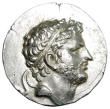
In 179 B.C.E. Philip V of Macedonia dies before he can extend his power in the Balkans, and his son Perseus (-212 to -166) becomes the last Antigonid king of Macedonia (until -168); since he had persuaded Philip to execute his pro-Roman brother Demetrius, Eumenes II of Pergamon lays charges against him in Rome, and the handwriting is on the wall?
In 179 B.C.E. Pergamon wins its war with Pontus (begun -183).

In 175 B.C.E. Seleucus IV Philopater is murdered by his minister Heliodorus, and his younger brother Antiochus IV Epiphanes ("god manifest") (-215 to -163) becomes king of Syria, soon instituting a policy of "syncretism" which forces all his subjects to abandon their beliefs and customs and become Hellenized, while becoming friendly to Rome; the Jews take it particularly soft, er, hard; Jewish high priest Onias III travels to Antioch to face the accusations of Simon ("listening intently") the Tobiad, overseer of the Jewish temple, only to find out about the change in rule; Onias III is outbid by brother Jason for the position of high priest, and Jason returns to Jerusalem to begin his Hellenization program - if you have a problem with the show, talk to me?
In 173 B.C.E. after Cato the Elder criticizes them, Greek Epicurean philosophers Alcaeus and Philiscus are banished from Rome.
In 172 B.C.E. the Third Macedonian War begins (ends -167) when Perseus of Macedonia declares war on Rome and defeats a Roman army.

In 171 B.C.E. while Demetrius is campaigning in the Punjab, Eucratides I (the Great) (d. -145) declares himself king of Bactria (until -145).
In 170 B.C.E. the Sixth Syrian War (ends -168) begins when Ptolemy VI's regents launch an invasion of Antiochus IV's realm in Syria. Arsaces III Phriapatius dies, and Arsaces IV, great-grandson of Arsaces I becomes king #4 of Parthia (until -168). Rome begins paving its streets and founding public bakeries about this time; the wealthy begin to hide their obscene luxury in suburban villas in Greek Campania.
In 170 B.C.E. the Hellenistic city of Antiochia ad Cragum (Antiochia Parva) (Antiochetta) in S Asia Minor on Mt. Cragus (Cragos) on the Mediterranean coast near modern-day Guney, Turkey is founded by Antiochus IV Epiphanes, becoming home to the largest Roman mosaic found in Turkey in modern times.
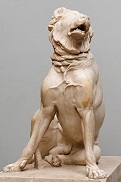
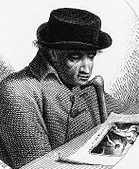

On June 22, 168 B.C.E. King Perseus of Macedonia is defeated by the Romans under consul Lucius Aemilius Paulus Macedonicus (-229 to -160) at the Battle of Pydna on the W side of the Gulf of Thessaloniki, and the city of Thessalonica on the E side surrenders; the battle that proves that the Roman legion is superior to the Macedonian phalanx?; Macedonia falls into Roman hands; the Molossian city of Epirus is sacked; the bronze Molossian Guard Dog Statue is brought to Rome, and praised by Pliny until it is lost in 69 C.E., but a 2nd cent. C.E. stone copy survives, becoming known as the Jennings (Duncombe) (Alcibiades) Dog after it is discovered by Henry Constantine Jennings (1731-1819) in the workshop of Italian sculptor Bartolomeo Cavaceppi (1716-99) in 1753; the Roman Senate's settlement incl. dividing the kingdom into four republics that are heavily restricted from trade or intercourse with each other and with Greece, the deportation of all royal officials, and permanent house arrest of Perseus, breaking the back of the Macedonian Antigonid Dynasty and giving Rome permanent ascendancy in the Hellenic world; Paulus is awarded the title Macedonicus; Paulus' son Scipio the Younger fights by his side at Pydna; a purge of allegedly anti-Roman citizens causes 300K to be deported.
In 167 B.C.E. the Third Macedonian War (begun -172) ends with Alexander the Great rolling over in his tomb; the Macedonian (Antigonid) kingdom ends, and Macedonia becomes four autonomous districts, each with its own capital city (Amphipolis, Thessalonica, Pella, Pelagonia), paying a moderate yearly tribute; Perseus and his two sons are hauled into Rome as trophies; Roman world domination begins; Macedonians are sold as slaves in Rome, bringing $50-$75 for a male "Alexander" and up to $1K for a female "Olympias".
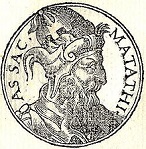

Here they come to save the day? In 167 B.C.E. Antiochus IV Epiphanes with the help of his Jewish elites despoils the Jewish Temple and its treasury, sets up a military garrison (the Akra) near the temple, abolishes the observance of traditional Jewish law, decrees that Greek altars be set up in Jewish towns, and establishes a new order of worship called the Cult of the Lord of Heaven, which sacrifies a pig to Zeus on the altar of the Jewish Temple and corrupts the youth with naked uncircumcized gymnastics; just when things look darkest, a hero arose to help them fight for their free-ee-ee-dom to use the good ole Jewish izmel on their boys' dongs, a Jewish Cohen (priest) of Modein (Modiin) (18 mi. NW of Jerusalem), of the macabre line of Hasmon named Mattathias (Mattathiah) Maccabeus (ben Johanan) (the Hasmonean) (d. -165) and his five sons (eldest to youngest) Johanan Maccabeus, Simon Maccabeus (d. -134), Judas Maccabeus (the Hammer) (d. -160), Eleazar Maccabeus (d. -162), and Jonathan Maccabeus (Apphus, Dissembler, or Diplomat) (d. -143), collectively known as the Maccabees (Aramaic "maqqaba" = hammer) (AKA Hasmoneans) balk at Syrian syncretism, kill a Hellenistic Jew who is about to sacrifice to an idol in Mattathias' place, and flee to the mountains, beginning a guerrilla war for the liberation of Judea from the Seleucids and the restoration of the true inch-shorter-and-proud-of-it Jewish religion (ends -163); Judas Maccabeus is designated by his dying father as the leader of the guerrilla forces; the Oniad priest Jason seeks asylum in the Jewish community at Sparta following his failed coup; the Maccabees send ambassadors to Rome seeking an alliance against the Syrians, relying on their contacts with Roman Jews.
In 167 B.C.E. the Romans kill 500 rebels in Aetolia, and deport 1K hostages from the Achaean League to Italy, incl. Greek historian Polybius (-203 to -118).
In 167 B.C.E. he Romans make the Greek sacred island of Delos in the Cyclades (birthplace of Artemis and Apollo, where no human is allowed to be born or die) a free port, weakening Rhodes.
In 166 B.C.E. Perseus, last Antigonid king of of Macedonia (b. -212) dies in captivity in Rome after learning Latin and becoming a notary public.
In 165 B.C.E. the Maccabees (Hasmoneans) under Jewish gen. Judas (Judah) Maccabeus defeat four larger Syrian armies in a row with only a few thousand followers, and in Dec. recapture Jerusalem from the Syrians, remove the "horrible abomination" (a dangly uncircumcized statue of Zeus), purify the Temple with a red heifer, and on Dec. 25 rededicate it to Big J (Jehovah) with festivities lasting eight days, giving birth to the 8-day Jewish holiday of Hannukah (Hanukkah) (Chanukah) (John 10:22) (AKA Festival of Lights) after they could only find one cruse of pure olive oil to bless for the ritual, but Big J gives them a miracle and it burns for eight days; the Maccabees rule Palestine until -37.
In 164 B.C.E. the 154th Olympiad sees Leonidas of Rhodes (b. -188) win all three foot race events (incl. the 200m stadion, the 400m diaulos, and the hoplitodromos race in armor, the first ever) in this and the next three straight Olympics, winning 22 gold medals, er, olive wreaths, nine in relays and 12 individual medals, a record which isn't surpassed until Aug. 11, 2016 by Am. swimmer Michael Fred Phelps II (1985-); "the most famous runner" (Pausanias); "He had the speed of a god" (statue of him in Rhodes) - pass the olive oil?

In 164 B.C.E. a Syrian army of 100K advances to Jerusalem and is repulsed by the Jewish army under Gen. Judas Maccabeus at the Battle of Beth-Zur, causing Antiochus IV Epiphanes to recognize the religious liberty of the Jews; Seleucid forces continue to hold the Acra fortress inside Jerusalem facing the 34-acre Temple Mount; meanwhile Antiochus IV dies during a campaign against the Parthians, and is succeeded by his young nephew Antiochus V Eupator ("of a good father") (-172 to -161), with Lysias as regent.
In 163 B.C.E. the Roman Senate restores Ptolemy VI and gives the W province of Cyrenaica (Cyrene and Cyprus, the latter known for its licentious worship of Aphrodite) to Ptolemy VII, splitting Egyptian rule; Ptolemy VII only secures Cyrene.
In 163 B.C.E. satrap of Media (appointed by Antiochus IV in -175) Timarchos (Timarchus), usurps the Seleucid throne from young tyke Antiochus V Eupator and his regent gen. Lysias (d. -161) (until -160).
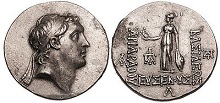
In 163 B.C.E. Ariarates IV dies, and his Roman-educated (Athens-educated?) son Ariarathes V Eusebes Philopator (d. -130) (d. -126?) becomes king of Cappadocia, with capital at Mazaca (modern-day Kayseri); meanwhile Ariarates IV's wife Antiochis's two false sons Orophernes Nicephorus and Ariarathes, whom she put over on him during her childless years are sent into exile.
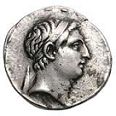

In 162 B.C.E. Demetrius I Soter (Gr. "savior") (-185 to -150), son of Seleucus IV escapes from detention in Rome to Tripolis with help from historian Polybius and assumes the throne of Syria, defeating usurper Timarchus, who then sends gen. John Bacchides to Jerusalem and installs Alcimus (Gr. "valiant") AKA Elyaqum (Heb. "El will rise") as high priest (until -159), then returns to Syria, leaving behind a protective force; meanwhile the Battle of Beth-Zechariah sees 50K Seleucids under Gen. Lysias defeat 20K Jews and kill Eleazer Maccabeus under a war elephant, after which they siege Jerusalem, but are called back to Antioch, leaving the Jews to worship as they please.
In 162 B.C.E. Greek geographer Pausanias of Lydia completes vol. 1 of his 10-vol. Description of Greece, which features his list of the Seven Wonders of the Ancient World, incl. the Great Pyramid of Giza, the Hanging Gardens of Babylon, Colossus of Rhodes, the Lighthouse of Alexandria, the Mausoleum at Halicarnassus, the Temple of Artemis at Ephesus, and the Statue of Zeus at Olympia.
In 161 B.C.E. Demetrius I Soter defeats his cousin Antiochus V Eupator (b. -172) and gen. Lysias at the Phoenician port of Tripolis (Tripoli) (in modern-day Lebanon), and has them executed, obtaining recognition from Rome; meanwhile Judas Maccabeus grows stronger, and Alcimus petitions for help, causing Demetrius I Soter to send Gen. Nicanor, who loses to Judas at the Battle of Kapharsalama, after which Judas returns to Jerusalem, vents his wrath on the priests, and threatens to destroy the Jewish Temple, after which Judas routs Nicanor's army at the Battle of Beth Horon, and Nicator is KIA.
In 161 B.C.E. Greek philosophers are banished from Rome again (first time -173).
In 160 B.C.E. the Syrians under gen. Bacchides defeat the Jewish rebels under Gen. Judas Maccabeus at the Battle of Laisa (Elasa) (Berea) in Beroea (Berea) (ancient Beeroth) (modern-day Bire or Bireh) (10 mi. N of Jerusalem); Judas is KIA, causing Jonathan to become leader of the Maccabees, rallying the troops; unable to defeat him, Bacchides returns to Syria after garrisoning some Jewish towns; unfortunately for the Jews, Judas had sent an embassy to Rome, and it returns after he dies with a treaty which basically gives Rome the right to rule Judea; meanwhile Jewish priest Onias IV goes to Egypt, reads from Isaiah 19:19, and convinces them to erect a Jewish temple in Leontopolis (On) - the original McDonald's franchise?
In 158 B.C.E. Syrian gen. Bacchides returns with his army to Palestine, but the Maccabean party has renewed strength and negotiates a treaty; Alcimus the Hellenizing high priest dies of "paralysis"; the priesthood is vacant for seven years.
In 158 B.C.E. Eumenes II dies, and his 62-y.-o. younger brother (Attalus I's 2nd son) Attalus (Attalos) II (-220 to -138) becomes king of Pergamon (until -138).
In 158 B.C.E. After Ariarathes V of Cappadocia refuses to obey the Romans and marry his sister, Demetrius I Soter invades and kicks his butt, causing him to flee to Rome, and puts his man Orophernes Nicephorus on the Cappadocian throne; the Romans then intervene and restore Ariarathes V as joint-ruler, but Orophernes is soon expelled.
In 157 B.C.E. the Syrians recognize Jonathan as the leader of the Jews, and he goes on to unite the Jewish pop.
In 156 B.C.E. Prusias II of Bithynia invades the territories of Pergamon (until -154).
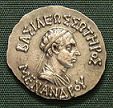
In 155 B.C.E. Menander I "the Savior" (Milinda) (d. -130) becomes king of Bactria (until -130), extending his powe from the Kabul River Valley to the Ravi River, Swat River Valley, and Arachosia (modern-day Helmand Province, Afghanistan), patronizing Buddhism.
In 155 B.C.E. Greek philosophers Diogenes the Stoic (-230 to -150), his student Carneades the Academic (Skeptic) (-213 to -129), and Critolaus the Peripatetic of Phaselis (-200 to -118) come to Rome as envoys from Athens, becoming popular esp. with the youth, raising doubts about the certainty of justice, pissing-off Cato the Elder, who persuades the Roman Senate to ban all Greek philosophers with the soundbyte that if they get infected with Greek lit. they will lose their empire - should have said Jewish lit.?
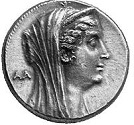
In 154 B.C.E. 10-y.-o. Cleopatra Thea (Gr. "goddess") Euergetis (Gr. "benefactress") (-164 to -121) becomes engaged to her uncle Ptolemy VIII, king of Cyrene, but he ends up marrying her mother (his sister) Cleopatra II.
In 154 B.C.E. after Pergamon gets help from Ariarathes V of Cappadocia and his son Demetrius, Prusias II of Bythynia is defeated, and withdraws after agreeing to heavy reparations, then sends his popular son Nicomedes II to Rome to try to get them reduced.

In 153 B.C.E. Alexander I Balas (Gr. "lord") (d. -145), pretender son of Antiochus IV Epiphanes marries Cleopatra Thea, then gains Jonathan's support against his rival Demetrius I Soter by offering him the purple and a diadem, making him high priest, and the Jews retain their allegiance to him in the face of counteroffers by Demetrius I; Ptolemy VI Philometer at first supports Alexander against Demetrius I (until -150).
In 152 B.C.E. Jonathan becomes the Jewish high priest despite not belonging to the proper Zadokite family, and establishes friendly relations with Rome.
In 152 B.C.E. Demetrius I Soter sends his son Demetrius II Nicator to Cnidus as protection against Alexander I Balas.
In 151 B.C.E. the Achaean hostages are returned.
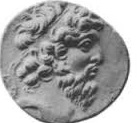
In 150 B.C.E. Seleucid emperor (since -161) Demetrius I Soter of Syria (b. -185) is defeated and KIA by pretender Alexander Balas, who becomes king of Syria (until -146); Ptolemy VI Philometer then switches to Demetrius I's son Demetrius II Nicator (-160 to -125), agreeing to take his daughter Cleopatra Thea away from Alexander and give her to him. Mithridates V Euergetes (d. -120), son of Pharnaces I and nephew of Mithridates IV becomes Greek king #7 of Pontus (until -120).

About 150 B.C.E. (-150 to -100) the Antikythera Mechanism is created, discovered in 1901 C.E., becoming the world's first known computer, computing lunar-solar motions with gears, based on the off-center circle Hipparchos Model of the Moon's elliptical orbit around the Sun; the first astrolabe?; a Roman ship carrying it sinks off Antikythera Island in S Greece about -65, and is recovered in 1900 C.E.; the eclipse prediction is based on Babylonian rather than Greek math, and the astronomical calculations begin in -205; no instruments of comparable complexity are made for 1K years until Baghdad in 900 C.E. after the Romans and Greeks fail to pass on their technology, and the Muslim device is much simpler; designed by Hipparchos of Rhodes?

About 150 B.C.E. the strangely Christ-like Laocoon (Laocoön) Group is sculpted by Hagesandros (Agesander), Athenedoros (Athenodorus) and Polydoros (Polydorus) of Rhodes, depicting the brother of Anchises (father of Aeneas), a priest of Poseidon being strangled by sea serpents along with his two young sons Antiphantes and Thymbraeus at the orders of Minerva after he tries to warn the Trojans that the Trojan Horse is a trick, uttering the immortal soundbyte: "Timeo Danaos et dona ferentes" (Beware of Greeks bearing gifts) (I fear Greeks even when they bear gifts); discovered in Rome in 1506 C.E., its anatomical accuracy and depiction of agony wows hard-to-please German critic Gotthold Lessing.
In 149 B.C.E. Achaean League head Callicrates dies.
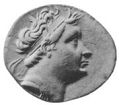
In 149 B.C.E. after learning of a plot to murder him, Nicomedes II Epiphanes (d. -127), supported by Attalus II of Pergamum revolts against his father Prusias II and executes him, and becomes king #6 of Bithynia (until -127), going on to become a steady ally of Rome, even against Pergamum.
In 149 B.C.E. the Third Punic War (ends -146) begins after the vicious Roman senators become jealous of the fact that Carthage has regained some kind of prosperty and trade, and encourage Numidia to encroach upon their territory until they are forced to fight, then, declaring that they have broken the treaty, pounce; first Rome demands hostages, the surrender of arms, and then the abandonment of Carthage, telling them to move to a spot at least 10 mi. from the sea (to kill their sea trade); Carthage resists, and Rome attacks, but narrowly avoids disaster as the Carthaginians, seeing the end is near, fight back in a grimly determined manner.

In 149 B.C.E. Andriscus (Andriskos) (d. -148) ("Pseudo-Philip") ("False Philip"), a fuller from Adramyttium in Aeolis, W Anatolia who claims to be the son of Perseus of Macedon leads the Fourth Macedonian War against Rome (ends -148); after failing to find a following in Macedonia, he asks for help from Demetrius Soter of Syria, who hands him over the Romans, but he escapes and reappears in Macedonia with an army of Thracians and defeats praetor Publius Juventius, assuming the title of king Philip VI of Macedonia (until -148), becmoing the last king of Macedon. In 148 B.C.E. after conquering Thessaly and allying with Carthage, Macedonian pretender Andriscus is defeated 2x by the Romans under praetor gen. Quintus Caecilius Metellus (-210 to -115), causing him to flee to Thrace, whose prince gives him up to the Romans, ending the Fourth Macedonian War (begun -149); Macedonia is made a Roman province, and Metellus is given the agnomen Macedonicus.
In 147 B.C.E. Demetrius II Nicator, son of Demetrius I Soter revolts from Alexander I Balas, and defeats his gen. Apollonius.
In 147 B.C.E. Mithridates I the Great of Parthia conquers Babylonia and Media from the Seleucids.
In 147 B.C.E. Demetrius II Nicator, son of Demetrius I Soter revolts from Alexander I Balas, and defeats his gen. Apollonius.
In 146 B.C.E. the Romans under Quintus Caecilius Metellus Macedonicus defeat the Arcadians at the Battle of Chaeronea; meanwhile the Achaean League under strategos Critolaos of Megalopolis attacks Sparta, but the Romans under consul Lucius Mummius Achaicus and praetor Quintus Caecilius Metellus Macedonicus crush them at the Battle of Scarpheia, where Critolaos is KIA and replaced by Diaeus, followed by the followed by the Battle of Corinth (to avenge an insult made to the Roman embassy there), then destroy Corinth, slaughter the men, and sell the women and children into slavery, then dissolve the Achaean League, substituting oligarchies for democracies, and annex Greece, placing it under the supervision of the Roman gov. of Macedon Macedonicus, who is permanently installed in Thessalonica; once-proud Greece becomes another tribute-paying Roman province, full of people every Equestrian would like to own?; Macedonia's four districts are formed into a koinon by Rome, with capital at Beroea at the foot of Mt. Bermios (seat of the imperial cult); from now on Greeks work as slaves and peddle their cerebral culture to their practical-minded Roman masters, while living in the past in a state of denial? - don't worry, Romans, you'll know what it feels like one day?
In 146 B.C.E. Ptolemy VI Philometer captures Antioch in support of Demetrius II Nicator, and his Alexander I Balas' wife Cleopatra Thea switches dicks in the middle of a you know what and marries Demetrius II.
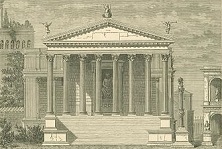
In 146 B.C.E. to celebrate his triumph for his V at the Battle of Scarpheia, Quintus Caecilius Metellus Macedonicus builds the Hexastyle peripteral Temple of Jupiter Stator (the Stayer) in the Roman Forum, along with the Temple of Juno Regina in the S half of the Campus Martius near the Circus Flaminius (built -179), and the Porticus Metelli (replaced in -26 by Augustus with the Porticus Octaviae), designed by Greek architect Hermodorus of Salamis from Salamis, Cyprus, becoming the first Roman temple built entirely of marble; too bad, the statues of Jupiter and Hera are set up in each other's temples by mistake; a legend attributes the design to Spartan architect Saurus and Batrachus because of depictions of a lizard (sauros) and frog (batrachos), but no inscriptions.

About 146 B.C.E. Megalopolis, Arcadia-born Greek historian Polybius (-203 to -118), who witnessed the sack of Carthage this year and was awed with Roman might begins writing a 40-vol. History of Rome, covering the Roman Repub. from -264 to -146, its wars with Carthage starting in -220, and its rise to top dog status in the Mediterranean world, which becomes instrumental in convincing Greeks to give into the inevitable and change their ways; he champions the idea of factual integrity in historical writing, and proposes the separation of powers in govt., later adopted by Montesquieu and the Am. Founding Fathers; he claims that the pesky Celts are backwards and don't know any Science - playing the Planet of the Apes chimps to the Roman gorillas?
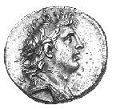
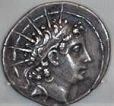
In 144 B.C.E. Alexander I Balas' general Diodotus Tryphon (d. -138) deposes Demetrius II (who is saved by soldiers from Judah, and flees to Seleucia), and rules in Antioch on behalf of Alexander's 2-y.-o. son Antiochus VI Dionysus (-148 to -141) (until -140).
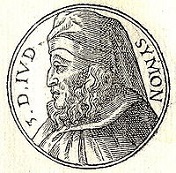
In 142 B.C.E. Jonathan Maccabeus is succeeded as gov. of Jerusalem and high priest by his brother Simon Maccabeus (Thassi) ("the Boss") (d. -135), who expels the Seleucids from Jerusalem and declares Judea an independent nation for the first time since the 8th cent. B.C.E.; the Hasmonean Dynasty begins in Judea (ends -63); Demetrius II affirms Jewish independence and makes an alliance with Simon, freeing Jews from Seleucid taxation; all Seleucid are expelled from the citadel at Jerusalem; a Jewish embassy under Numenius goes to Rome, causing Roman consul Lucius Caecilius Metullus to address letters to a number of countries reaffirming a Roman protective alliance with the Judean Jews (1 Macc. 15:15-24).
In 141 B.C.E. taking advantage of the confusion, Mithridates I the Great of Parthia conquers Media and Babylonia; the Parthians, originally from E Iran now own Mesopotamia, reducing the Seleucid kingdom to Syria.
In summer 140 B.C.E Diodotus Tryphon kills 7-y.-o. Antiochus VI and proclaims himself king of Syria, becoming the first to use the name Tryphon; Rome doesn't buy it and refuses to recognize the bum.
In 140 B.C.E. Aretas I dies, and Rabbel I (d. -103) becomes king of the Nabataeans (until -103).

About 140 B.C.E. Greek #1 astronomer Hipparchus of Nicaea (-190 to -120) discovers trigonometry along with the precession of the equinoxes by observing the bright star Spica in Virgo.
In 140 B.C.E. Greek Stoic philosopher Crates of Mallus, head of the library of Pergamum creates a Globe of the Earth.
About 140 B.C.E. Greek epigrammist Antipater of Sidon composes the poem The Seven Wonders of the Ancient World; "I have set my eyes on the wall of lofty Babylon on which is a road for chariots, and the statue of Zeus by the Alpheus, and the hanging gardens, and the Colossus of the Sun, and the huge labor of the high pyramids, and the vast tomb of Mausolus; but when I saw the house of Artemis that mounted to the clouds, those other marvels lost their brilliancy, and I said, 'Lo, apart from Olympus, the Sun never looked on anything so grand'."
In 139 B.C.E. Mithridates I the Great of Parthia conquers Susa and Elam from the Seleucids.

In July-Aug. 138 B.C.E. Demetrius II of Syria is captured by Mithridates I of Parthia after adding Elam, Persia, and parts of Bactria to his kingdom and making Ctesiphon-Seleucia his capital; after Demetrius II's younger brother Antiochus VII Euergetes Eusebes Soter Sidetes ("benefactor pious savior") (d. -129) sieges him in Dor, Diodotus Tryphon escapes, then commits suicide in Apamea, and Antiochus VII becomes king of downsizing Syria (until -129), turning it around and beginning to restore its power by scoring several Vs against Parthia.
In 138 B.C.E. Attalus II dies, and his nephew (Eumenes II's son) Attalus (Attalos) III Philometor ("mother loving") Euergetes (-170 to -133) becomes king of Pergamon; he narrows the entrance to the harbor of Ephesus, causing it to silt up?
Early in 137 B.C.E. Antiochus VII's cmdr. Cendebeus is defeated by Simon Maccabeus.

In 132 B.C.E. Mithradates I the Great dies, and his son Phraates II (d. -126) becomes king #7 of Parthia (until -126).
In 121 B.C.E. Antiochus VIII Grypus poisons his co-regent mother Cleopatra Thea.

In 121 B.C.E. ultra-ugly Mithridates II the Great (d. -91) becomes king #8 of the Parthian Empire (until -91), becoming the first Parthian ruler to style himself king of kings, claiming descent from the Achaeminids, calling himself Epiphanes ("God manifest") and Philhellen ("friend of the Greeks") on his coinage; under his rule the Parthian Empire reaches its greatest extent.
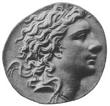
In 120 B.C.E. Mithridates V Euergetes (d. -150) dies, and his son Mithridates VI the Great Eupator Dionysius (-135 to -63) becomes king of Pontus (until -63), with his mother Gespepyris as regent and real ruler (until -115).
In 120 B.C.E. milestones are first used in the Roman Empire.


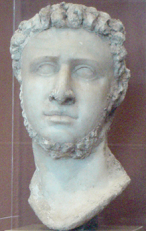
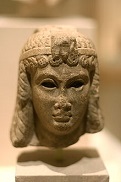
In 116 B.C.E. Antiochus VIII Grypus is deposed and exiled by his maternal half-brother Antiochus IX Eusebes ("the Pious") Cyzicenus ("from Cyzicus"), son of Cleopatra Theo and Antiochus VII, who returns from exile in Cyzicus. Ptolemy VIII Physcon dies, leaving his power to Cleopatra III and any of his sons she might prefer, leaving Cyrene separately to his son Apion, and Cyprus to his son Ptolemy X Alexander I (-107 to -88), who vies for the throne with his other son Ptolemy IX Soter II Lathyrus (Lat. "chick pea") (d. -81); Cleopatra III expels Ptolemy X, and Ptolemy IX becomes king #9 of Egypt's 32nd (Ptolemaic) Dynasty as her co-regent; he marries his sister Cleopatra IV (-138 to -112), but mommy disapproves and replaces her next year with younger sister Cleopatra Selene I (-135 to -69) - kissy and scratchy, I like that? Cappadocian nobleman Gordius murders Ariarathes VI of Cappadocia at the orders of Mithridates VI of Pontus, after which his sister (Ariarathes VI's widow) Laodice rules until Nicomedes III of Bithynia seizes it and marries her, after which Mithradates expels him and restores Ariarathes VI's son Ariarathes VII Philometor ("mother-loving") (d. -101) to the throne of Cappadocia (until -101), with Laodice as regent.
In 115 B.C.E. Mithridates V of Pontus deposes and imprisons his mother Gespaepyris, and kills off his brothers and marries his sister Laodice, making him a player in the struggle for power in Anatolia (Asia Minor) and the Black Sea, subjugating Colchis then taking on the Scythians under king Palacus, gaining the allegiance of Tauric Chersonesus and the Bosporan Kingdom in the Crimea in return for protection.
In 111 B.C.E. Antiochus VIII returns from exile, and divides the kingdom with Antiochus IX.
In 110 B.C.E. after claiming that he tried to kill her, Cleopatra III deposes her son Ptolemy IX Lathyrus and replaces him with Ptolemy X Alexander I, but grows tired of him and reverses the choice next year, then reverses the choice again in -107.
In 105 B.C.E. Tripolis in Phoenicia is granted autonomy (until -64).

In 104 B.C.E. John Hyrcanus I dies after switching from the Pharisees to the Sadduccees, and is succeeded as Jewish high priest by his son Judah Aristobulus I (d. -103), becoming the first to take the title of king of the Jews who is not a descendant of David.
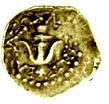
In 103 B.C.E. Aristobulus I dies, and his brother Alexander Jannaeus (-126 to -76) succeeds him as king of Judea, becoming the first to rule as high priest (until -78) as well as king; he offends the Pharisees by being pro-Hellene - and the Pharisees offend Jesus Christ by being pro-Roman?

In 103 B.C.E. Rabbel I dies, and Aretas II (d. -96) becomes king of the Nabataeans (d. -96).
In 101 B.C.E. Ptolemy X Alexander I murders his mother Cleopatra III and rules Egypt alone (until -88).
In 101 B.C.E. 1fter Ariarathes VII gets pissed-off at his father's assassin Gordius, the latter's ally Mithridates VI of Pontus has him assassinated and replaced as king of Cappadocia by his 8-y.-o. son Ariarathes IX Eusebes Philopator (-117 to -89), with guess-who Gordius as regent; meanwhile the nobles of Cappadocia strike back and overthrow him, replacing him with Ariarathes VII's son Ariarathes VIII Epiphanes (until -96).
In 90 B.C.E. Socrates the Good (Chrestus), brother of Nicomedes IV of Bithynia allies with Mithridates VI the Great of Pontus and kicks his bro's butt, causing him to flee to Rome, after which the Romans intervene and restore him.


In 88 B.C.E. Demetrius III Eucerus is captured and killed by the Parthians, leaving Philip I as sole ruler of Syria, but Antiochus XII Dionysus (d. -84), a son of Antiochus VIII claims the throne of Syria and seizes Damascus; Mithradates II the Great of Parthia dies after defeating the Scythians along with Artavasdes, king of Armenia Major and stabilizing the kingdom's E boundaries; too bad, Tigranes II the Great of Armenia sees his chance, invading Parthia and devastating Nineveh (Ninus) and Arbela. After Rome puts him up to it, Nicomedes IV of Bithynia raids the territory of Mithridates VI the Great of Pontus, and gets his butt kicked, causing him to flee to Rome again, after which Mithridates VI signs a decree at Ephesus ordering all Romans in Asia put to death, causing 80K-100K to be massacred, launching the First Mithridatic War (ends -85); Pergamum joins the revolt against Rome, causing Marc Antony to later (-40) give its beloved library to rival Alexandria; Lucius Cornelius Sulla Felix (-138 to -78) becomes consul of Rome and is placed in command of the war against Mithridates VI; when Marius aces him out of the job with the help of Roman tribune Sulpicius Rufus, Sulla marches on and seizes Rome, kills Sulpicius and exiles Marius to Africa, beginning the "royal rule of Sulla"; he then marches on Greece after Athens rises against Roman rule, and Epicurean philosopher Aristion (Athenion?) (d. -86) is elected ruler of Athens (until -86).

In 88 B.C.E. the people of Alexandria expel Ptolemy IX Alexander I for having too close ties with the Jews, and restore his exiled brother Ptolemy IX Soter II Lathyrus (d. -81), who in Oct. defeats Ptolemy X Alexander and becomes the 10th king of Egypt's 32nd (Ptolemaic) Dynasty (until -80); Ptolemy IX then marries his daughter Cleopatra Berenice III (-120 to -80) to legitimize his rule, and in Dec. he defeats and kills Gen. Chaereas.
In 87 B.C.E. Roman gen. Lucius Cornelius Sulla forces Mithridates VI out of Greece and recovers most of it, sieging Athens and Piraeus in the fall (until Mar. 1, -86); Sulla supporter Quintus Lutatius Catulus commits suicide after being persecuted by Marius' supporters; Athinias becomes the 61st and last elected ruler of the republic of once great but doomed Athens, which is in anarchy.
In 84 B.C.E. Antiochus XII Dionysus is killed on an expedition against the Nabataeans under Aretas III, who conquer Damascus.
In 83 B.C.E. after an insurrection expels Philip I from Antioch, Tigranes II the Great of Armenia is invited to take the throne of Syria (until -69), conquering Phoenicia and Cilicia, ending the Seleucid Empire (begun -323); Tigranes II the ahem, Great now rules an empire stretching from the Caspian Sea to the Mediterranean Sea, bordered by the Kingdom of Pontus on the N and the Parthian Empire on the S, and takes the title of king of kings, never appearing in public without four kings attending him, and causing Cicero to utter the soundbyte: "He made the Republic of Rome tremble before the prowess of his arms"; his S border reaches to Ptolemais (Akko), and his NW border to the Pontic Alps in NE Asia Minor; he becomes the first Armenia ruler to mint coins, with Big KOK wearing an Armenian tiara with ear flaps, and Tyche (Fortuna) of Antioch on the reverse, with river god Orontes at her feet.
In 51 B.C.E. Greek #1 polymath Stoic pansophist philosopher-historian-astronomer-geographer-politician Posidonius "the Athlete" of Apameia (Apamea) (b. -135) dies, leaving the World Map of Posidonius after measuring the circumference of the Earth as 240K stadia (24K mi.).
About 50 B.C.E. Greek physician Asclepiades of Bithynia (-129 to 40) founds the Methodic School of Medicine, which claims that disease is based on the flow of atoms through pores in the body, advocating hygenic methods (bathing, dieting exercise), and dissing drugs.

In 389 C.E. the 292nd Olympiad is held; King Varasdates of Armenia wins in boxing, becoming the last Olympic champ until 1896 C.E. after Roman Catholic, er, Roman emperor (379-95) Flavius Theodosius (Gr. "God's gift") I (the Great) (346-95) bans the Olympic Games (founded in 776 B.C.E.) in 391, and orders the Temple of Zeus in Olympia, Greece closed; the Great Statue of Zeus (built in 456 B.C.E.) is moved to a palace in Constantinople, and is lost in a fire in 462 - no more dangly daylight shin-kicking fun around guilt-tripped filthy unwashed Christians?
In 462 C.E. the 40-ft.-tall Great Statue of Zeus (built in 456 B.C.E.), moved from Olympia to a palace in Constantinople by wealthy Greeks after the Olympics were abolished in 391 is destroyed by a fire.
In 1460 the Greek Parthenon (built in 438 B.C.E.) is turned from a Christian church (since 426 C.E.) into a Muslim mosque.
On Sept. 26, 1687 the Parthenon and Propylaea on the Acropolis in Athens are destroyed by a Venetian bombardment of the Turks; a small mosque is built in the Parthenon's cella.
On Sept. 3-4, 2016 Euripides' play Hecuba the Refugee is performed in the ancient theater on Delos Island, becoming the first play to be performed there in 2.1K years.